
The debt crisis in the euro area
First it was the global financial crisis. Then came the debt crisis in the euro area, unleashed by Greece. A series of strong explosions followed in the eurozone - first Ireland, then Portugal and now the attention is focused on Spain and Italy. All measures, applied so far, failed to solve the problem in its roots and markets' lack of confidence that the EU would control the crisis still exercises strong pressure on the debt stricken economies.
 Klaus Regling | © Council of the EU
Klaus Regling | © Council of the EUGreece Is Exiting the Bailout Programme but Not Quite
Somewhat unnoticed and without much fireworks on August 20th the euro area will finally close the crisis that started in 2009 and threatened the EU's most successful project with a breakup. On that date, Greece will exit its third rescue programme and, according to the European Commission, will ... Mario Centeno | © Council of the EU
Mario Centeno | © Council of the EUAn Italian Remake of the Series "The Economy or Democracy, Voter"
Do you remember the beginning of 2015, when Greece was just about to exit the recession after painful and tormentous reforms? At the time, the anti-establishment party SYRIZA won the elections on a promise to re-negotiate the Greek bailout programme and to deliver debt write-off. That year ... Mario Centeno | © Council of the EU
Mario Centeno | © Council of the EUA Lukewarm Welcome for Greece's Growth Strategy
By June 21st, the euro area must be ready with a plan for Greece's exit from the third and last bailout programme, which will officially happen in August. However, the most important elements of this plan are still missing. Those are the Greek government's growth strategy for the post-programme ...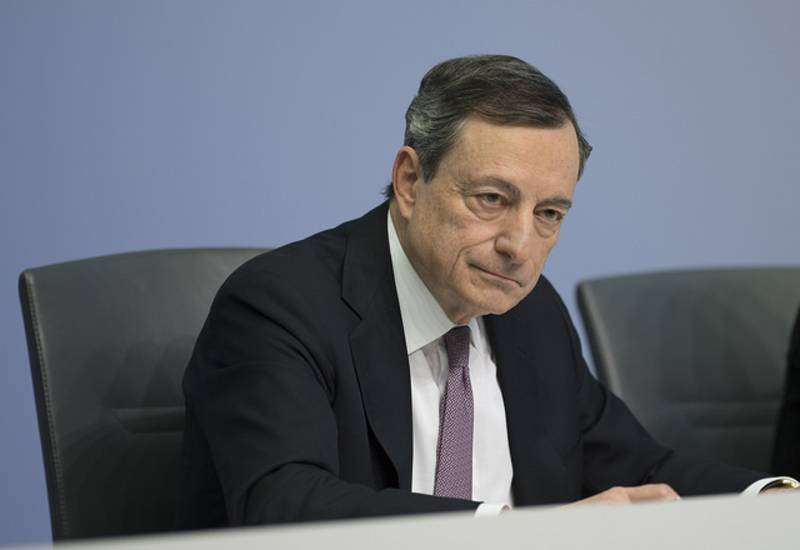 Mario Draghi | © ECB
Mario Draghi | © ECBDraghi Fears a Repetition of the Same Mistake that Led to the 2008 Crisis
The European Central Bank has made a new, though much smaller, step toward tightening of its monetary policy. The Governing Council decided unanimously on March 8th to remove its easing bias regarding the size and/or length of the net assets purchases programme (APP) - one of the non-standa ...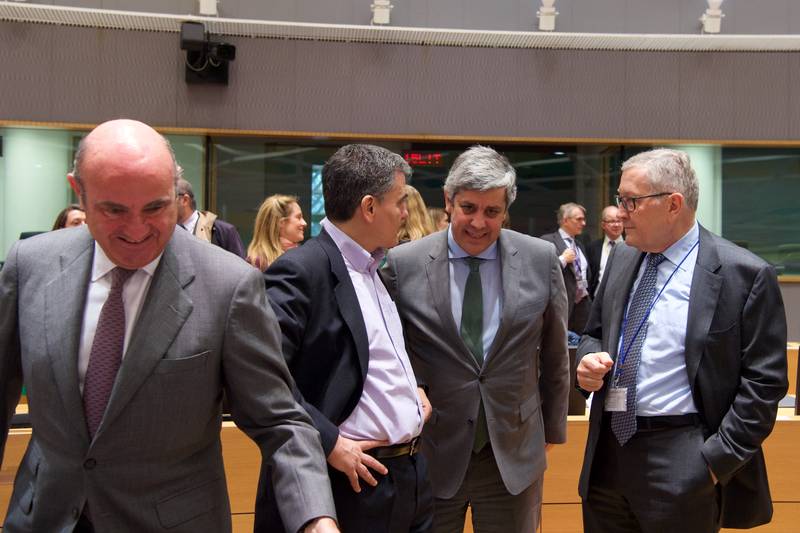 | © Council of the EU
| © Council of the EUGreece Is on Its Way to Reconcile Eurogroup and IMF
2018 marks a new beginning for the Eurogroup, Greece and relations with the International Monetary Fund. The first meeting of the euro area finance ministers started with a new chairman - Portugal's Finance Minister Mario Centeno. There are great expectations for a change of course under his lea ...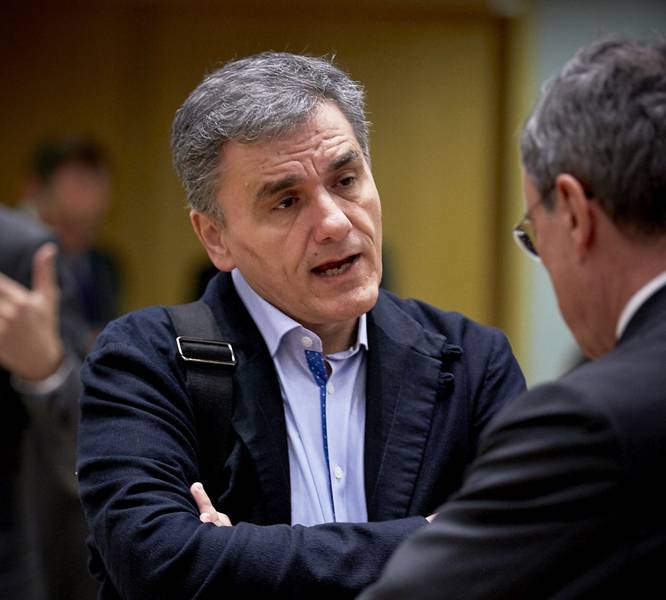 Euclid Tsakalotos | © Council of the EU
Euclid Tsakalotos | © Council of the EUHas Greece Grown Up?
The year-end is usually time for taking stock, and the change of guard in a key euro area institution is a reason for even deeper analyses and even for a book. Not to mention the deepest euro area crisis since the introduction of the single currency. During the farewell with Eurogroup chief Jero ...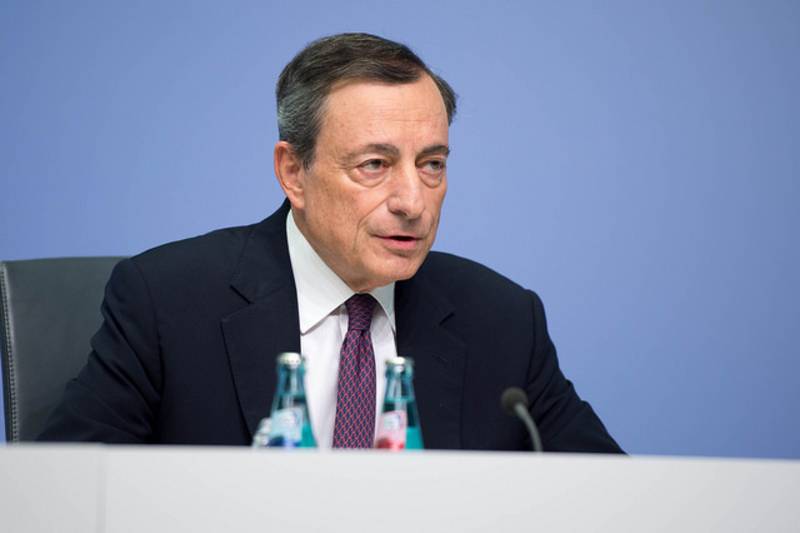 Mario Draghi | © ECB
Mario Draghi | © ECBMario Draghi Plans and Labour Market Laughs
The highest economic growth in a decade exceeding all expectations, as described by European Commission Vice President Valdis Dombrovskis (Latvia, EPP), responsible for the euro, during the presentation of the autumn package of the European Semester on 22 November. Unemployment has dropped down ...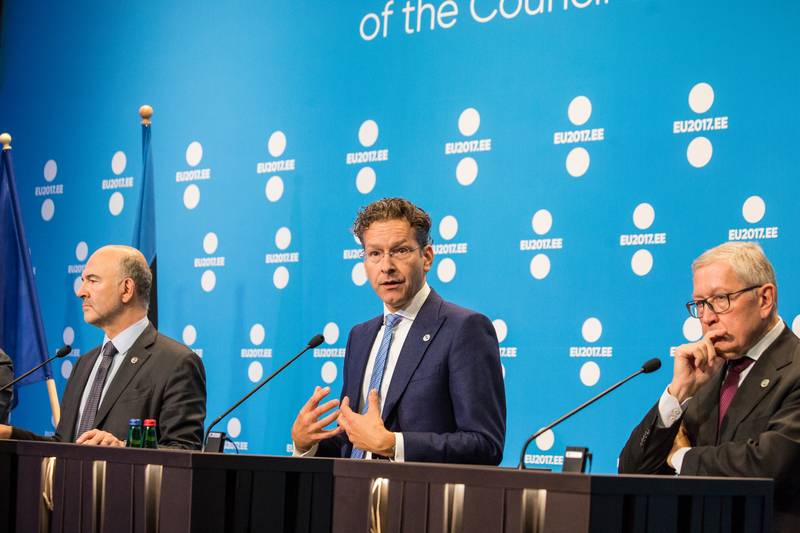 Pierre Moscovici, Jeroen Dijsselbloem, Klaus Regling | © Council of the EU
Pierre Moscovici, Jeroen Dijsselbloem, Klaus Regling | © Council of the EUEurozone and Greece Are Preparing for Bailout Exit
A very important piece of news has passed almost unnoticed last week among crucial for the EU issues, like the situation with the rule of law in Poland, the election in Germany and what ruling coalition will be formed at a time when the eurozone is ready to make a giant leap forward in its integ ...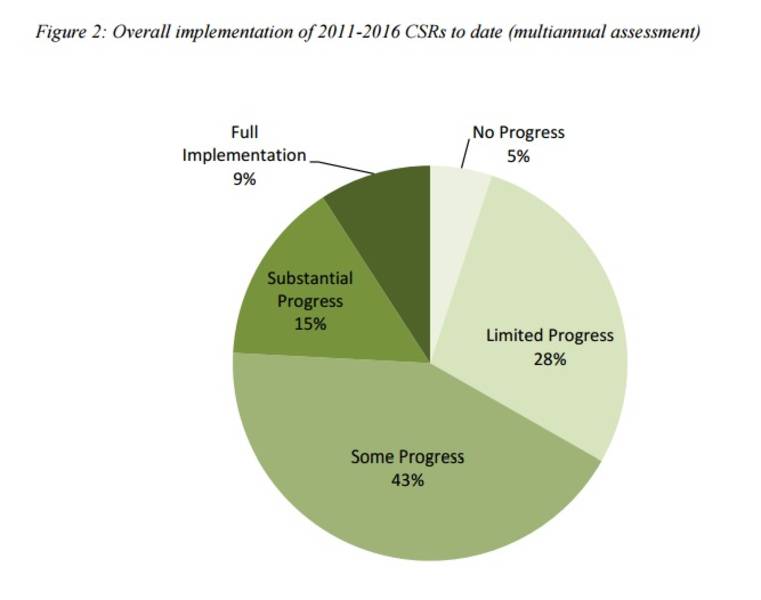 | © European Commission
| © European CommissionCommission Puts on Rose Coloured Glasses to the European Semester
The European Semester for 2017 ended officially at the end of June, when the leaders of member states adopted the Commission's country-specific recommendations. What are the lessons of this year's exercise? The semester was created at the peak of the financial and economic crisis to tr ...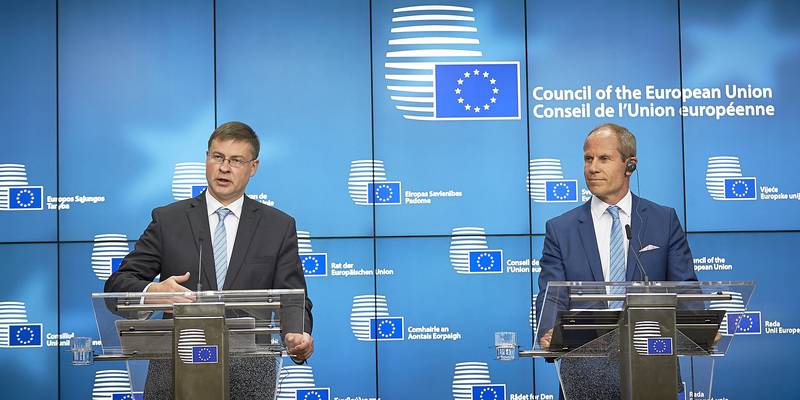 Valdis Dombrovskis, Toomas Toniste | © Council of the EU
Valdis Dombrovskis, Toomas Toniste | © Council of the EUEU Matures to the Need to Deal with Non-Performing Loans at the European Level
The European economy is recovering at a rapid pace, but its prospects still bear the legacy of the worst economic and financial crisis since the creation of the single European currency. One of the problems that the head of the European Central Bank Mario Draghi has consistently pointe ...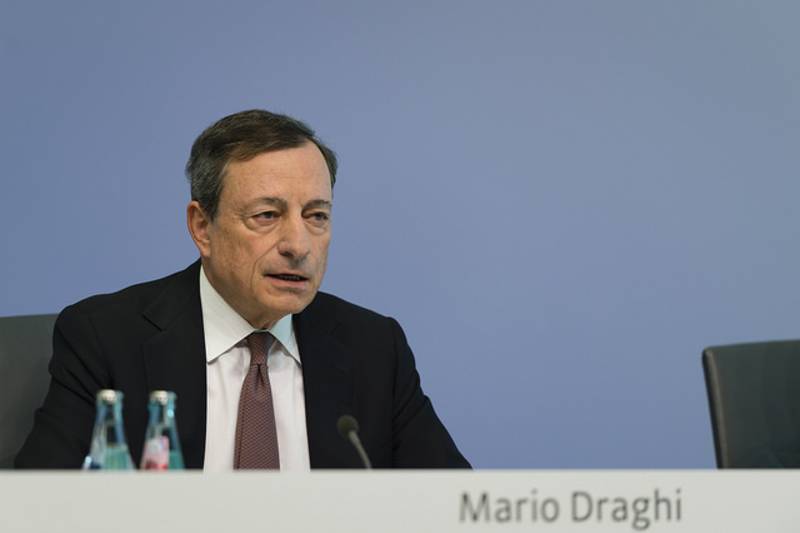 Mario Draghi | © ECB
Mario Draghi | © ECBFrom Sintra to September - ECB Prepares for a Possible Change in Monetary Policy
Over two-thirds of the questions at the press conference following the July meeting of the European Central Bank Governing Council last Thursday revolved around Governor Mario Draghi's speech in the Portuguese city of Sintra on June 27, when he once again hinted at the possib ...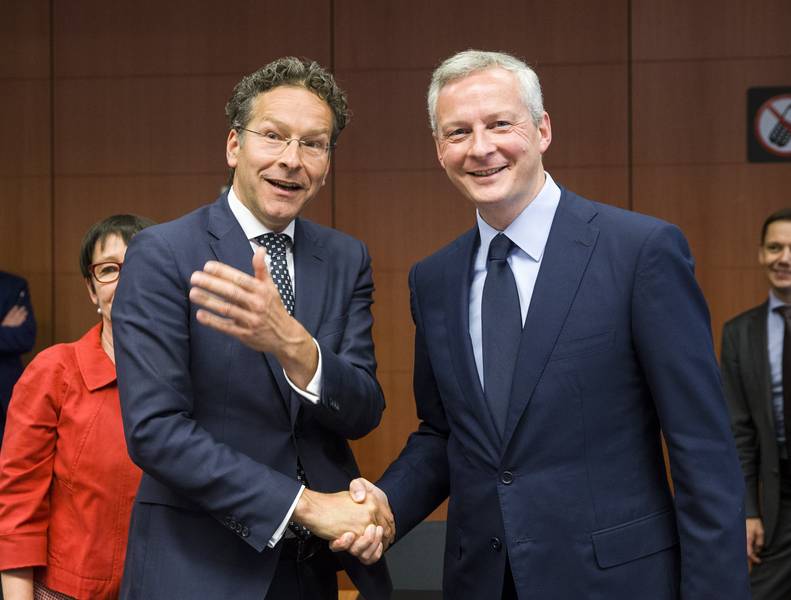 Jeroen Dijsselbloem, Bruno Le Maire | © Council of the EU
Jeroen Dijsselbloem, Bruno Le Maire | © Council of the EUGreece between IMF, German Elections, and the Future of the Euro Area
Disappointment flowed from the Eurogroup meeting on Monday of last week (May 22nd), when there was high expectation that an agreement with the International Monetary Fund would finally be reached on the issue of the Greek debt relief. After lengthy and painful negotiations, the meeting ended a ...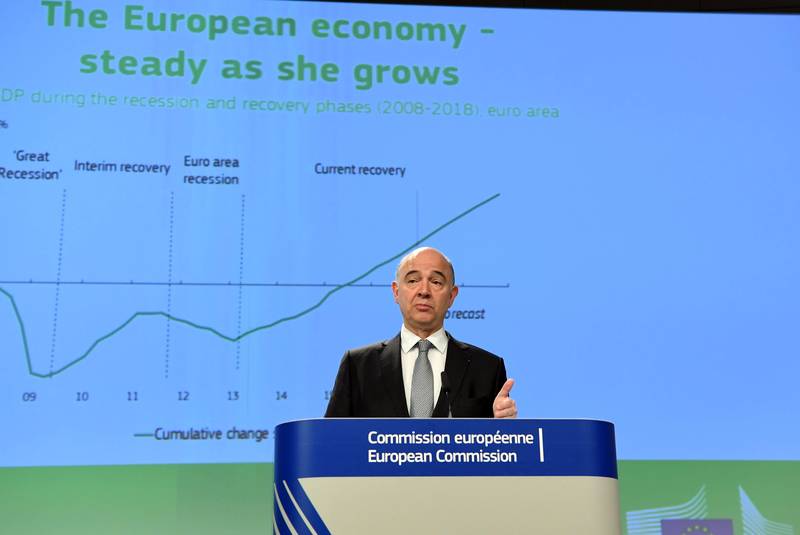 Pierre Moscovici | © European Commission
Pierre Moscovici | © European CommissionEU Spring Economic Forecast - Optimism in Times of Uncertainty
"Uncertainty" is the focus of the European Commission's spring economic forecast presented last week. The topic is presented entirely in scientific terms, apparently aiming to give a meaningful explanation as to why economic forecasts are increasingly diverging from reality. This ...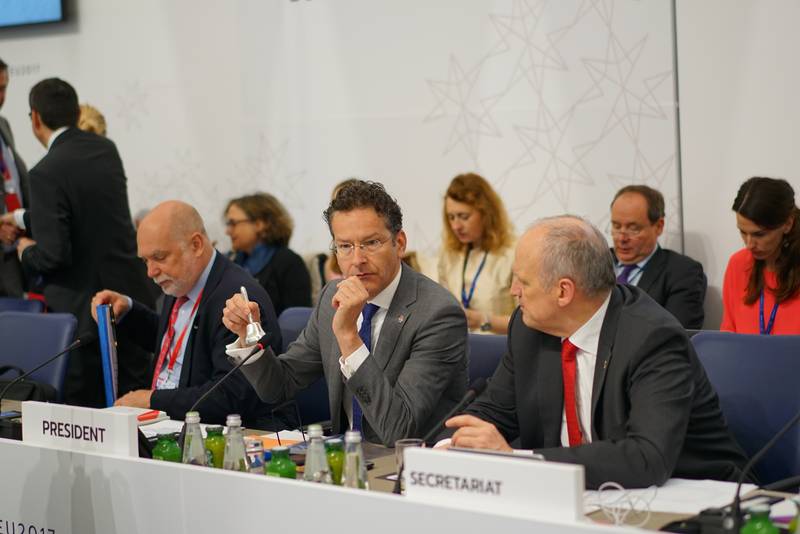 Jeroen Dijsselbloem | © Council of the EU
Jeroen Dijsselbloem | © Council of the EUCould Greece Really Turn the Page?
Will Greece manage to complete its bailout programme this time? This is the question that is hovering in the air after on April 7 the Eurogroup agreed in principle on the fiscal and reformist path of Greece after the programme expires next year. Since February, the Greek news from the meetings o ...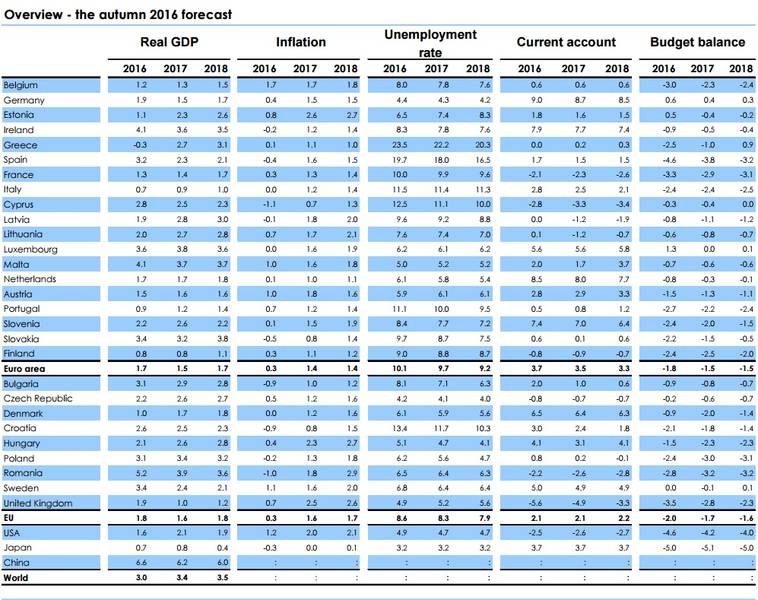 | © European Commission
| © European CommissionEuropean Semester Shows EU in the Eye of the Storm
The state of European economics today resembles a nice, thick, white snow cover – gross domestic product growth is good, unemployment is dropping, investments are beginning to grow. EU economy has grown by 1.9% in 2016 and that of the euro area – by 1.7%, shows the Eurostat data ...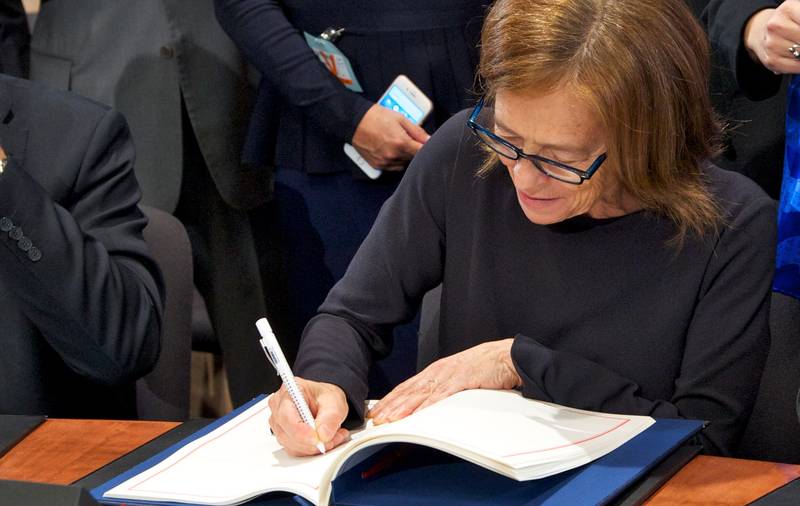 Margarida Marques | © Council of the EU
Margarida Marques | © Council of the EUMargarida Marques: Respecting the Rules Will Save the EU
The EU faces many challenges, but is capable of dealing with them if it follows the rules. Just like member states in the euro area need to adhere to budget criteria, the same approach needs to be used towards social issues and the rule of law. Only then will EU citizens see that the EU brings r ... Jeroen Dijsselbloem | © European Parliament
Jeroen Dijsselbloem | © European ParliamentThe Crisis Is Over. Prepare the Ground for the Next One
Do you remember what the first thing was that European leaders did following the outbreak of the financial crisis in the euro area in 2009? A discussion was started on new rules for tightening of the fiscal discipline, for not long after the start of the crisis an agreement was reached ...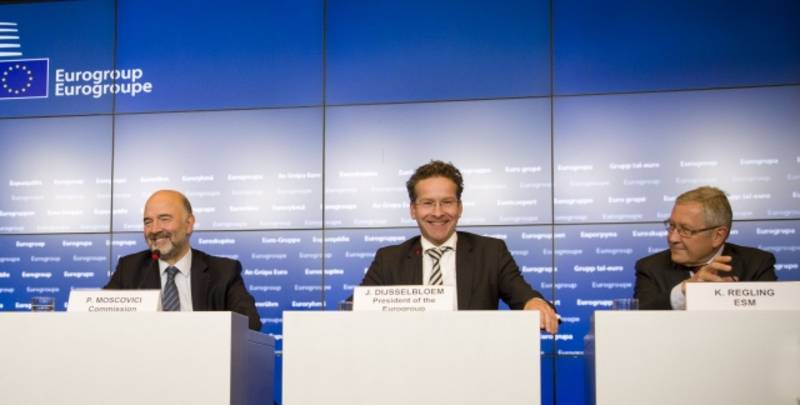 Moscovici, Dijsselbloem, Regling | © Council of the EU
Moscovici, Dijsselbloem, Regling | © Council of the EULong Greek Crisis Is Causing Severe Jet-lag to the Eurogroup
In just a single month a great change happened in the assessment of European institutions of the implementation of the Greek programme. This change does have a price and it is a mismatch in perceptions. Eurogroup chief Jeroen Dijsselbloem (The Netherlands, Socialists an Democrats) admitted Monda ...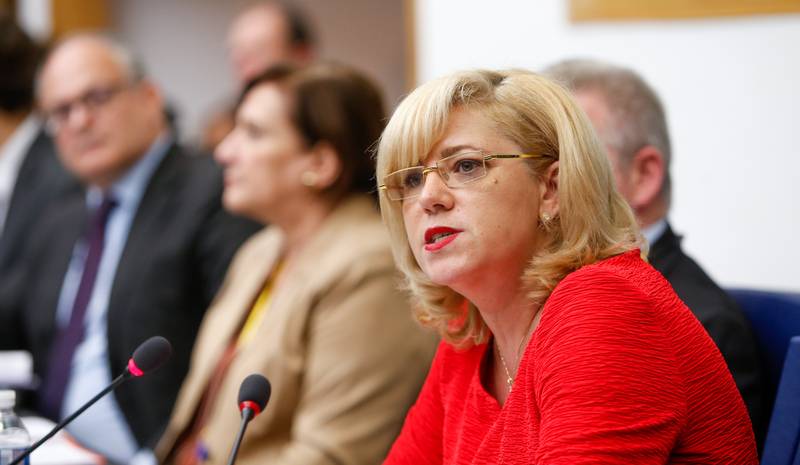 Corina Cretu | © European Parliament
Corina Cretu | © European ParliamentPopulists vs. Lawmakers in the Debate on Spain and Portugal
Instead of a debate on the implementation of the law, the discussion on the temporary suspension of European funds for Spain and Portugal over systemic violations of EU fiscal rules turned into a rebellion against the law. The two and a half hour dialogue between European Commissi ...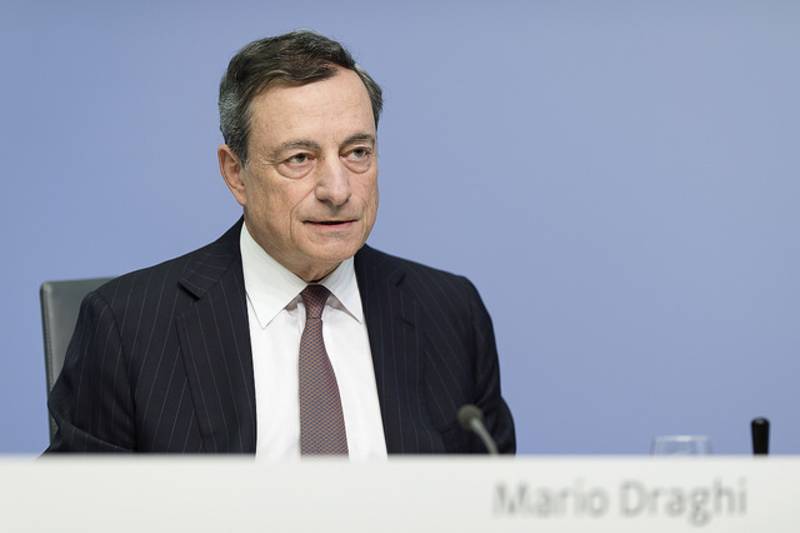 Mario Draghi | © ECB
Mario Draghi | © ECBIs ECB Getting Political Too?
The boss of the European Central Bank Mario Draghi gave life to several pieces of news after the end of the summer vacation. Following the regular meeting of the Governing Council of the ECB on September 8th Mr Draghi announced the end of financial fragmentation, repelled the attacks against t ... Pierre Moscovici | © Council of the EU
Pierre Moscovici | © Council of the EUCommission's Politicalness Is Already Causing Anxiety in the ECB
Something unusual happened on Friday noon, heralding a very tough discussion on the future of Europe, which is already difficult. This happened following the informal meeting of the Eurogroup in Bratislava, which was supposed to send out the usual messages towards Greece on the implementation of ...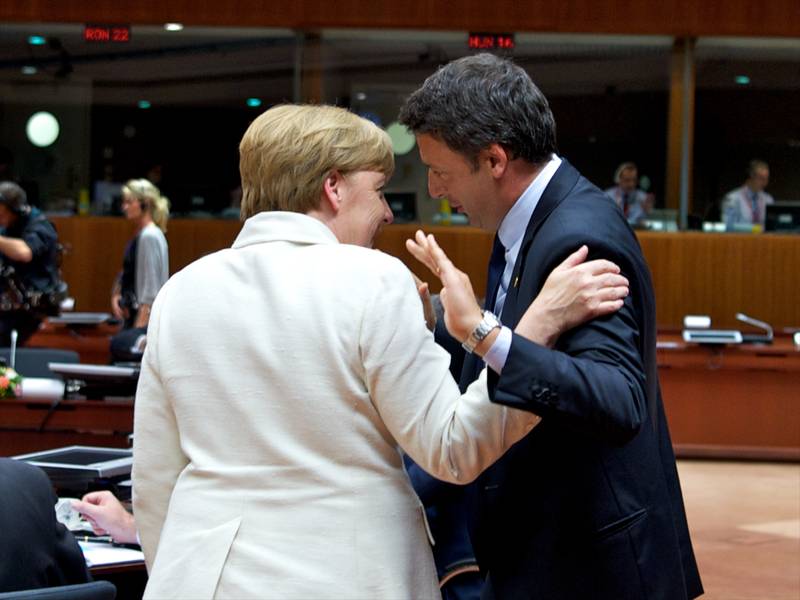 Angela Merkel, Matteo Renzi | © Council of the EU
Angela Merkel, Matteo Renzi | © Council of the EUBrexit Awoke an Echo of the Euro Area Crisis
In the first days following the June 23 referendum in Great Britain, in which voters decided that their country should leave the European Union, economic data showed the presence of a far stronger economic shock for the United Kingdom, than for the EU. A month after the publishing of t ...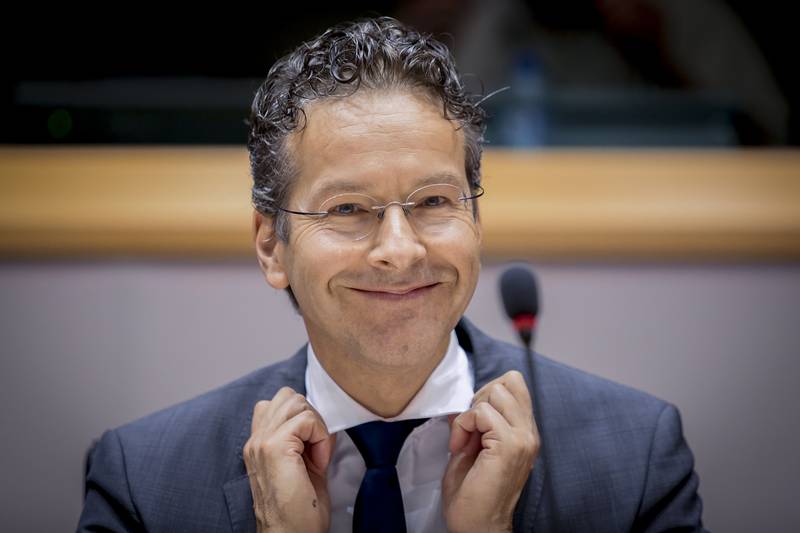 Jeroen Dijsselbloem | © European Parliament
Jeroen Dijsselbloem | © European ParliamentEC Needs To Understand All Members Are Equal to the Pacts
The hearing of Dutch Finance Minister Jeroen Dijsselbloem in the EP’s economic committee on Tuesday was planned to be smooth and boring. The purpose of the hearing was for the minister to give an account about what has been accomplished by the Dutch rotating presidency during the six- ...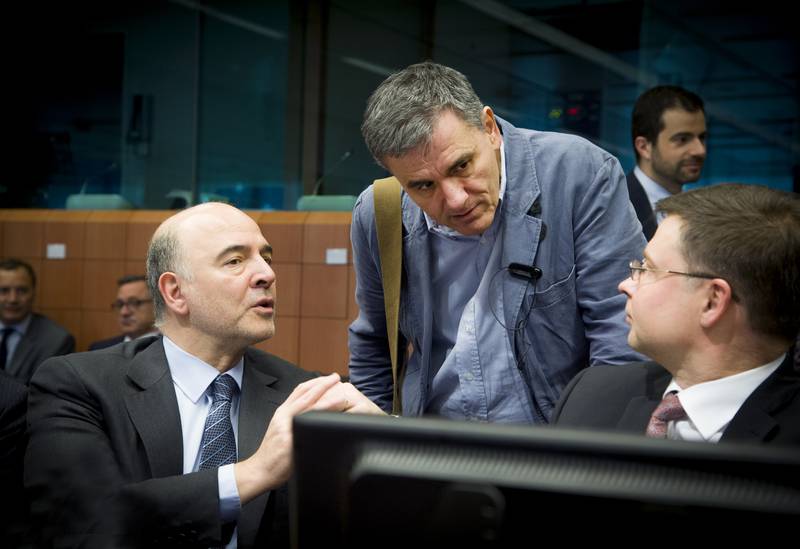 Moscovici, Tsakalotos, Dombrovskis | © Council of the EU
Moscovici, Tsakalotos, Dombrovskis | © Council of the EUIs the End of the Greek Saga Near?
Have we committed to history the emergency meetings of the Eurogroup, or even the European Council, dedicated to solving the next Greek case – will it have enough money to pay wages and pensions, will it remain in the euro area, will it draw another loan, will it pay back the previous ones ...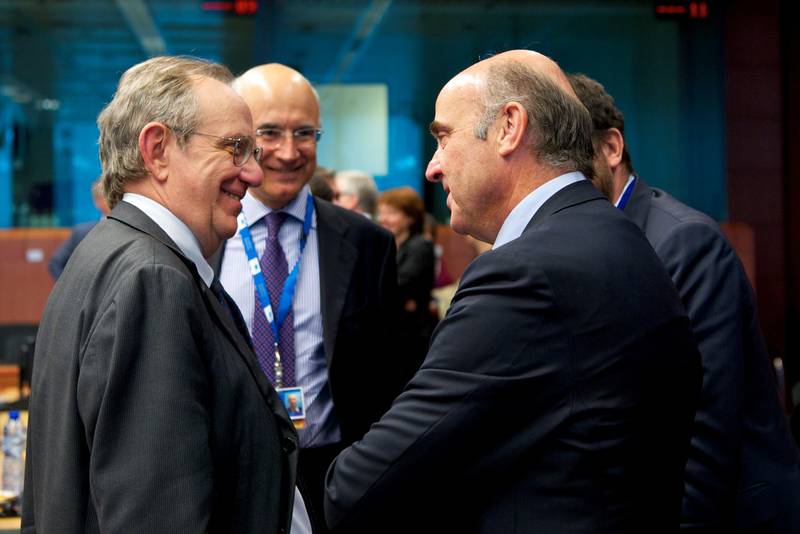 Pier Carlo Padoan, Luis De Guindos | © Council of the EU
Pier Carlo Padoan, Luis De Guindos | © Council of the EUEC: Now Is Not the Time To Follow Rules
The crisis is officially over, budget policy no longer matters, rules do not matter during election time. Those are the messages from this year’s European semester, the culmination of which was the presentation of the country-specific recommendations on May 18th. At that time, th ...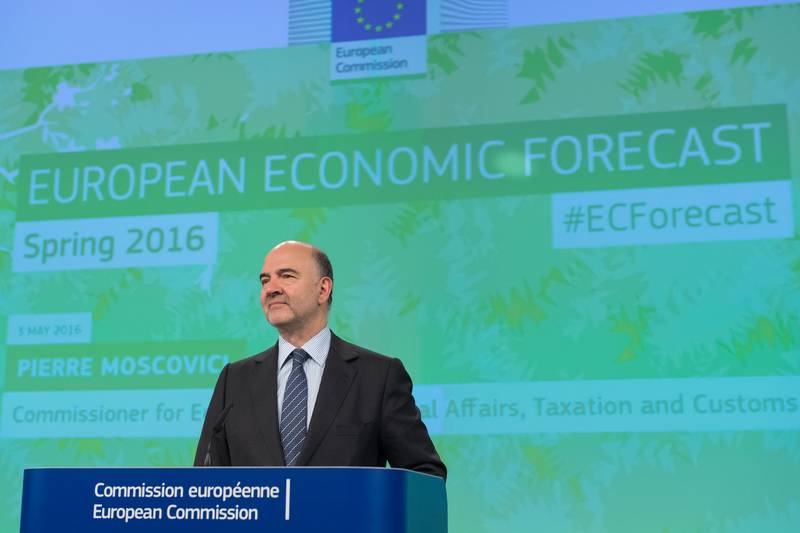 Pierre Moscovici | © European Commission
Pierre Moscovici | © European CommissionSpring Economic Forecast: Going out of Austerity Back To Keynesianism
This week, the European Commission revised down its forecast for the EU’s economic growth because of the continuing global instability, but also because of the internal European instability. The EC expects the effect on growth of the low oil prices and the devaluation of the euro to wane, ...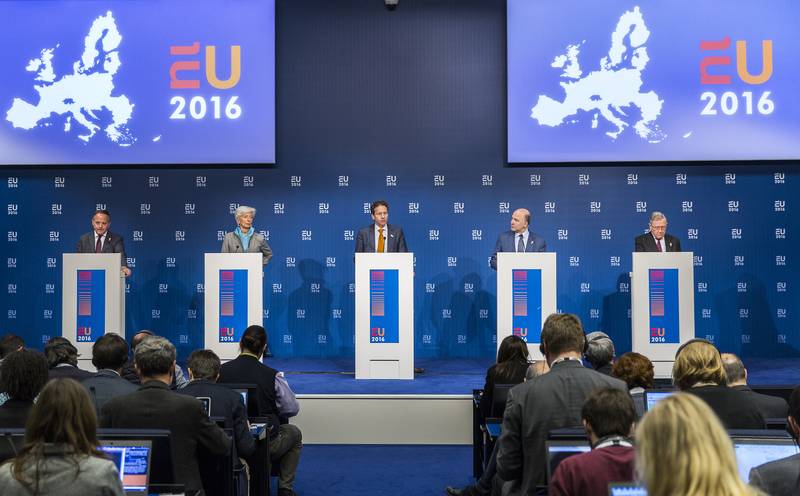 | © Council of the EU
| © Council of the EUEurogroup and IMF Have Come Closer to Agreement on Greek Debt
The end of the dispute between the International Monetary Fund and the EU on the third Greek bailout programme is now near. This became evident during the informal meeting of the Eurogroup in Amsterdam last Friday. A compromise solution was reached then, which allows for the IMF to receive guara ...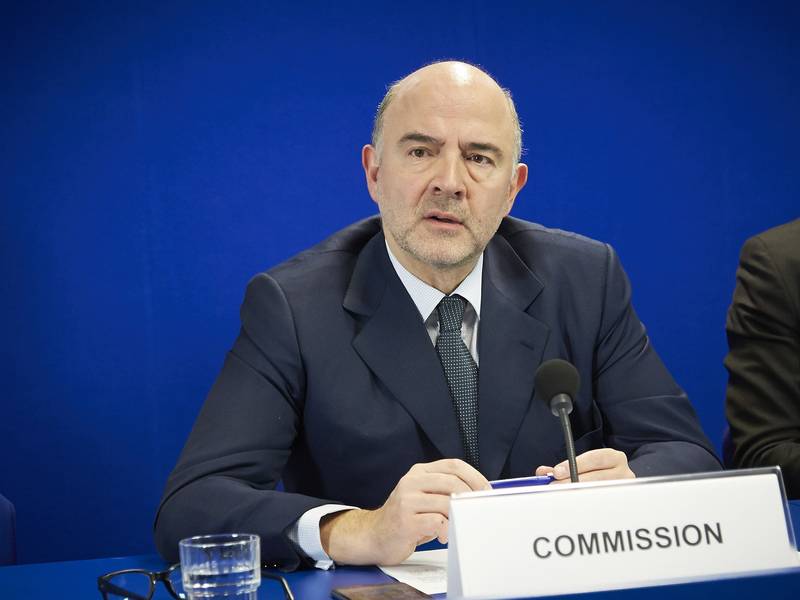 Pierre Moscovici | © Council of the EU
Pierre Moscovici | © Council of the EUEurogroup Gave In to the IMF on Greek Debt Relief
It is not easy being Greece these days. On one side, Athens is pressed by the thousands of refugees overflowing from Turkey and its Schengen partners, and on the other it is pressured by disagreement between the Eurogroup and the International Monetary Fund on the implementation of the third bai ...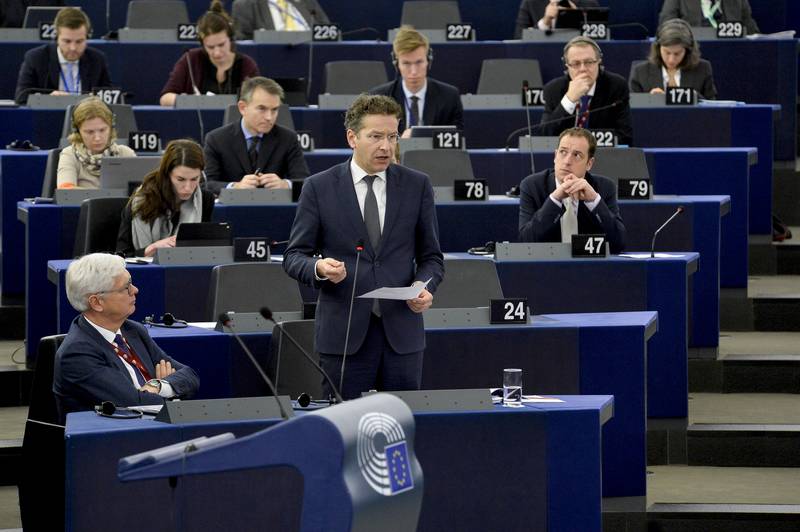 Jeroen Dijsselbloem | © European Parliament
Jeroen Dijsselbloem | © European ParliamentJuncker: The Euro Area Crisis Is not Over Yet
The subject of the euro area's future is back on the agenda of the leaders of the 28 EU member states. This time, however, more specific decisions are expected. The five presidents’ report will be thoroughly discussed on the second day of the December European Council &ndash ... Pierre Moscovici | © European Commission
Pierre Moscovici | © European CommissionThe Missing Numbers in the Autumn Economic Forecast
The demographic component of growth is not the only novelty in this year’s economic forecast. There was one more quite important element in it, which however, due to lack of figures, remains almost invisible. It is the effect of structural reforms. This tiresome phrase, ...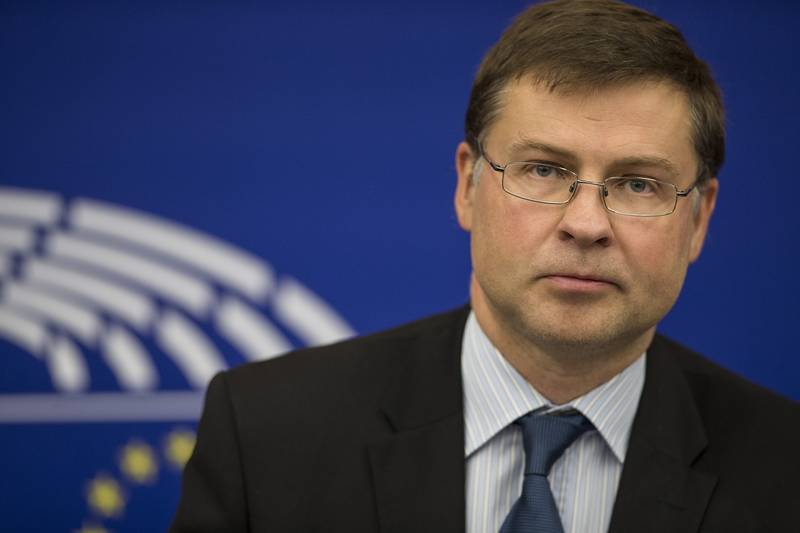 Valdis Dombrovskis | © European Commission
Valdis Dombrovskis | © European CommissionPierre Moscovici Went Too Far with EC's Politicising
Jean-Claude Juncker came to power with the promise to remake the purely technocratic, bureaucratic, and clerical body into a slightly more-political European Commission. A year later, the Commission is becoming too political. This is most obvious in the European semester and espec ...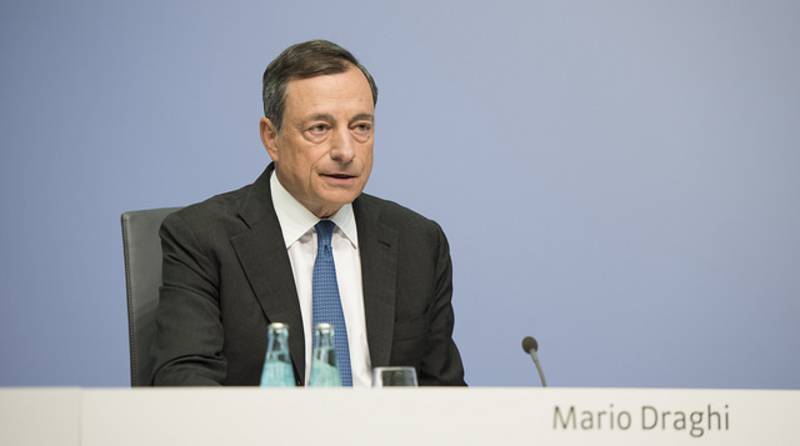 Mario Draghi | © ECB
Mario Draghi | © ECBEconomic Uncertainty Weighs over the Eurozone
Economic recovery of the Eurozone has slowed down due to new risks emerging in the last few months, reported European Central Bank boss Mario Draghi last Thursday after the first meeting of the bank’s Governing Council after the summer holidays. The Real Gross Domestic Product of ...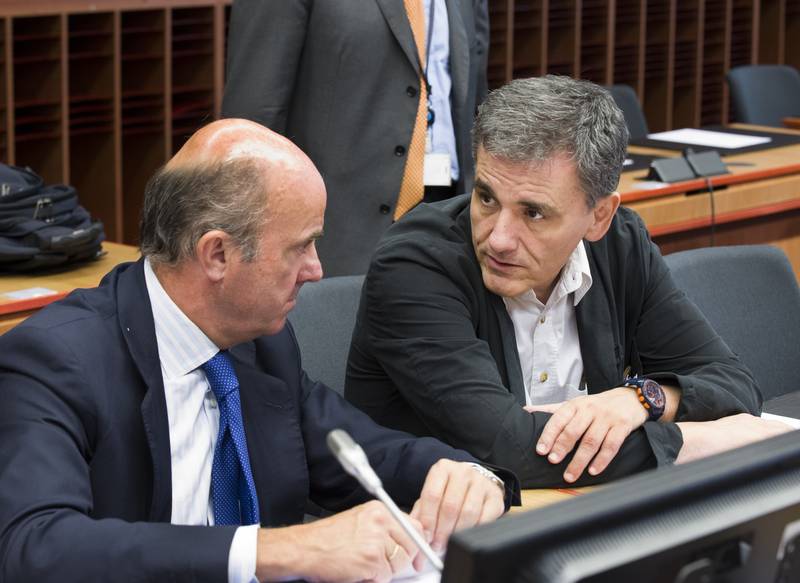 Luis De Guindoz, Euclid Tsakalotos | © Council of the EU
Luis De Guindoz, Euclid Tsakalotos | © Council of the EUGreece's Third Bailout Programme Is a House of Cards
On Friday night the ministers of finance of the Eurozone approved the third bailout programme for Greece, amounting to almost 86 billion Euros. Nothing in this programme is for certain, though – not the involvement in it of the International Monetary Fund; some fundamental issues, connecte ...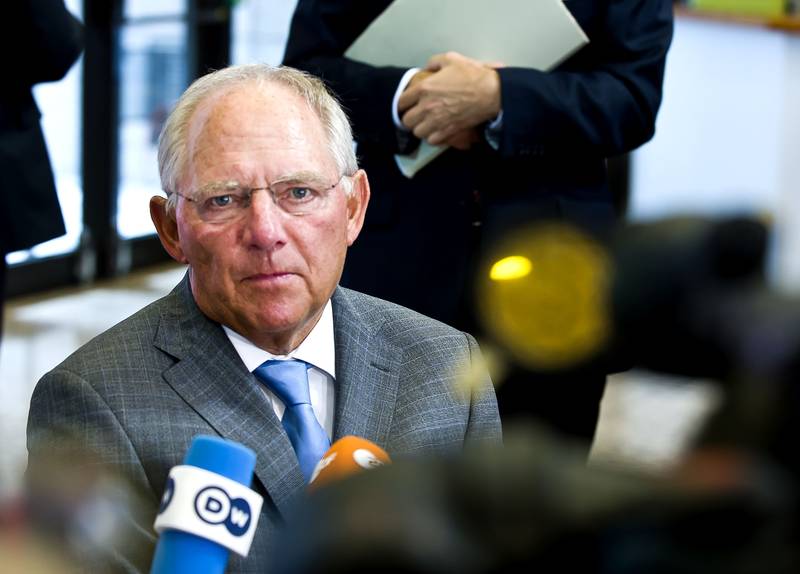 Wolfgang Schaeuble | © Council of the EU
Wolfgang Schaeuble | © Council of the EUGreece's Third Bailout Deal Fell in the Eye of the Currency Storm
Can you imagine that the main topic of the emergency meeting of the Eurogroup on Greece is not Greece itself? Difficult to do, but fact. The third bailout package of loans-against-reforms, which has already been agreed on and is about to be approved by the finance ministers of member-countries o ... Emmanuel Macron | © Council of the EU
Emmanuel Macron | © Council of the EUEurozone Goes into a “What To Do with Myself?” Mode
While at a global level the giants USA and China have entered a new level of currency wars, the EU is looking at a second fall into self-reflection mode on what to do with itself in the setting of the second Greek crisis and the unsatisfactory outcome of the shared debt crisis in ... Valdis Dombrovskis | © European Commission
Valdis Dombrovskis | © European CommissionEU Brings Out the Bag of Carrots for Greece
The change of tone of EU towards Greece over the last week is significant. The GRexit came out of the agenda, the Eurozone is back in work mode and started to prepare the next programme with Greece and even the flow of cash towards Athens is back on line. It is surely difficult to tell if t ...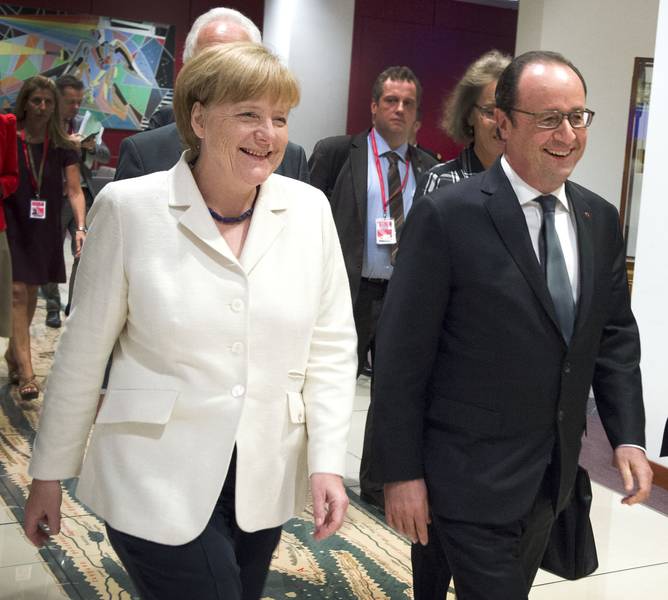 Angela Merkel, Francois Hollande | © Council of the EU
Angela Merkel, Francois Hollande | © Council of the EUEurozone Is More United than Ever
Criticism like a summer storm has been pouring down from everywhere over the last few days aimed at the Monday morning deal between the Eurozone and Greece. The main arguments are that this is a brutal diplomatic blow at Greece, the currency club has never stood more divided, and this is one ver ...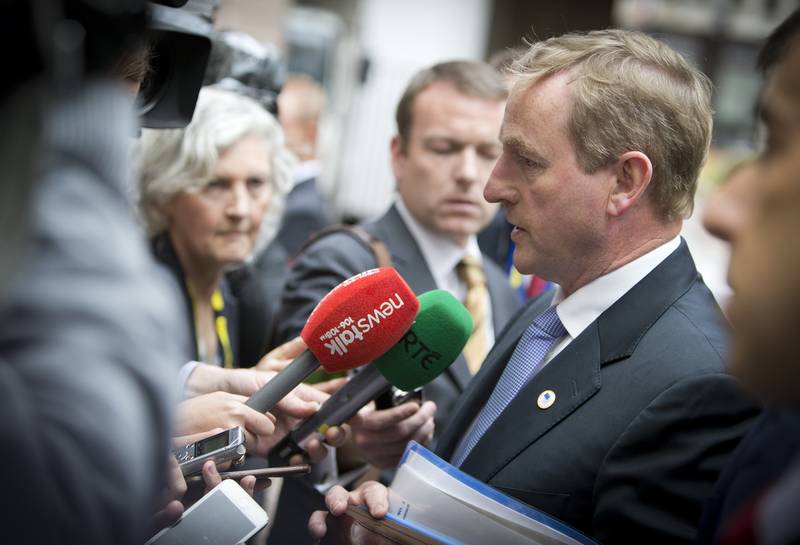 Enda Kenny | © Council of the EU
Enda Kenny | © Council of the EUGreece Got a Promise for a Deal
Hundreds of hours of negotiations, multiple meetings over the last six months, many punches below the belt exchanged, insults, playing around with history, mocking democracy, and a huge waste of paper and energy were invested in Greece staying in the Eurozone, practically in a pre-accession regi ...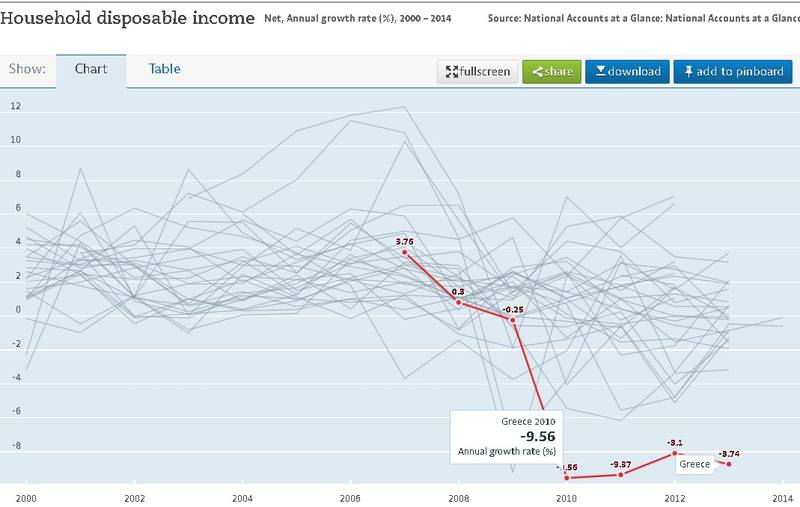 | ©
| © No Alternative for Greece but Austerity
Leaders of Eurozone countries are convening again to decide what to do with Greece after the controversial referendum held last Sunday which resulted in rejection of the already obsolete bailout program. While everyone claims they want Greece to stay in the Eurozone, the currency club is practic ... | © Prime Minister of Greece
| © Prime Minister of GreeceIt's the Democracy, Stupid!
The referendum in Greece ended with an expected result – NO. Although it is yet to be seen what the implications of this vote will be to Greece itself and to the future of the Eurozone, it is important not to miss a very important effect of the “GReferendum” as it became popula ...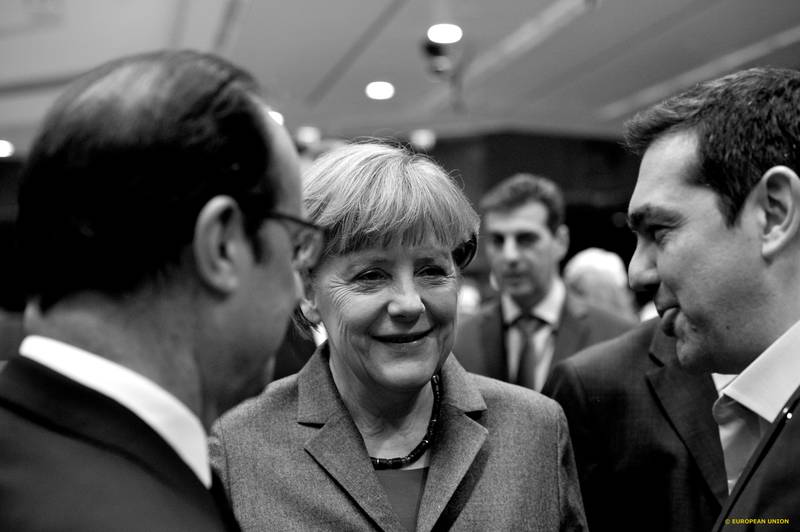 Hollande, Merkel, Tsipras | © Council of the EU
Hollande, Merkel, Tsipras | © Council of the EUGreece in Quick Sands: Germany's Crusade against Populism in Europe
In the analysis of the current Greek row with the country’s creditors, and of its inimical relationship with the EU as a whole, one must differentiate between the process and the action, if it were not to “throw the baby out with the bathwater”. The negotiations with the govern ...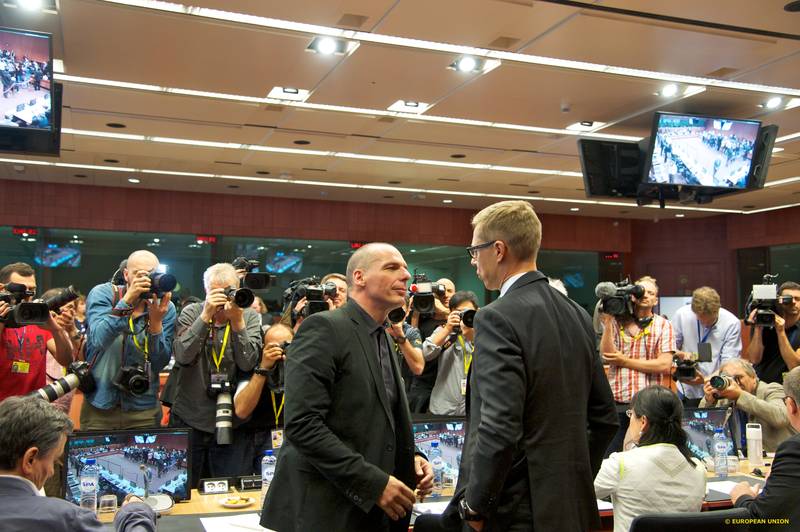 Yanis Varoufakis, Alexander Stubb | © Council of the EU
Yanis Varoufakis, Alexander Stubb | © Council of the EUBrussels, We've Got a Problem!
For the first time since the start of the Greek crisis six years ago, or come to think of it in the entire EU history, the Union faces the exit of a member country. And totally unprecedented (if long overdue) the EU directly addresses member country voters. All of this is the direct result ...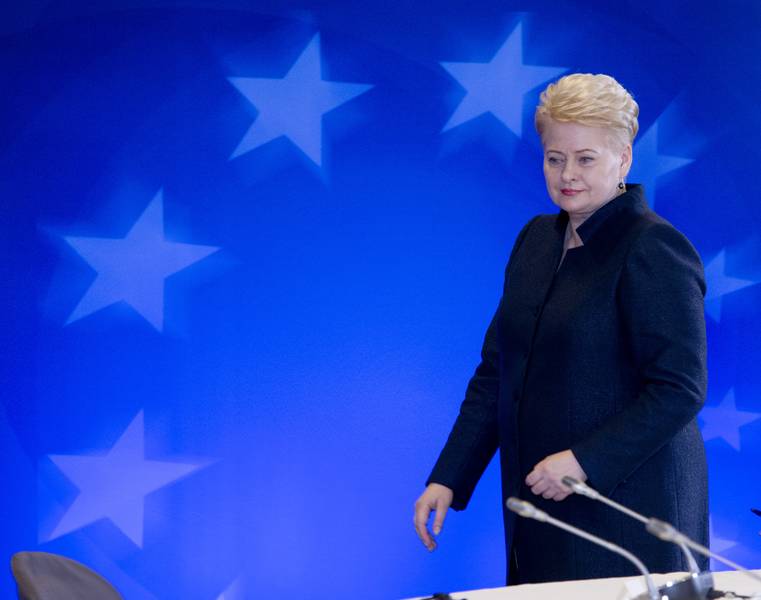 Dalia Grybauskaite | © Council of the EU
Dalia Grybauskaite | © Council of the EUGreece – a Never Ending Story
The biggest piece of news that came from the emergency summit of the Eurozone countries is that Greece has finally managed to submit something like a proposal, something that was expected of them for four months, ever since the decision to extend the current bailout program by four months &ndash ...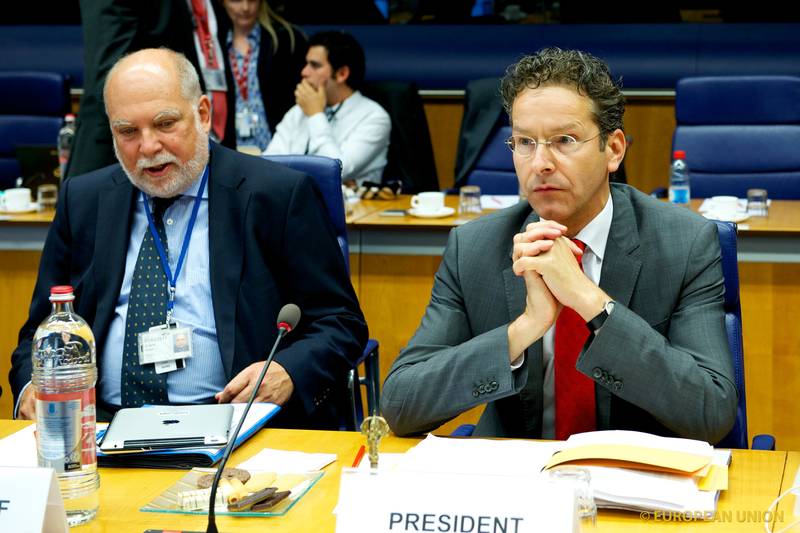 Jeroen Dijsselbloem | © Council of the EU
Jeroen Dijsselbloem | © Council of the EUHow Long to the Grexit?
The tired faces of the ministers representing the institutions before the Eurogroup meeting on Thursday turned into grim expressions after the session, which was longer than anticipated, considering the outcome. And if their faces, after uttering several worrisome lines, were not enough, the fac ... Jeroen Dijsselbloem | © Council of the EU
Jeroen Dijsselbloem | © Council of the EUGreece’s Final Countdown Has Started
Everybody has their eyes on the clock that dispassionately ticks away the time left for Greece to make a decision whether to stay in the EU or not. This is the prevailing attitude before the start of a fateful meeting of the Eurogroup (Finance ministers of the Eurozone) in Luxembourg today, who ...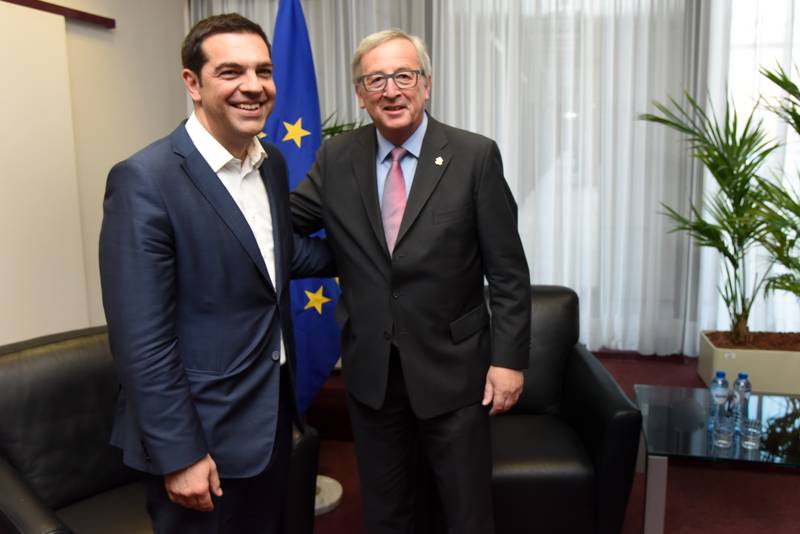 Alexis Tsipras, Jean-Claude Juncker | © European Commission
Alexis Tsipras, Jean-Claude Juncker | © European CommissionThe Game of Greek Roulette Spins to an End
At first glance this game looked a lot like Russian roulette, but it turned out a bit different. At its core the game is trying to fool the adversary whether the shot is real or has it reached its target. Over the last few weeks the game got rough with both sides – Greece and its creditors ...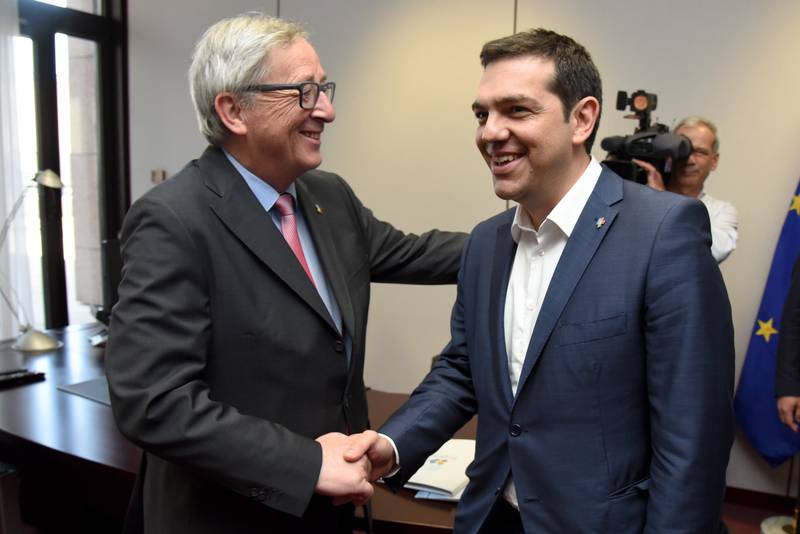 Jean-Claude Juncker, Alexis Tsipras | © European Commission
Jean-Claude Juncker, Alexis Tsipras | © European CommissionCrisis with Greece Is Political
Every year I drive thousands of miles across Europe and clash with various driving cultures and organisation of traffic. I dare say that, so far, the best system of traffic is in Germany where the combination of behaviour, rules and infrastructure makes driving predictable, fast and, ultima ...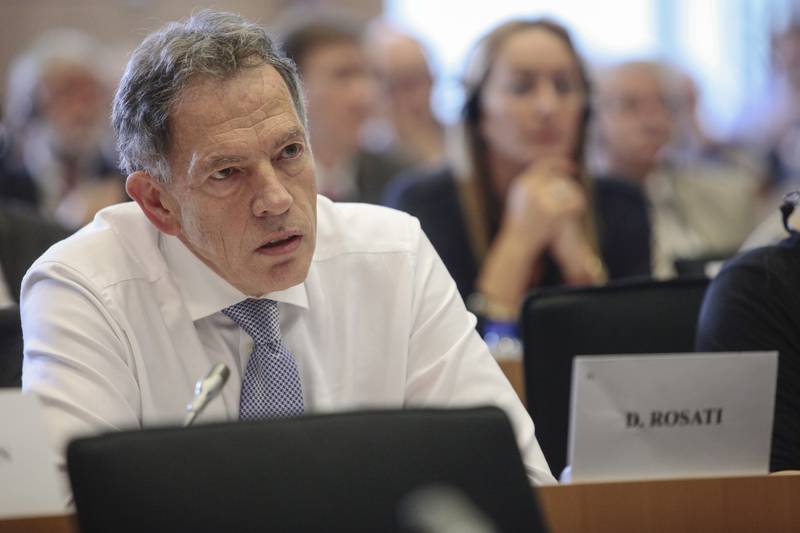 Dariusz Rosati | © European Parliament
Dariusz Rosati | © European ParliamentDariusz Rosati: EU Has To Change Its Social Model
EU share in global population is 7%. The Union produces 20% of the global gross domestic product but spends 50% of global social spending. 10-50 or even 20 years ago Europe was not threatened by competition from the outside world but now the European social model needs to be rebuilt, said i ...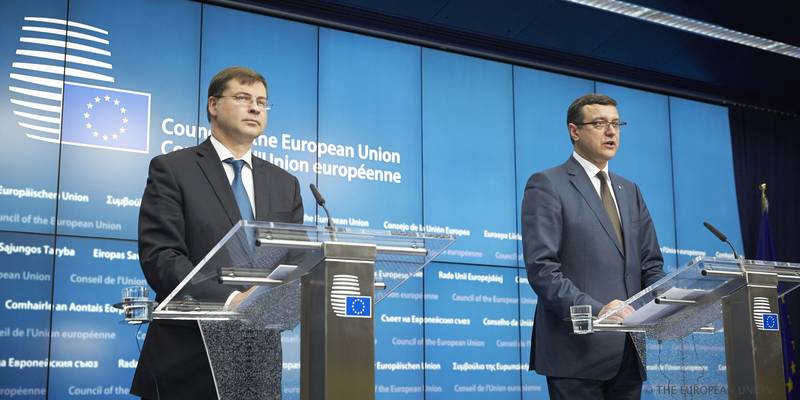 Valdis Dombrovskis, Janis Reirs | © Council of the EU
Valdis Dombrovskis, Janis Reirs | © Council of the EUCommission Treads Thin Ice with the European Semester
The big news from the presentation of one of the most important stages of the European semester - the country-specific recommendations (CSR) - is that France, Croatia, Finland and Britain will not be punished. Moreover, Poland exits the excessive deficit procedure earlier than planned. Another b ...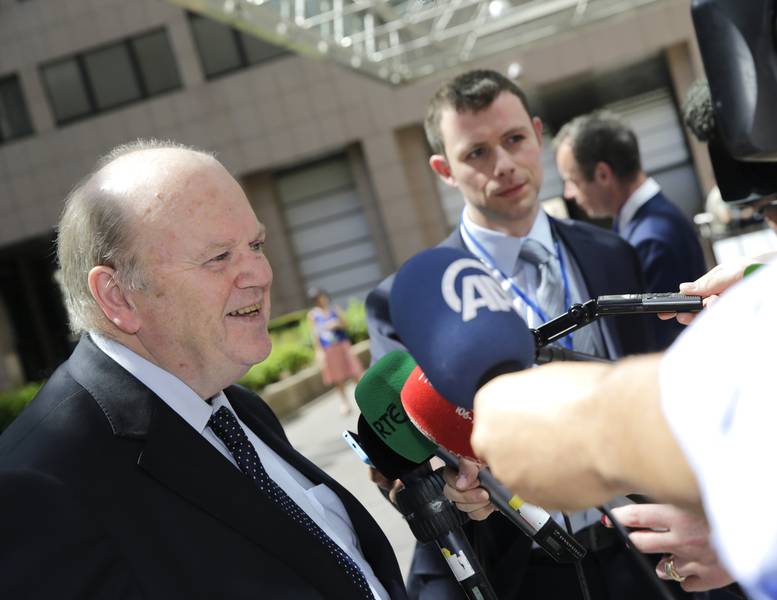 Michael Noonan | © Council of the EU
Michael Noonan | © Council of the EUNo, No and No. There Is No Deal with Greece
Another Eurogroup meeting, another article by Varoufakis in an influential international edition, again the same result - no agreement with Greece. This week, however, for the first time in months a shadow of optimism has appeared that by the end of June when the expansion of the current bailout ... Valdis Dombrovskis | © European Parliament
Valdis Dombrovskis | © European ParliamentA Threat of Sanctions Hangs over France and Croatia
The European Commission will decide in May whether to punish France and Croatia. The decision will depend on whether the national reforms programmes the two countries will present will be sufficient to overcome their excessive imbalances. This will happen after the presentation of the spring eco ... Valdis Dombrovskis | © Council of the EU
Valdis Dombrovskis | © Council of the EUThe Structural Reforms Bark but the Deficit Moves On
There is no doubt that the eurozone crisis is now in the past since the Commission and the Council have approved, without objections, the violations of fiscal rules to begin again. This happened in the end of February when the European Commission confirmed what we expected in the autumn, which i ...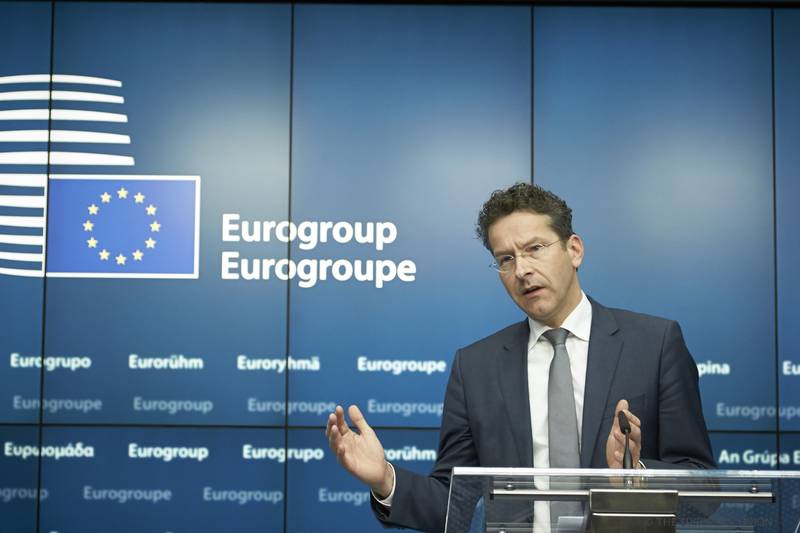 Jeroen Dijsselbloem | © Council of the EU
Jeroen Dijsselbloem | © Council of the EUEurogroup: Greece Is Wasting Time
When the Eurogroup chief and minister of finance of the Netherlands, Jeroen Dijsselbloem, said last month that the implementation of the 20 February agreement with Greece would not be easy he was extremely right. Difficult because Greece focuses mainly on the packing (for its electorate), wherea ...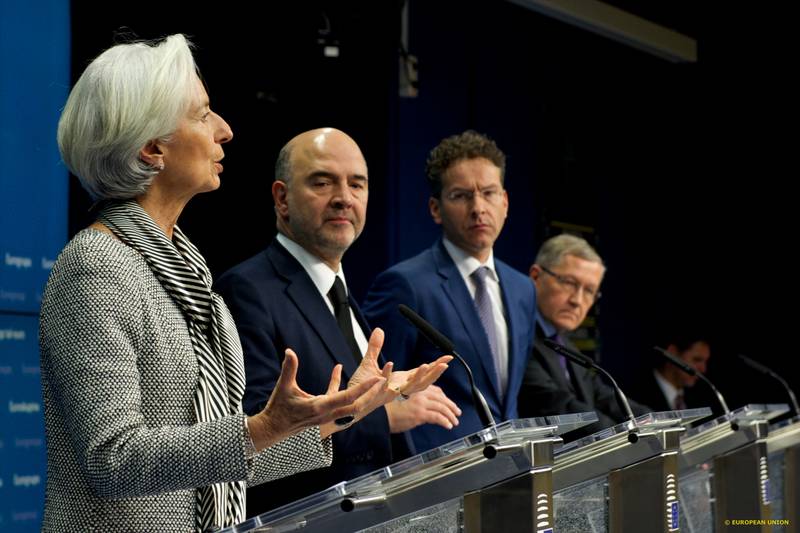 Lagarde, Moscovici, Dijsselbloem, Regling | © Council of the EU
Lagarde, Moscovici, Dijsselbloem, Regling | © Council of the EUWinners and Losers in the Greek Crisis
There is something wrong in the way problems are discussed in EU, especially such as the Greek crisis 2.0. The antagonising of winners and losers or of my democracy against yours is a brilliant illustration of one of the biggest problems EU is facing - the sustainability of the Union. It is true ...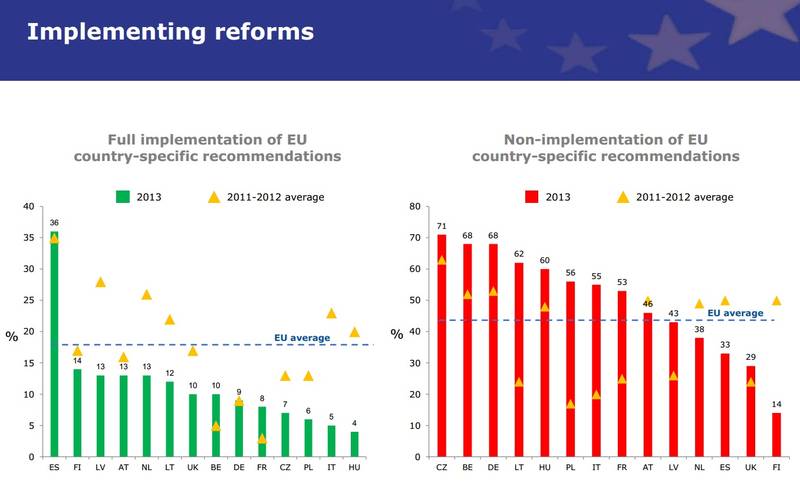 | © European Central Bank
| © European Central BankReforms and the Single Market Are the Future of the Euro Area
The issue because of which the informal European Council on 12 February was convened was left with no attention at all at the summit, the agenda of which was completely overtaken by the situation in Ukraine and the renewed conflict with Greece. The journalists did not pay attention to the third ...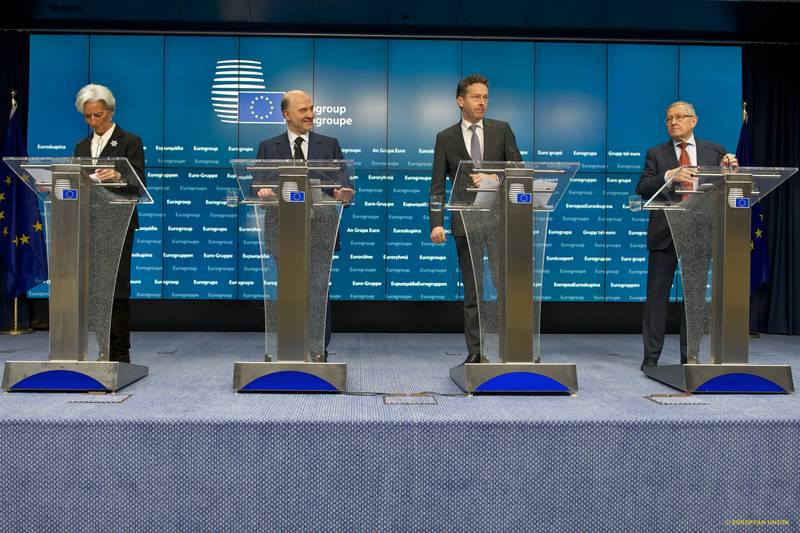 Christine Lagarde, Pierre Moscovici, Jeroen Dijsselbloem, Klaus Regling | © Council of the EU
Christine Lagarde, Pierre Moscovici, Jeroen Dijsselbloem, Klaus Regling | © Council of the EUGreece and Eurogroup - a Clash of Democracies
The patience of the Eurogroup is over and the ministers have put an ultimatum to Greece - an extension of the current programme or you are on your own. This has become clear from the unprecedentedly short meeting of the eurozone finance ministers on 16 February in Brussels. A meeting that was co ...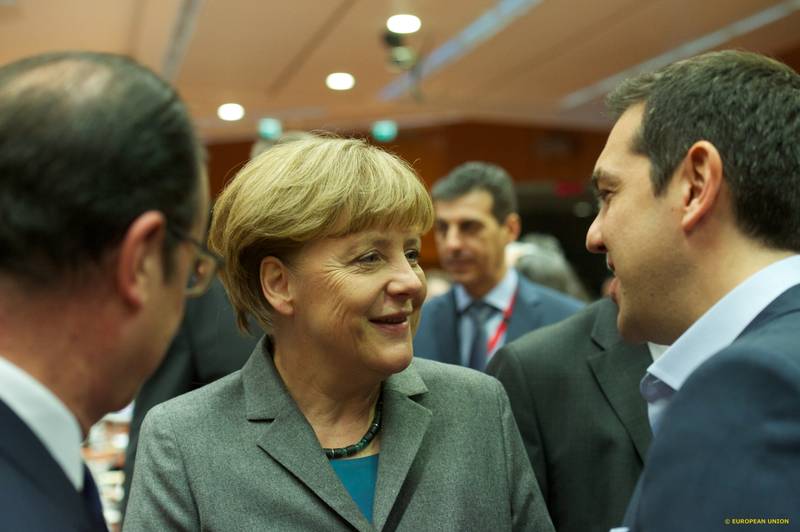 Francois Hollande, Angela Merkel, Alexis Tsipras | © Council of the EU
Francois Hollande, Angela Merkel, Alexis Tsipras | © Council of the EUEU Is Back in the Greece Mode
There is no doubt that the EU is again in a Greek mode. The issue of the future of Greece has again overtaken the agenda of the EU summits and of the Eurogroup meetings and has returned the feeling of frustration that was forgotten for a while. The big difference from the last time, however, is ...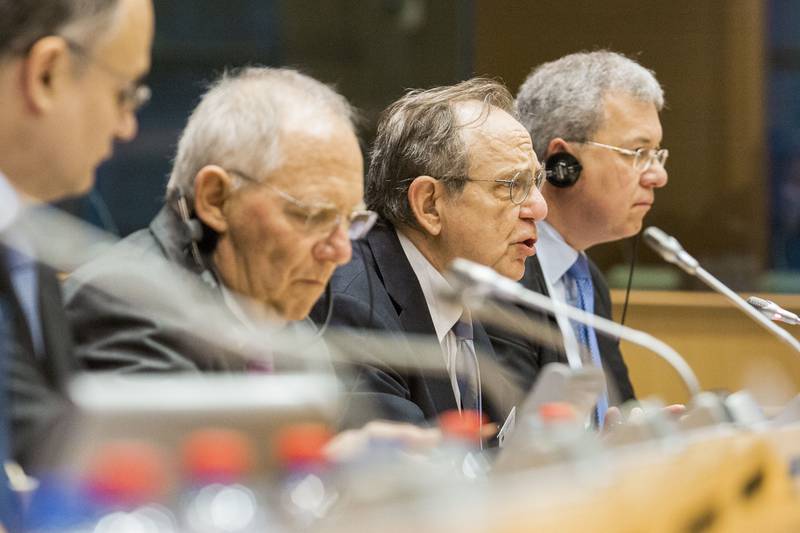 Wolfgang Scheuble, Pier Carlo Padoan | © European Parliament
Wolfgang Scheuble, Pier Carlo Padoan | © European ParliamentThe EU Economic Governance - a Game for Grown-ups
In December, when the new European Council President Donald Tusk decided to call an informal summit in February to discuss the future of the euro area, the elections in Greece were not on the horizon, the attack on Charlie Hebdo had not happened yet and the situation in Ukraine had not dete ... Jeroen Dijsselbloem, Klaus Regling | © Council of the EU
Jeroen Dijsselbloem, Klaus Regling | © Council of the EUDon't Panic! It's Just Democracy! Sobering Is Next
Is the end of the Greek pains near? Can the new Greek Prime Minister Alexis Tsipras fulfil his promises to put an end to the austerity and write off part of the debt? Will the EU fall apart? Is it so scary that a populist extreme left party like Syriza has won an election with almost full majori ...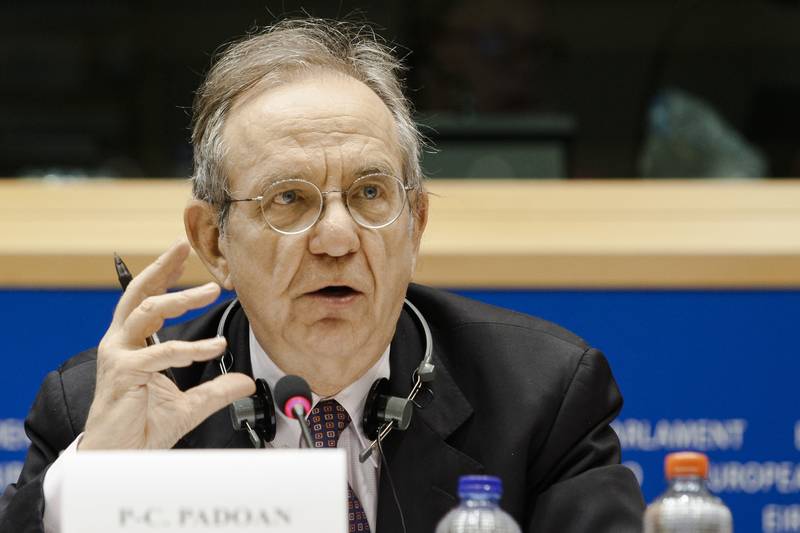 Pier Carlo Padoan | © European Parliament
Pier Carlo Padoan | © European ParliamentNo More Austerity. It's Time for Investments
Does the EU need changes and what should they be? New legislation or a change of the behaviour when applying the already agreed? Those are questions that have again been raised in the Union because of the uneven economic recovery and the not good economic perspectives the EU is facing both ... Jeroen Dijsselbloem | © Council of the EU
Jeroen Dijsselbloem | © Council of the EUEurosceptics Threaten the Survival of the Stability and Growth Pact
Even before the criteria for application of the much awaited in the EU flexibility of the fiscal rules are published, it is clear that one of them will be the political environment. Hardly this criterion will be articulated officially, but it is being discussed openly in the EU. The issue took m ...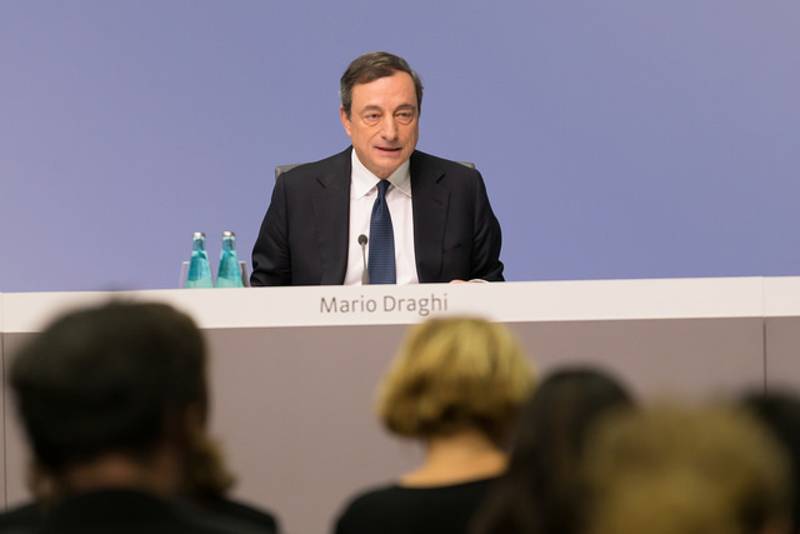 Mario Draghi | © ECB
Mario Draghi | © ECBJuncker Threw the Gauntlet to the Member States with the Investment Plan
The new president of the European Commission Jean-Claude Juncker has pulled the bull's horns by challenging the European Parliament, the member states and the business. On 26 November he presented the long-awaited investment plan which has turned into a central topic for the new Commission. And ...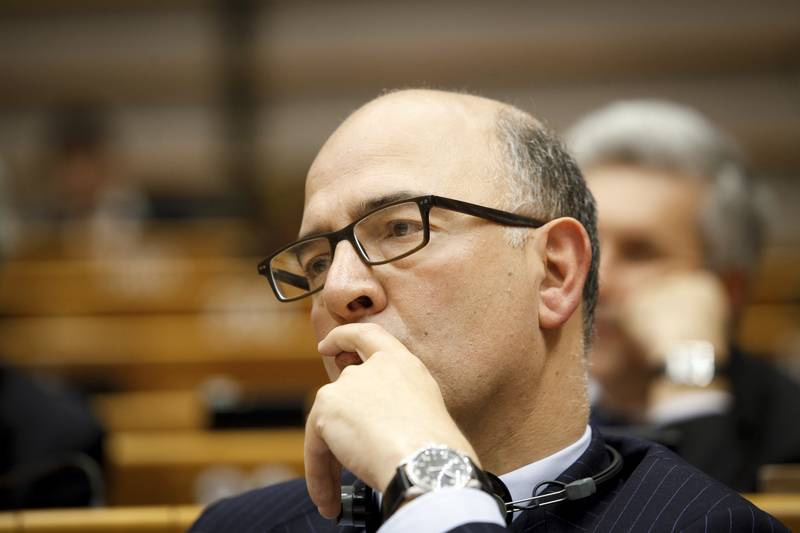 Pierre Moscovici | © European Parliament
Pierre Moscovici | © European ParliamentEPP Takes Revenge for Moscovici's Appointment
The new/old flexibility of the Stability and Growth Pact (SGP) of the EU is already a fact. It was applied by the new European Commission when it presented its opinions on the budgetary plans of the euro area member states. According to the analysis of the draft budgets of 16 countries (without ...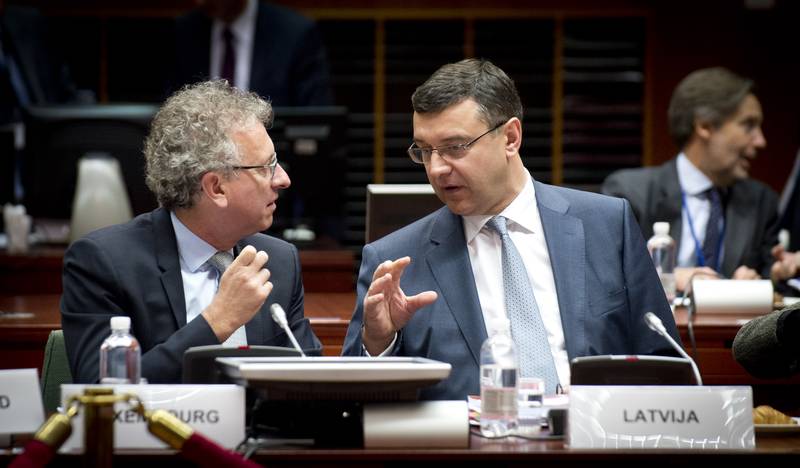 Pierre Gramegna, Janis Reirs | © Council of the EU
Pierre Gramegna, Janis Reirs | © Council of the EUWolfgang Schäuble: Not Adopting the FTT Endangers the European Democracy
The Financial Transaction Tax (FTT) ensures that we have learnt the lessons from the banking crisis. Unless we accelerate the work on improving the rules so that they are adequate to an environment of globalisation, we will destroy the support for the European integration and that will be the en ...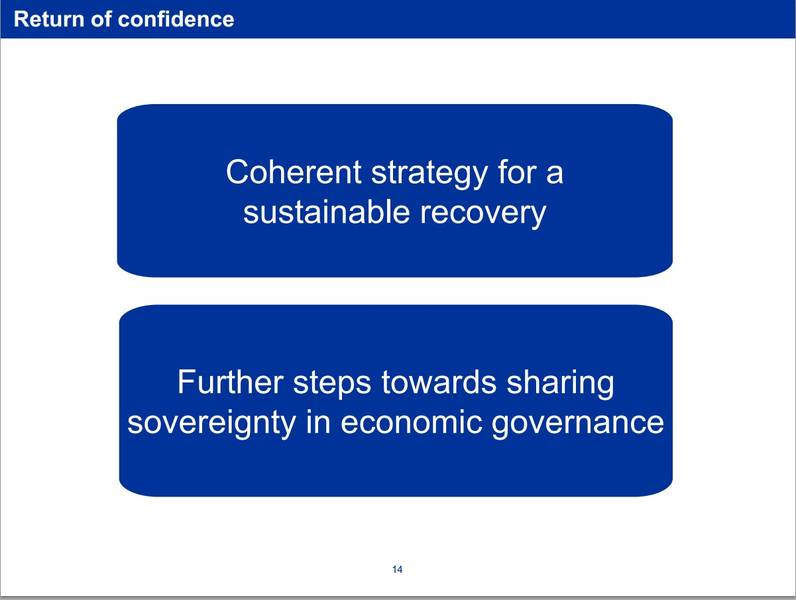 | © European Central Bank
| © European Central BankRough Waters in EU
Two years have passed since the leaders of the member states tasked the four presidents (of the Commission, the Eurogroup, ECB and the European Council) to present a vision about the deepening of the integration in the euro area and since their product was approved by the heads of state or gover ... Jeroen Dijsselbloem | © Council of the EU
Jeroen Dijsselbloem | © Council of the EUIt's the Reforms, Stupid!
The euro area crisis is getting back judging by the tangible increase of the prices of new debt for the peripheral countries on the financial markets last week. The yields of Italian, Portuguese and Spanish debt have risen by around 30 basic points, but then subsided back to normal. The price of ...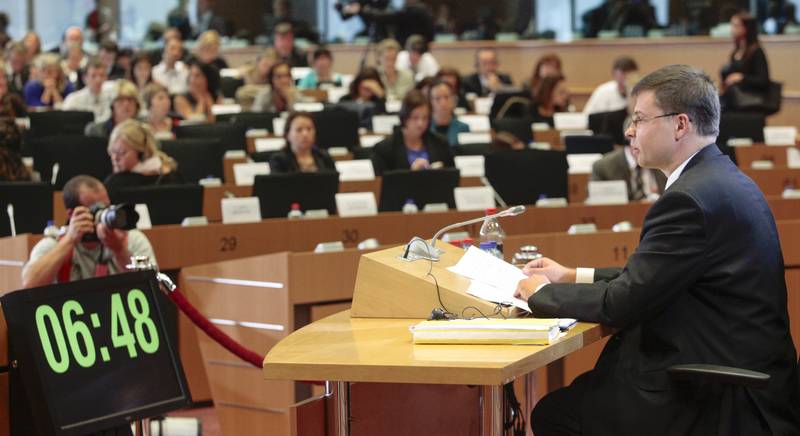 Valdis Dombrovskis | © European Parliament
Valdis Dombrovskis | © European ParliamentThe Eurozone Will Study from Valdis Dombrovskis's Baltic Textbook
Is there a clearer message about the new European Commission's economic policy in the next five years than the appointment of a Latvian former prime minister on the key position Vice President responsible for the Euro and the Social dialogue? Valdis Dombrovskis's CV is flawless as is his ca ...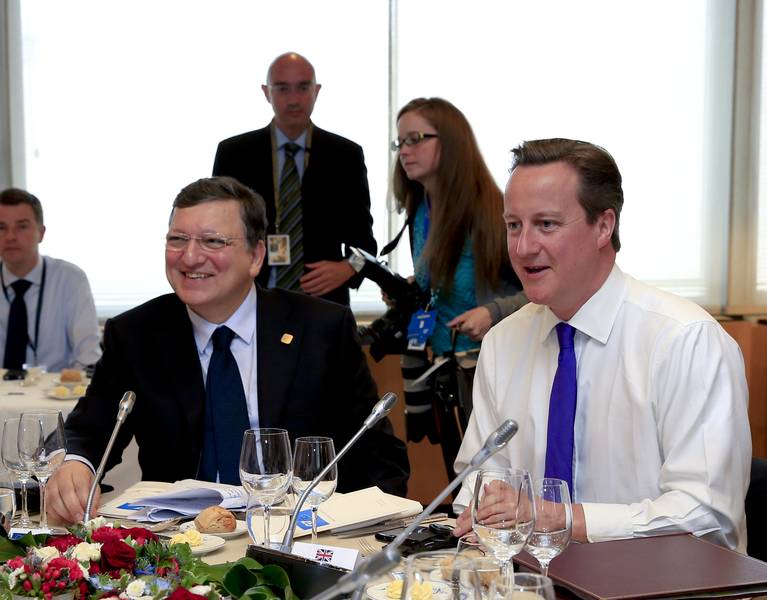 Jose Manuel Barroso, David Cameron | © Council of the EU
Jose Manuel Barroso, David Cameron | © Council of the EUCameron vs EU - 3:1
David Cameron's relations with the EU have always been based on victory or loss. In this regard, the score in the match between Great Britain and EU (the euro area in particular) is 3 to 1 for London. The British prime minister has scored three wins over his should-have-been-partners opponents. ... Mario Draghi | © ECB
Mario Draghi | © ECBEuro Area, Good and Bad Recession
In the second quarter of 2014, the euro area's economic growth froze (at 0.0%). In the EU at large, the economy grew by 0.2%. The latest Eurostat data not only underscored the uneven distribution of economic recovery but also the next division in the eurozone - of a good and bad recession. This ...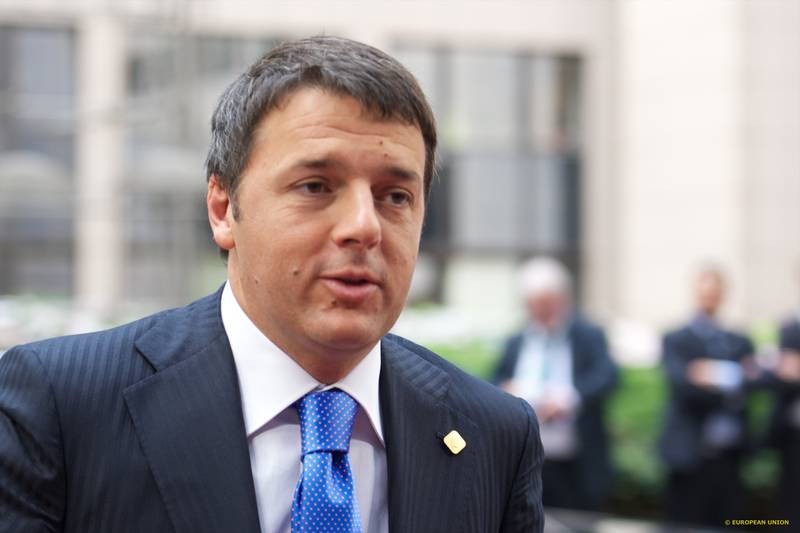 Matteo Renzi | © Council of the EU
Matteo Renzi | © Council of the EUItaly Is Opening the New Season of the Euro Area Crisis
A really hard beginning is awaiting the new European Commission. Not only that it will have to work in an environment of growing tensions along the external borders, especially to the east, but it will have to tackle a possible return of the eurozone crisis with all the consequences that stem fr ...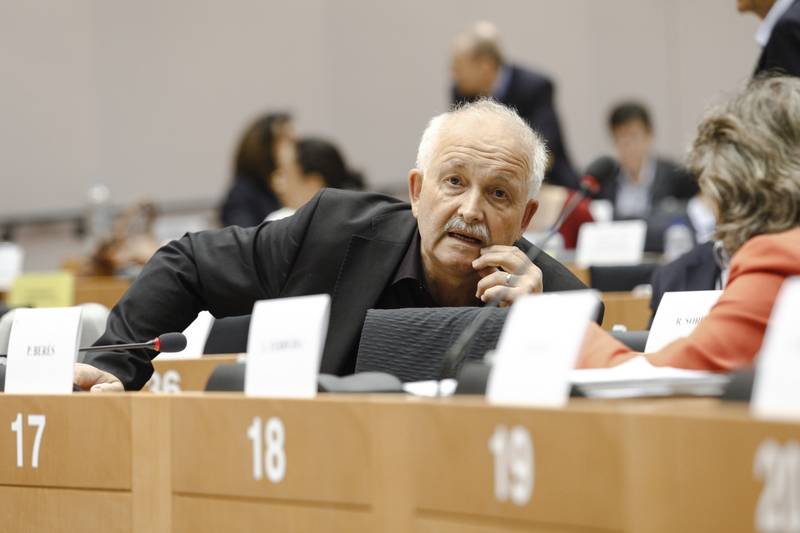 | © European Parliament
| © European ParliamentHard Landing of Hopes for Less Austerity
Matteo Renzi and his Social Democrats have won the most convincing victory in the entire EU at the European elections in May with a promise for structural reforms and soothing the pains from austerity. The latter has created excessive expectations which the Italian prime minister fuelled with po ... Jose Manuel Barroso, Olli Rehn | © European Commission
Jose Manuel Barroso, Olli Rehn | © European CommissionCrisis in EU a Crisis of Excessive Expectations?
The EU is again on the drawing board. This spring and the advancing summer mark the beginning of a new season of designing the Community's future. In order for the project to be good and sustainable, however, it is first necessary to make an accurate diagnose of what has happened. And this ...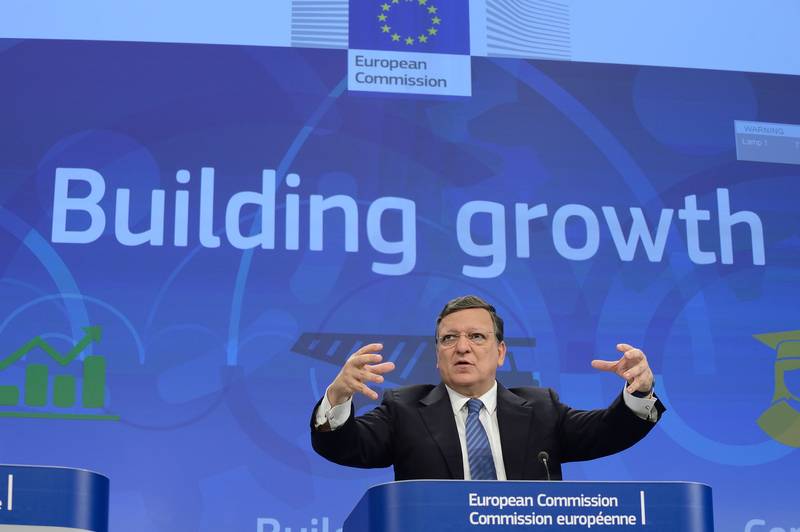 Jose Manuel Barroso | © European Commission
Jose Manuel Barroso | © European CommissionEU Is Recovering but the Commission Has Doubts There Is Political Will
So far the crisis has been the main driver of reforms in the EU at large and in the member states separately, but from now on there is a serious risk that there will not be political will to continue with them. This is one of the main messages in this year's country-specific recommendations (CSR ...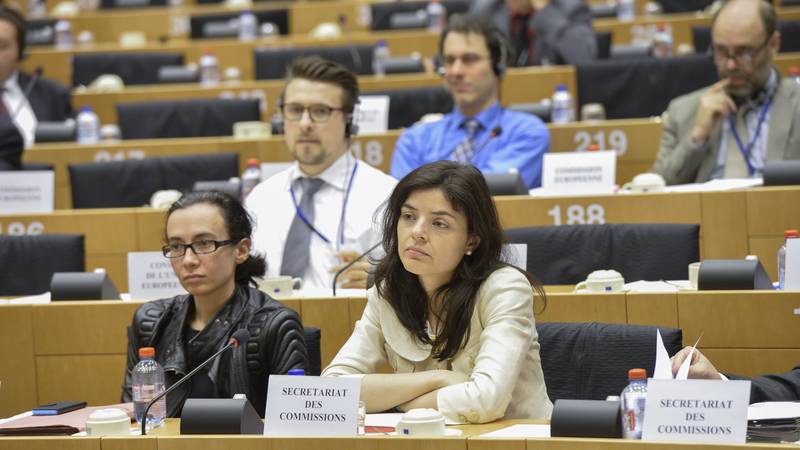 | © European Parliament
| © European ParliamentIs There No Longer a Need of Eurobonds?
Do you remember the hysteria of the financial markets in the beginning of the crisis when Greece defaulted and that unleashed a series of problems in the euro area with the semi-defaults of Ireland, Portugal, then the banking troubles of Spain. There were problems in Italy, too. Then, the financ ... Olli Rehn | © European Commission
Olli Rehn | © European CommissionIndebtedness Is the Biggest Hurdle to Growth
The European economy is facing a not very inspiring growth, according to the European Commission's winter forecast. And although the situation is not as cloudy as it was in the autumn or the winter of 2013, the perspectives continue to be uncertain. A week after the publishing of the winter fore ... Jeroen Dijsselbloem | © World Economic Forum/swiss-image.ch
Jeroen Dijsselbloem | © World Economic Forum/swiss-image.chMario Draghi, Abenomics and Ireland Were the Stars of Davos 2014
The European economic recovery is a fact, however it is fragile because there is a danger of losing momentum on reforms. Structural reforms are the key and were the two most frequently used words in the context of Europe's exit from the crisis during this year's World Economic Forum in Davos. Ge ...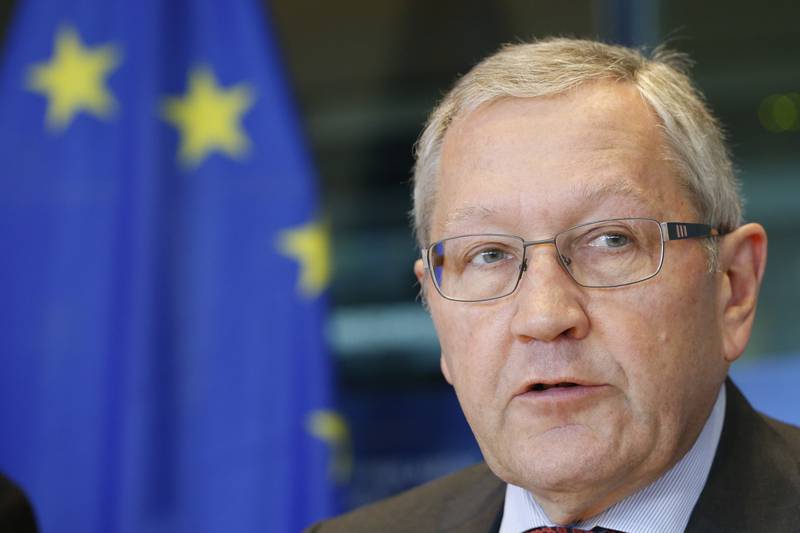 Klaus Regling | © European Parliament
Klaus Regling | © European ParliamentWhen Politics Meets Expertise or Is the Troika a Bad Thing?
Who is responsible for the crisis? Has the Troika contributed or relieved the crisis? Could it and even should it have been more democratic? Those are key questions that sounded last week in Strasbourg during the inquiry of the economic committee of the European Parliament of the work of the tri ...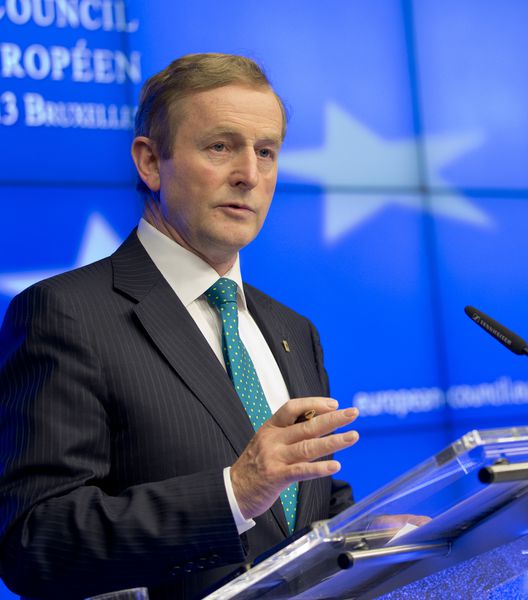 Enda Kenny | © Council of the EU
Enda Kenny | © Council of the EUIreland Got Its Sovereignty Back, but How Independent It Actually Is?
2013 did not begin very well for the Troika - that scary Troika which The Irish Independent described as Men in Black and which is hated in Athens, Lisbon but also in Strasbourg. The troika representatives of the European Central Bank, the European Commission and the International Monetary Fund, ...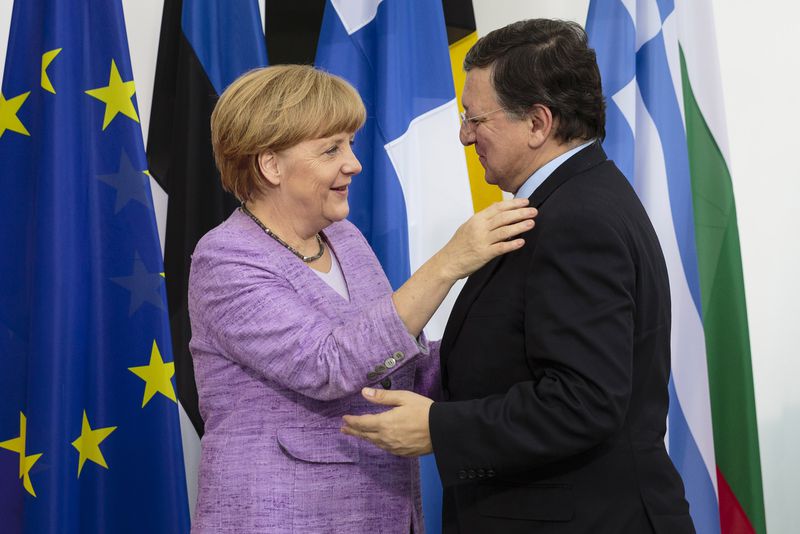 Angela Merkel, Jose Manuel Barroso | © Council of the EU
Angela Merkel, Jose Manuel Barroso | © Council of the EUGermany, Excuse Us, but We Have To
The fourth European Semester will remain in history as the first in which the European Commission dared to treat all member states equally, including the motor of the EU. And if France already is a subject of an in-depth review of its economy for potential problems, which unleashed a war of word ...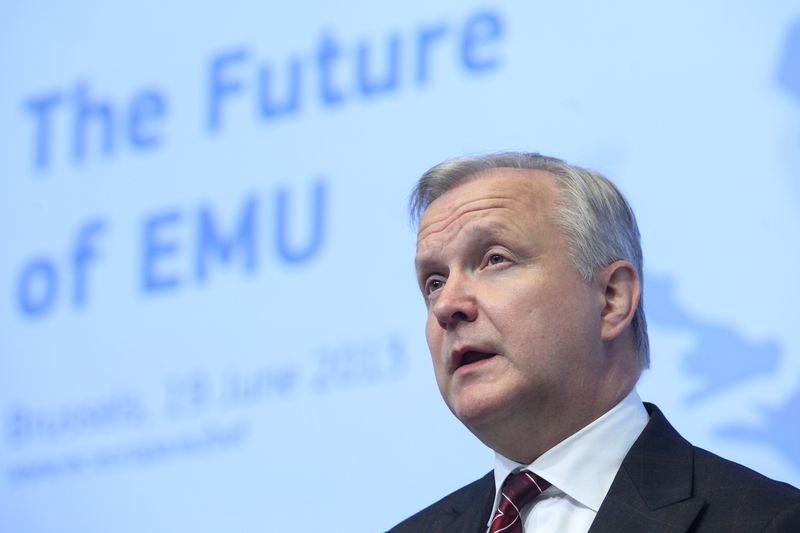 Olli Rehn | © European Commission
Olli Rehn | © European CommissionWhich Is The 3rd Largest Euro Area Economy? Berlusconia
In the United States the Tea Party holds the government hostage, while in Italy until last week Enrico Letta's cabinet was (is?) held hostage by Silvio Berlusconi - probably the biggest political ego in Europe since the end of World War II. And if the US's political and financial instabilit ...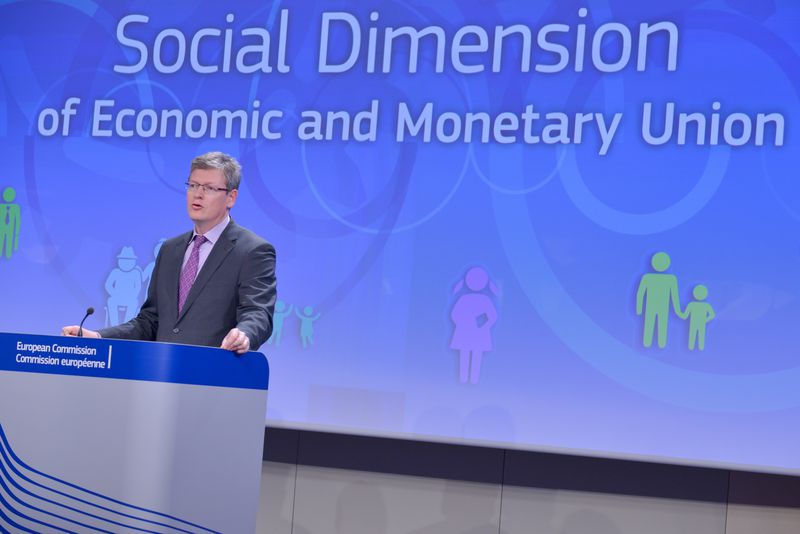 László Andor | © European Commission
László Andor | © European CommissionEU's Social Pillar - the Last of the Mohicans of National Sovereignty
In February 2012, the governor of the European Central Bank, Mario Draghi, pronounced the famous European social model dead because of the huge youth unemployment which spread throughout EU. Later, in a separate article, Mr Draghi pointed out that the deepening of the European integration will n ...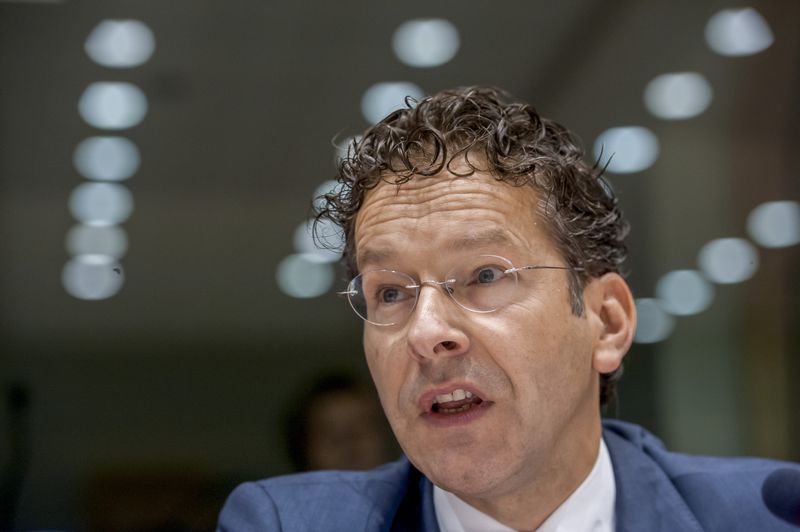 Jeroen Dijsselbloem | © European Parliament
Jeroen Dijsselbloem | © European ParliamentThe Beginning of Season: with Very Green Economic Growth and a Lot of Work To Do
The autumn has begun in the EU with two key messages. We are already moving away from the crisis talking and are moving toward discussing structural issues is the first, conveyed by Eurogroup chief Jeroen Dijsselbloem during his hearing in the economic committee of the European Parliament on Sep ...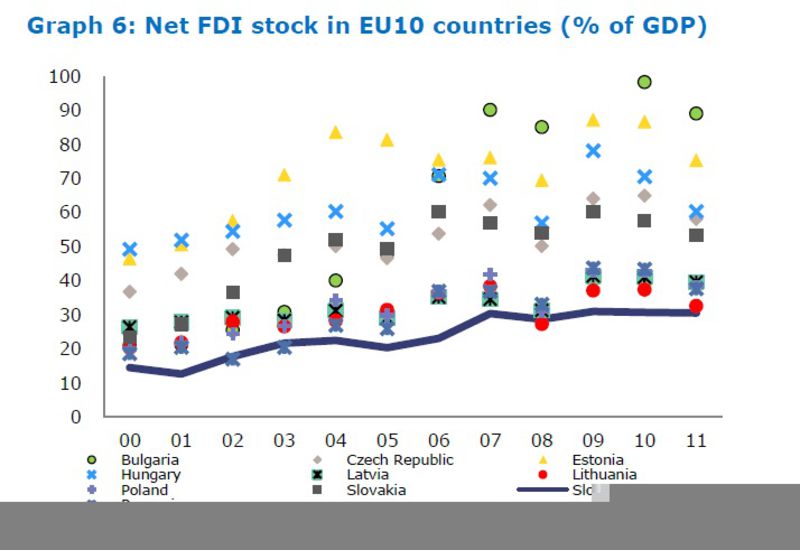 | © European Commission
| © European CommissionSlovenia's Problem
Did you know that the Republic of Slovenia owns directly or indirectly shares in at least 80 companies the book value of which, according to 2011 data, is 8.8 billion euros or a little over 24% of the country's gross domestic product? Injecting public money for direct recapitalisation or payment ...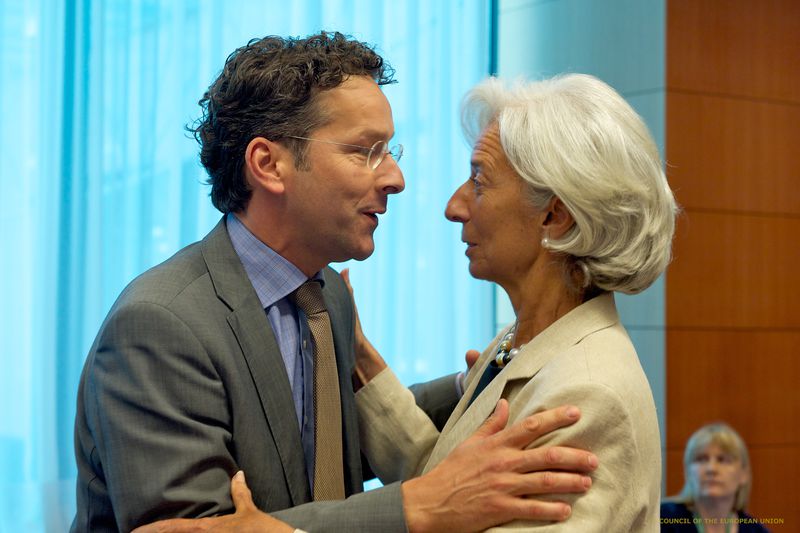 Jeroen Dijsselbloem, Christine Lagarde | © Council of the EU
Jeroen Dijsselbloem, Christine Lagarde | © Council of the EUIMF Again Turns toward Eastern Europe
Against the backdrop of the debate about crises, defaults, for or against austerity measures, about the good and bad examples, the International Monetary Fund again thought about Central and Southeastern Europe and the experience the countries from that region have from the beginning of the 1990 ...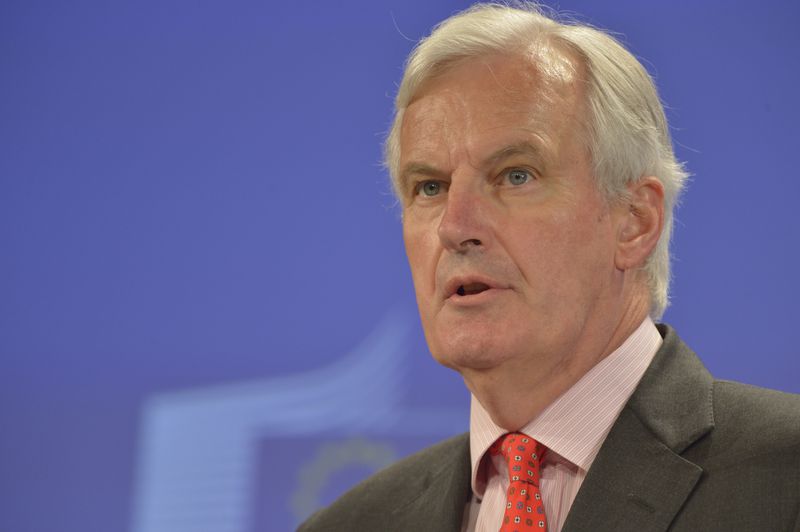 Michel Barnier | © EU
Michel Barnier | © EUAnother Brick in the Banking Union's Wall
Yet in December it was clear that the member states, and most of all Germany, are not dying to deepen the European integration mainly due to the lack of a clearly expressed consensus on how should the painful measures be applied. The constantly rolling story of Greece which, as it seems, will be ... Jose Manuel Barroso | © EU
Jose Manuel Barroso | © EUIMF Has Betrayed Its European Allies in the Austerity War
The IMF has begun admitting mistake after mistake, thus not leaving the European Commission any options to come out dry of the ever more expanding storm around its economic policies. Until recently an ally of the EU in its fight with the debt crisis and the domino of defaults of member states, t ...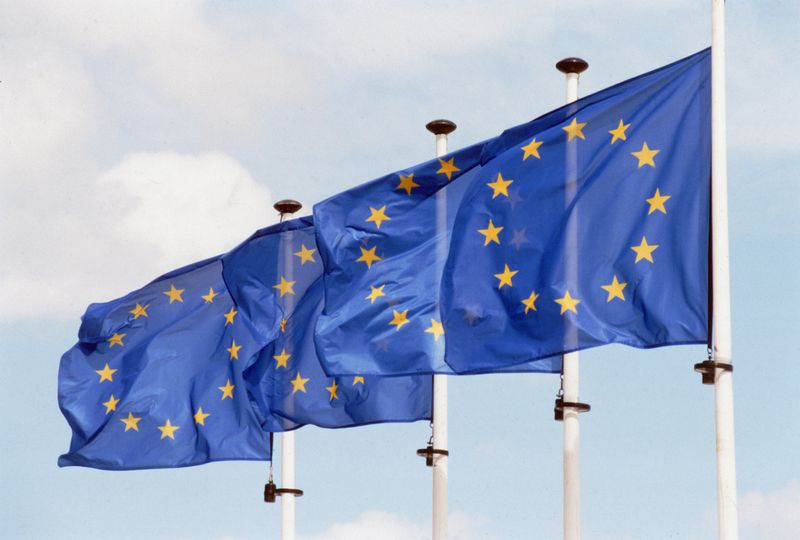 | © EU
| © EUThe Virus of Euroscepticism
No matter that it is organised matter, politics has some permanent objective laws. One is, that when years are tough populist parties flourish. They usually promise easily and more for the national interest, therefore for the ordinary citizen, his household, his pension, business, children, ... Jorg Asmussen | © European Parliament
Jorg Asmussen | © European ParliamentCommission and ECB against Eurogroup: There Is a Problem with Decision-Making!
"We have to recognise the structural problems of our decision-making in the area of economic and financial affairs. This calls for the completion of the Economic and Monetary Union, which should bring the current inter-governmental arrangements into the Community framework and strengthen the ext ...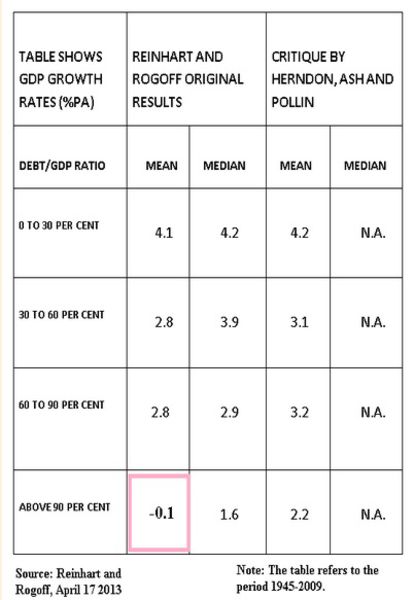 | © Reinhart/Rogoff
| © Reinhart/RogoffIt's Not the Austerity, Stupid, It's the Structural Reforms!
It is very difficult in an environment of rapidly gaining popularity populists to conduct policy of correcting past mistakes, which usually leads to social discontent and every now and then to early elections as well. Even harder that is in the framework of a very complex organism such as the Eu ... | © euinside
| © euinsideSpain and France Get an Extension for the Budget Deficit, but the need of Structural Reforms Remains
The European Institutions started to retreat under pressure from the anti-austeritists, but in the same time their voices have become stronger in calling that undertaking structural reforms and reducing budget deficits and public debts are not one and the same thing. And if for some Friday was C ... Beppe Grillo | © Beppe Grillo/Facebook
Beppe Grillo | © Beppe Grillo/FacebookPopulists - What Are They, Who Are They, Where Are They, Why Are They*
Populists and extremists are on the rise across Europe. Even Germany is now seeing the rise of a eurosceptic party. The euro crisis is the reason for growing political risk in the eurozone. Or is it? True, populist parties are more important in several euro countries. But the reasons for this ar ...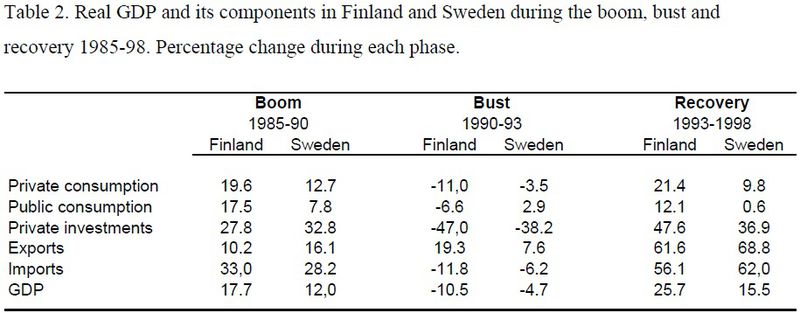 | © European Commission
| © European CommissionIt's Time for a Fair Integration in EU, Believes PM Jyrki Katainen
He is young - 41 years old. Married to a football player and in 2008 The Financial Times pronounced him the best minister of finance in Europe. This is the prime minister of Finland, Jyrki Katainen, who was another head of state to appear in Strasbourg to debate with MEPs his visions about the f ...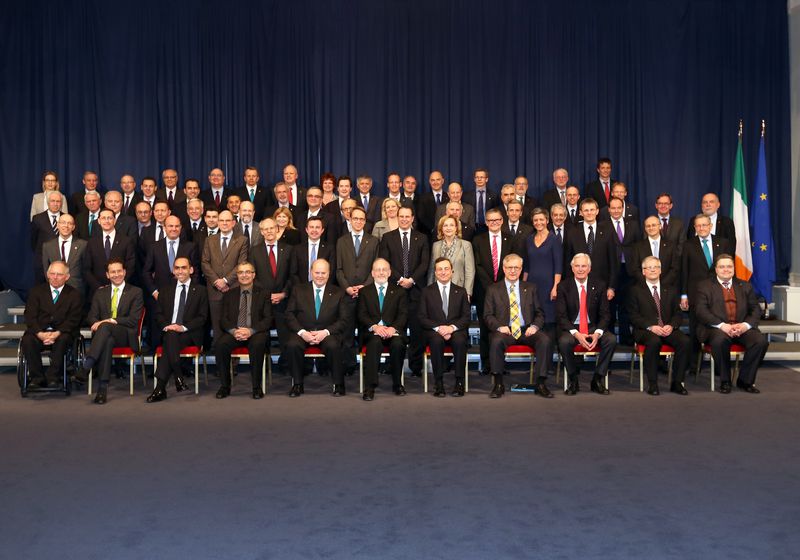 | © www.eu2013.ie
| © www.eu2013.ieIreland Is Preparing To Exit Bailout Yet This Year, Portugal Conceals Problems
Until the crisis in Cyprus, the situation in the euro area seemed under control and although everyone are aware that a long and difficult path lies ahead, after all the sun is shining and the end of the continuous debt winter is on the horizon. The situation with the Cypriot bailout, expected fo ...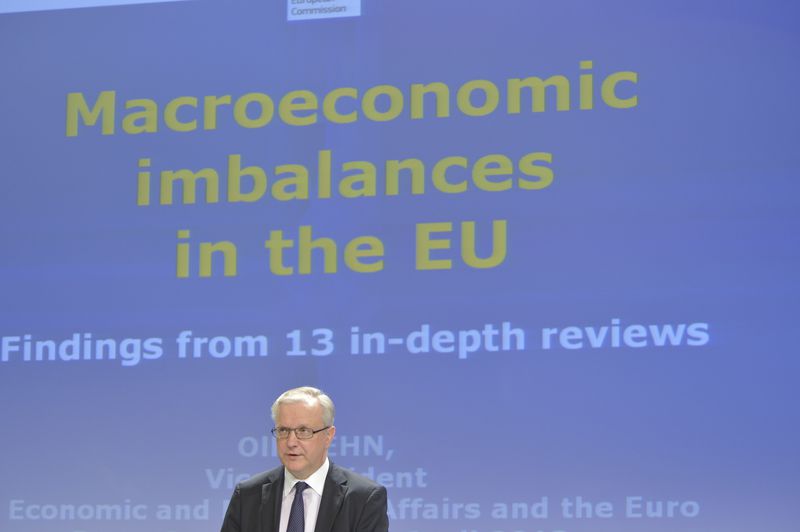 Olli Rehn | © EU
Olli Rehn | © EUThe Imbalances Procedure Reveals a Lot of Divergencies, But What's Common Is the Need for Reform
By publishing this year's in-depth reviews of the countries under the macro economic imbalances procedure, the European Commission again clearly says that the austerity policy is necessary and does not hamper a policy in support of economic growth. But the combination of the two seemingly contra ...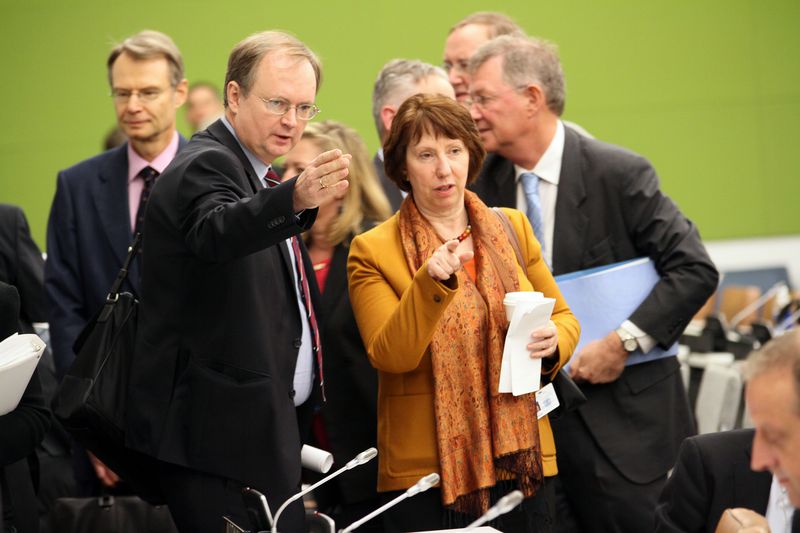 | © EU
| © EUWho Led and Who Slacked in EU Foreign Policy in 2012?
There will hardly be someone who could deny that the crisis has driven out to the sidelines the EU's common foreign policy and we got used to looking at it in that period as something that allegedly is there, but no one has ever seen to prove it exists. For a third year in a row, the European C ...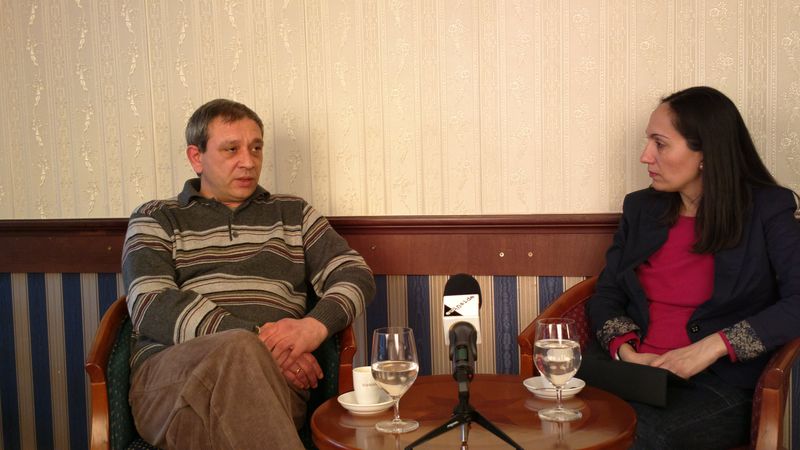 | © euinside
| © euinsideThe Crisis Is Only Visibly Fading, the Underlying Problems Remain
The eurozone crisis seems a bit distant from Sofia, the capital of the considered poorest EU member state Bulgaria. Distant because people here say they have lived in a constant crisis ever since the beginning of democracy in 1989. And may be this is the reason why one of the very few Bulgarian ...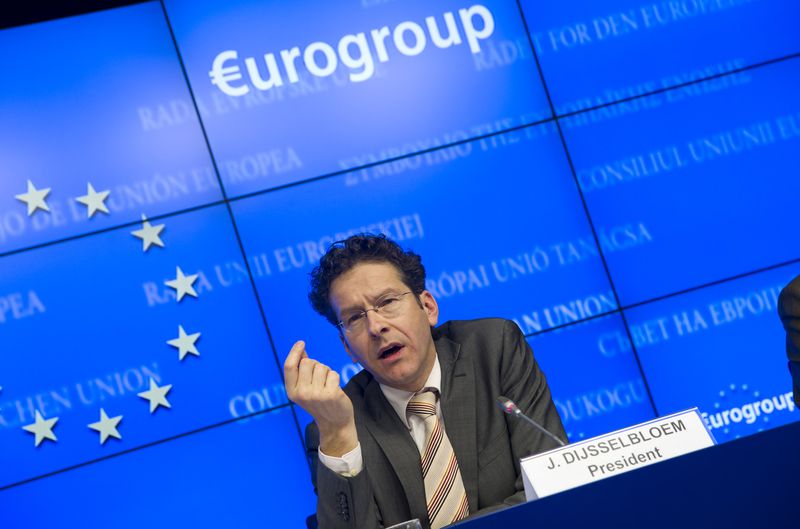 | © Council of the EU
| © Council of the EUCyprus Remains in EU's Orbit
When the German finance minister, Wolfgang Schäuble, said that Cyprus was not of systemic importance for the eurozone which was why there was no need to hurry bailing the Mediterranean island out, he probably had in mind only that if the country defaulted or left the eurozone that would have not ...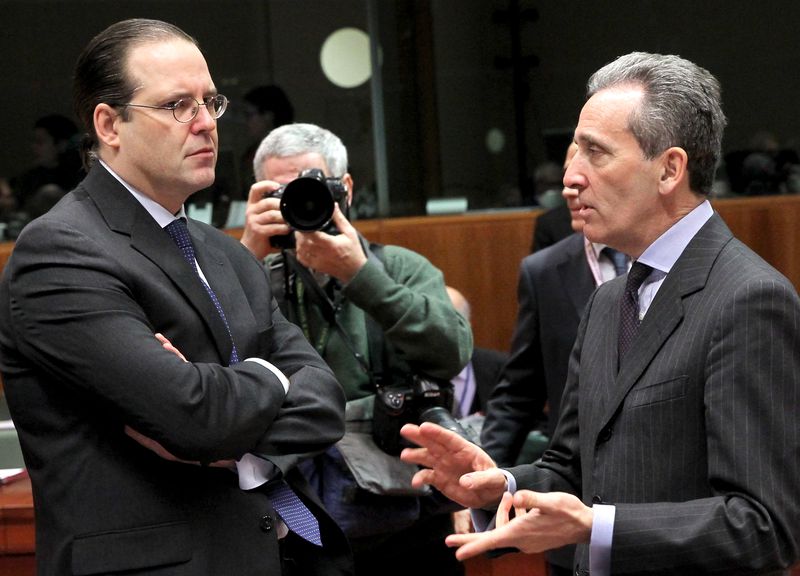 | © Council of the EU
| © Council of the EUToday Is A Good Day for the Basel III Capital Requirements
The EU is on its way to fulfil its international commitments and to introduce the Basel III rules for capital requirements but the question is when. This emerged from today's (March 5th) discussion in the EU finance ministers council on the compromise reached between the Council and the Europea ...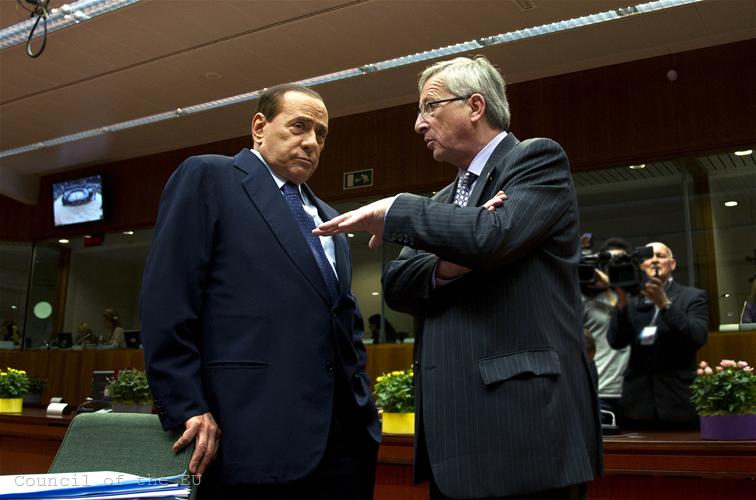 | © Council of the EU
| © Council of the EUItalian Affair for the Eurozone
Ever since the eurozone debt crisis has started and the reforms that in practise deepen the integration of the Economic and Monetary Union (EMU), more and more often comes up the question - what is missing? On the one hand, the member states are independent, but on the other they are pretty dep ...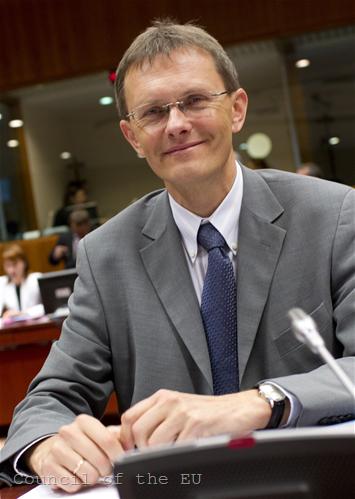 | © Council of the EU
| © Council of the EULatvia Advises: Use Your Heads and Do Not Listen To Nobel Laureates
Next week Latvia will officially apply for membership in the eurozone. Like the lonely Croatian EU accession, Riga's decision will hardly be an occasion for the red carpet and many fanfares, but the difference between the two lonely long distance runners (Croatia toward the EU and Latvia toward ... | © Council of the EU
| © Council of the EUCommission Pushes Forward Its Blueprint for the EMU
A very important piece of news on February 20th was replaced by another, more important news: after the European Parliament, the Council and the Commission have finally reached an agreement on the two complementary proposals aimed at completing the reform of the economic governance (the two-pac ...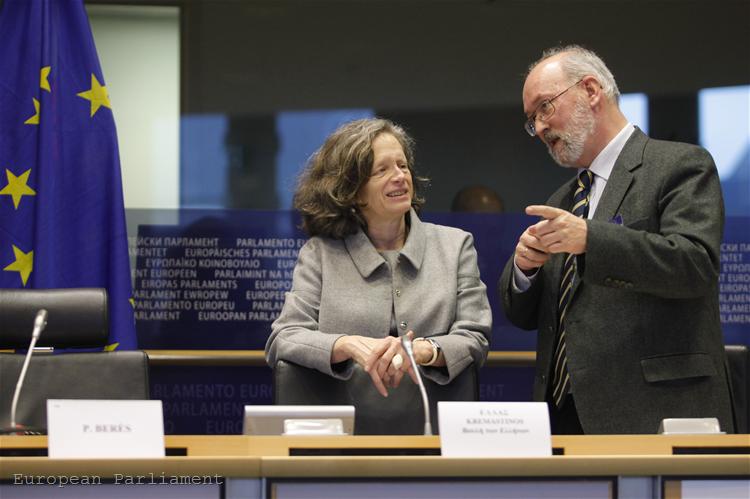 | © European Parliament
| © European ParliamentEuropean Semester 3: There's no North-South Division
The European Semester is entering its third year after it was created with the aim to overcome the economic crisis in the EU, caused by the too national economic policies of the member states against the backdrop of the scale of economic interconnectedness. And if in the beginning (2011) the mem ...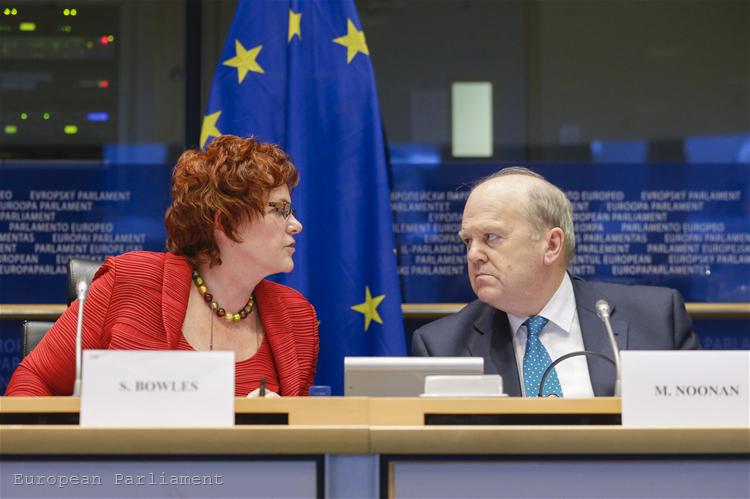 | © European Parliament
| © European ParliamentGrilli: Austerity Measures Are not an End, but a Means for Growth
As of last year the tradition finance minsters of EU member states to appear in hearings in the Economic and Monetary Affairs Committee in the European Parliament is strengthening. Although these events usually pass without much media attention, excluding the double hearing of France's and Germa ...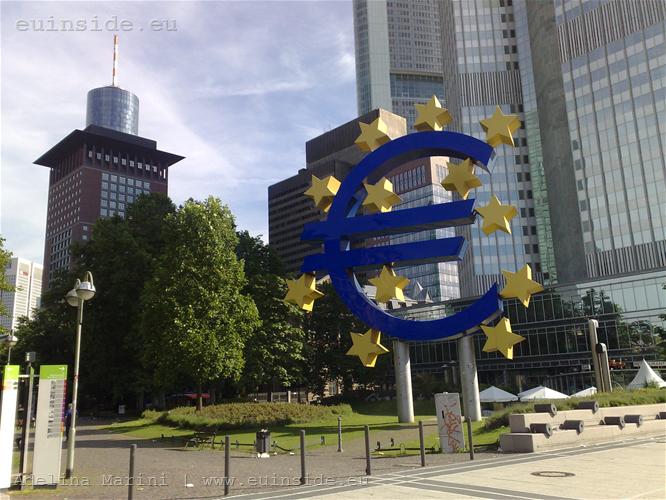 | © euinside
| © euinsideFor and Against a Common Eurozone Budget
One of the reasons why many analysts, politicians and decision-makers consider the EU summit in December a disappointment is that it gave away ambition. One of the most ambitious proposals that could be found in the drafts for the future of the EU and the euro area in particular of the Four Pres ...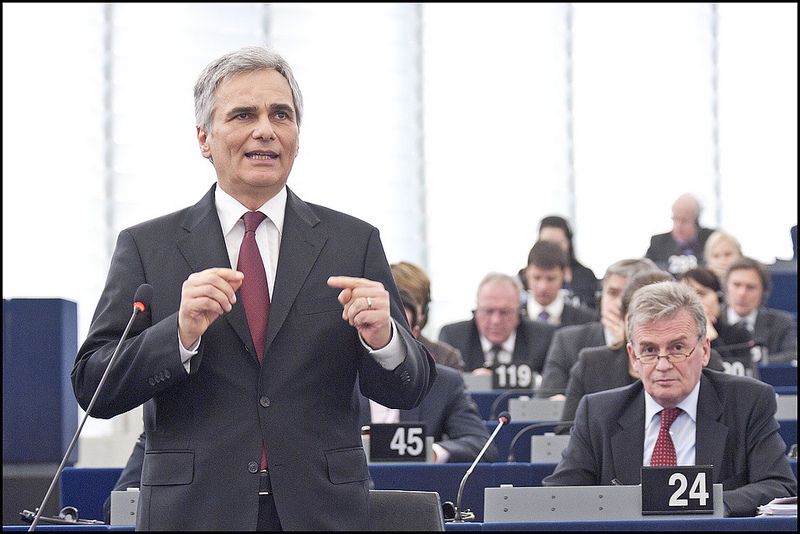 | © European Parliament
| © European ParliamentCasino "Europe"
The Europarliament, under the leadership of the German Socialist Martin Schulz, is trying to overjump itself creating a feeling of a genuine European parliament before which national leaders and leaders of EU institutions give an account of. The beginning was set in February last year when befor ... | © euinside
| © euinsideThe Visegrad Group Is on Its Way To Miss a Golden Opportunity*
When was the last time you heard an interesting Czech idea on how to revive European economies? Or a memorable Hungarian proposal on how to reform the EU? Of the Central European countries, only Poland has tried in earnest to initiate a debate on how to combat the economic crisis (by proposing, ...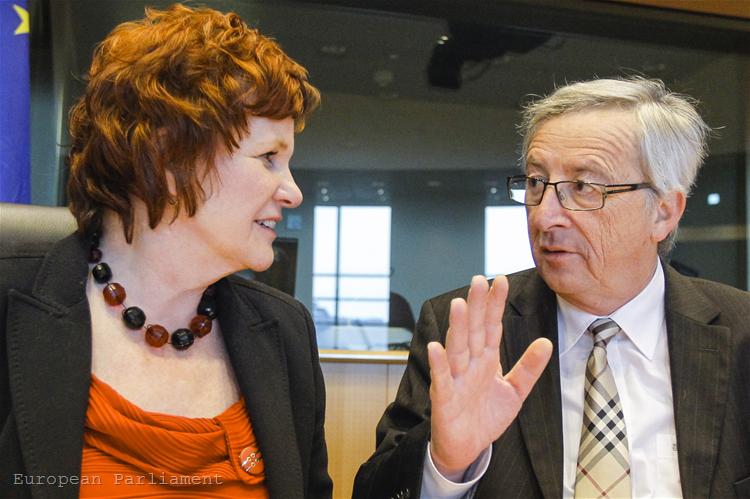 | © European Parliament
| © European ParliamentJuncker: the Next Eurogroup Chief Should Treat Eurozone and Non-eurozone Members Equally
The next Eurogroup chief for sure will speak a Benelux language (French, Dutch or German), said the Prime Minister of Luxembourg and Eurogroup President for only a few days more Jean-Claude Juncker during a farewell hearing in the economic affairs committee of the European Parliament on January ... | © euinside
| © euinside2013 Will Be the Year of Geoeconomics
Geoeconomics now sits alongside geopolitics when it comes to war, peace and prosperity. Economic statescraft now is a key component of global foreign policy and state capitalism is the main challenge to the free market. This one of the remarkable analyses in the forecast for 2013 of the influent ... | © euinside
| © euinsideIs the Celtic Tiger Coming Back?
Ireland's turn to head the Council of the EU (for a seventh time) as of the beginning of 2013 is quite a timely one. On the one hand, in 2013 Ireland marks 40 years of EU membership which can serve as a very good illustration to what the EU can do with countries that know precisely what they nee ...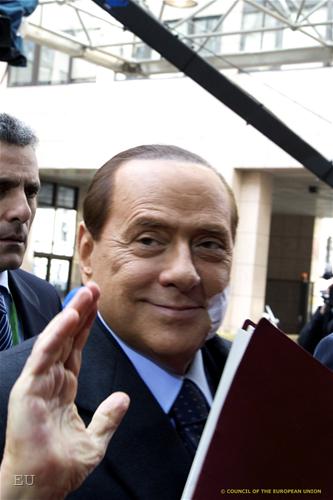 | © EU
| © EUMonti's Agenda - Can Italy Be Changed?
After a long, even too long hesitation, Mario Monti has finally decided to dive into Italian politics. His ambition is to change it by taking it out from the status quo of the 1990s to the realities of the 21st century. The Italian Prime Minister has been installed in the autumn of 2011 under pr ...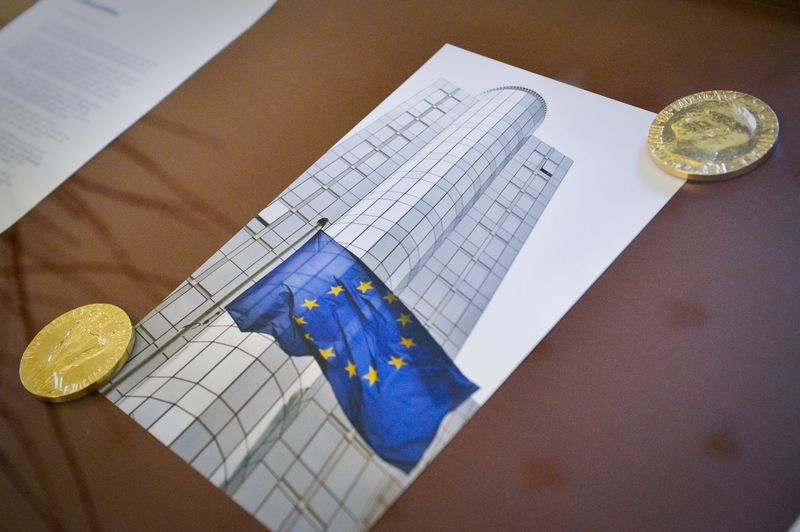 | © EU
| © EU2012 - the Year of Europe's Sobering
In the beginning of the year I wrote that the time of Europe of unification has expired and the moment of a responsible Europe has come. "A Europe that is aware what and why it should do. It is aware of the implications, they are planned and expected. A Europe that is prepared to react in tough ... | © EU
| © EUIMF for the First Time Made an Overall Assessment of the EU
The eurozone rescue from the severest crisis since the creation of the single European currency more and more resembles a bitter medicine of "deeper integration" (an euphemism of federalisation) which the EU has to take in small sips regularly and which with the first symptoms of betterment is b ...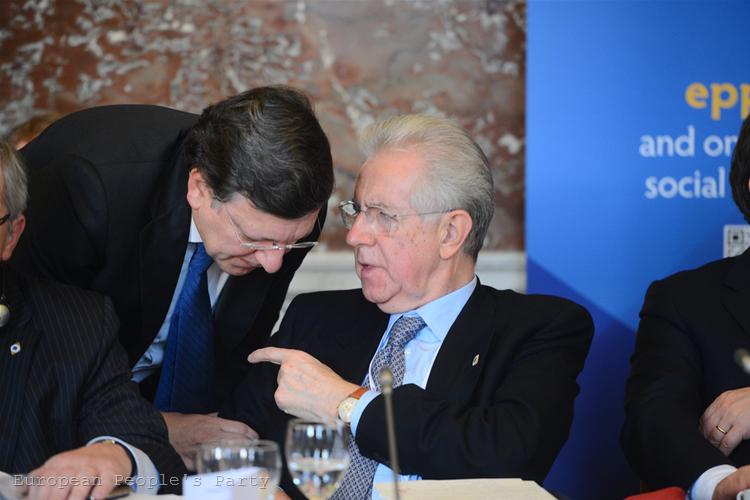 | © European People's Party
| © European People's PartyThe Montiless Italy
A piece of news is on its way to shake Europe even more than the Greek crisis - Berlusconi's return. Last week Italian Prime Minister Mario Monti announced that he would resign after Silvio Berlusconi's party (People for Freedom, PdL) stated it was withdrawing its support for him. The 76-year-ol ... | © EU
| © EUGreece Received a Commitment for a Carrot
"ESTRAGON: I'm hungry. VLADIMIR: Do you want a carrot? ESTRAGON: Is that all there is? VLADIMIR: There are radishes and turnips. ESTRAGON: Give me a carrot. ((Vladimir fumbles in his pockets, finds nothing but turnips, finally brings out a radish and hands it to Estragon who examines it, sniffs ... | © European Commission
| © European CommissionThe Eurozone, Core of a Political Union
The multi-faceted crisis currently rocking the countries of Europe and the solutions devised by the European institutions has, ironically, given a fresh impulse to the debate on "political union": this phrase is absent from the conclusions of the European Council meeting held in June 2012 but it ...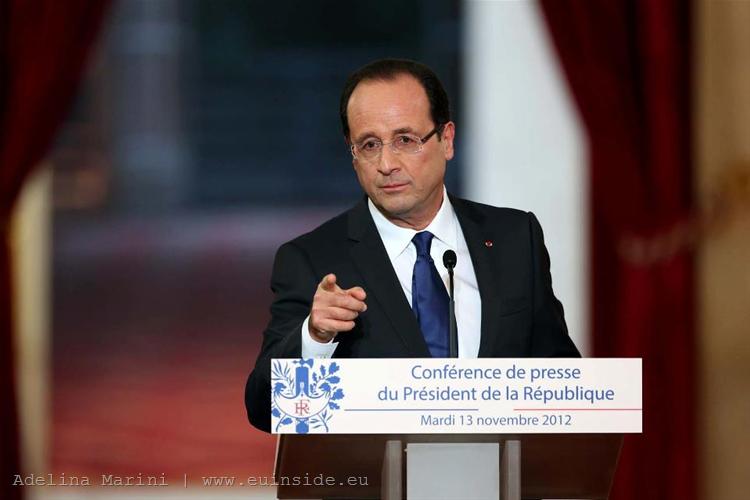 | © President of France
| © President of FranceFrance Will Reform at Its Own Pace
The Franco-German motor in the EU is not working in harmony and this is getting more and more obvious lately, as from the data for the French economy so from the relations between the two countries and the messages they convey to each other. The disharmony between France and Germany has culminat ... | © Nebojsa Tejic/STA
| © Nebojsa Tejic/STAElections in Times of Recession
"Pahor has succeeded, but will he make it in the coming three weeks?" This headline in the Slovenian Finance newspaper sums up in just a sentence the outcome of the presidential elections that took place in the country on Sunday (November 11th). If we follow up the events chronologically, they l ...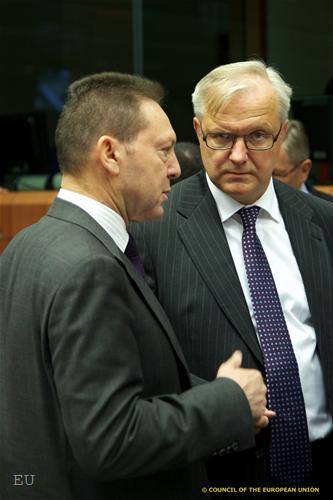 | © EU
| © EUGreece Supported Its Words with Deeds but Caused a Discord between EU and IMF
Greece is doing very well, but still a lot remains to be done, while the desire for compromises with the country seems depleted. This is one way to summarise the outcome of the very much expected meeting of the eurozone finance ministers (the Eurogroup) on November 12th. As usually happens in th ... | © EU
| © EUAnd Let the Upgrade of the Eurozone Begin Now!
By the last for this year EU summit in December the technical details on the establishment of the Single Supervisory Mechanism (SSM), considered the basis for the future banking union, have to be ready and the Eurogroup (the eurozone finance ministers) have to define the criteria for the direct ... | © EU
| © EUNothing Good on the Social Front
Just a month ago, for the purpose of the conference "More Jobs for Europe", summarised data about the social situation and employment rates in the EU were issued. All notifications that a new metamorphosis is already a fact are at place. After dealing a severe damage on the financial sector and ... | © The Council of the European Union
| © The Council of the European UnionAfter All the FTT Will Be Introduced, though not across the Entire EU
After long and tough negotiations, there is the news - the required number of countries willing to introduce a Financial Transaction Tax (FTT) in the form of enhanced cooperation is in place. So far seven countries have expressed their desire in formal letters to the European Commission - German ...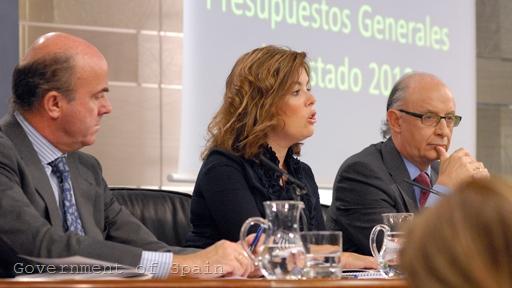 | © Government of Spain
| © Government of SpainMore Clarity Than Desire for the Banking Union
Spain at the moment is in a Hamlet situation, asking itself the question "To ask for a bailout or not to ask?". The government in Madrid made on Thursday, September 27th, another attempt to avoid a humiliating for the country and devastating as a strong earthquake for the eurozone, rescue loan, ...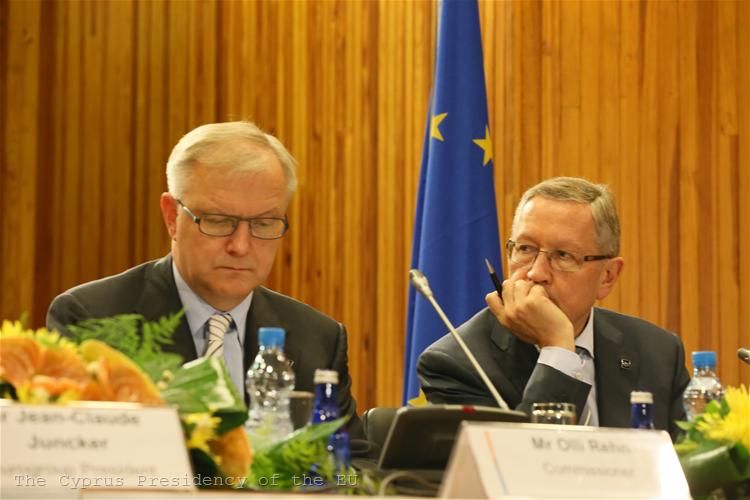 | © The Cyprus Presidency of the EU
| © The Cyprus Presidency of the EUPortugal Is Given a Sip of Breath, Spain Is Under Pressure
The permanent bailout fund for the eurozone - the European Stability Mechanism (ESM) - will formally start working on October 8, when the first meeting of its Board of Governors will be held, the fund's head Klaus Regling said. By the end of the month the fund will be fully prepared to finance p ... | © EU
| © EUThe Employment Crisis – a New Brussels' Priority
"The persistently worsening employment situation represents the biggest worry of European citizens and governments today, as well as a threat to Europe's medium-to-long term stability, competitiveness and prosperity. Between 2008 and mid-2012, the EU27 unemployment rate has climbed from around 7 ...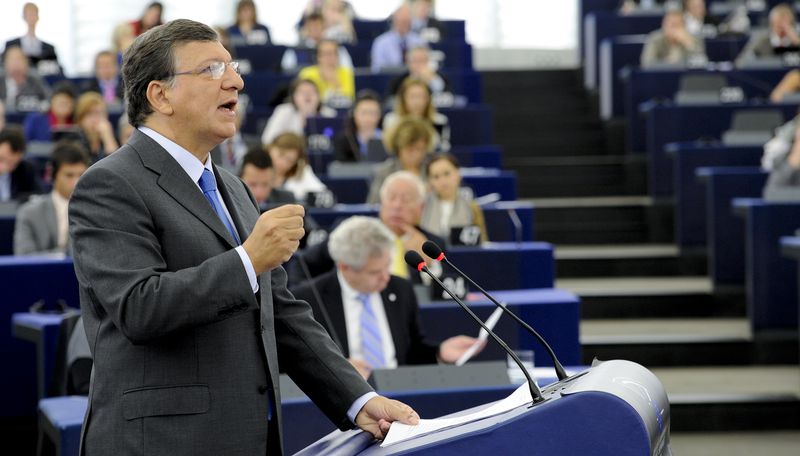 | © EU
| © EUBarroso Proposes a Decisive Deal for the EU
For a third time in a row, European Commission President Jose Manuel Barroso is borrowing lexis from the American political language. This year's, third in a row, state of the union address reveals full consistency with the visions of the former prime minister of Portugal about the future of Eur ...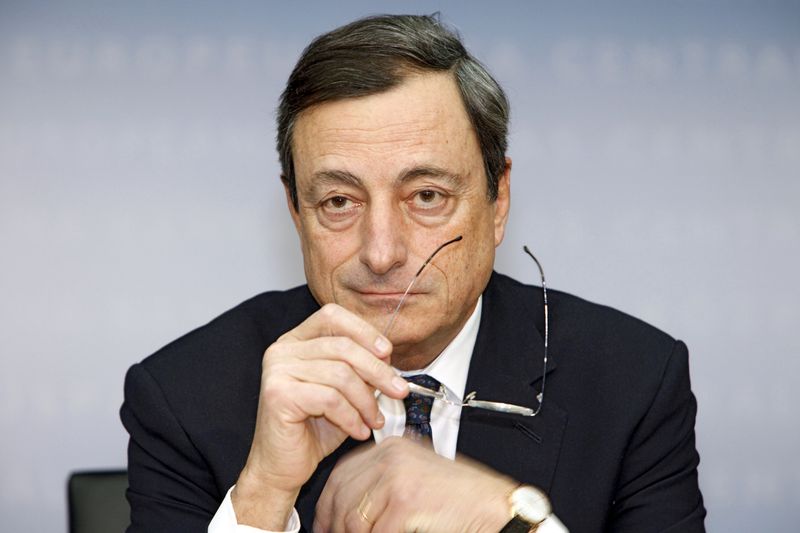 | © ECB
| © ECBDraghi Said: "Yes, but ..."
Yes, the ECB will buy sovereign bonds with maturity of between one and three years, and, yes - in unlimited amounts. But only if a country signs a macroeconomic programme with the eurozone rescue funds, which is a subject to strict conditionality. Failure to comply with conditions may result in ...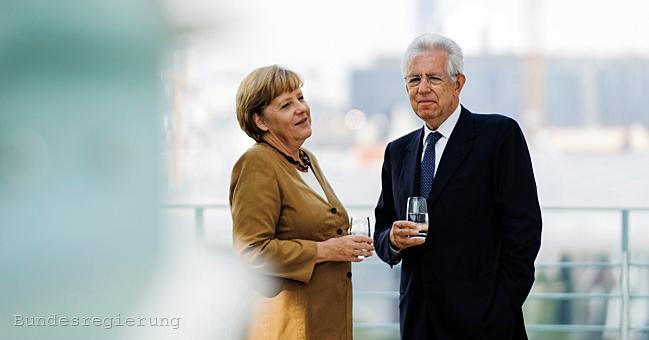 | © Bundesregierung
| © BundesregierungHow Far Are We Willing to Go?
The new political season in the European Union started at top speed with a series of bilateral summits. Greek Prime Minister Antonis Samaras launched a diplomatic marathon, followed by his Italian counterpart Mario Monti. He stopped in Brussels late on Tuesday, August 28, for a "coffee" chat (ac ...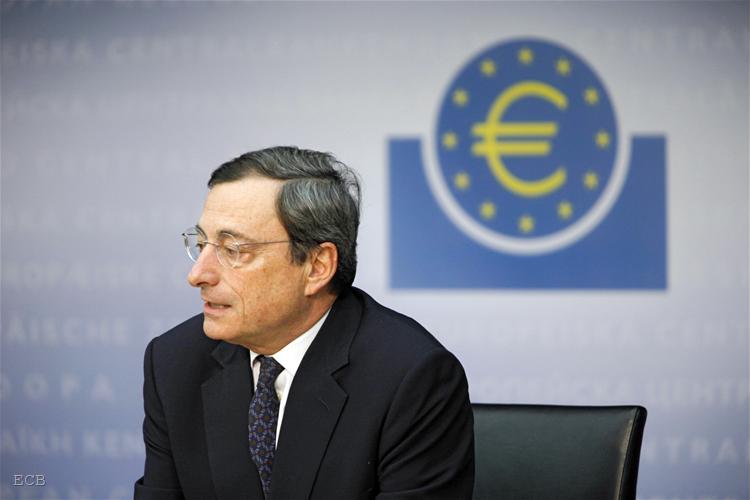 | © ECB
| © ECBThe Future of the Euro: Stability through Change
On the eve of the expected new proposals for deepening of the integration of the eurozone, Mario Draghi, European Central Bank president, finally summarised more clearly his messages, conveyed in the past weeks causing speculations in the public domain. On August 29th an article of his was publi ...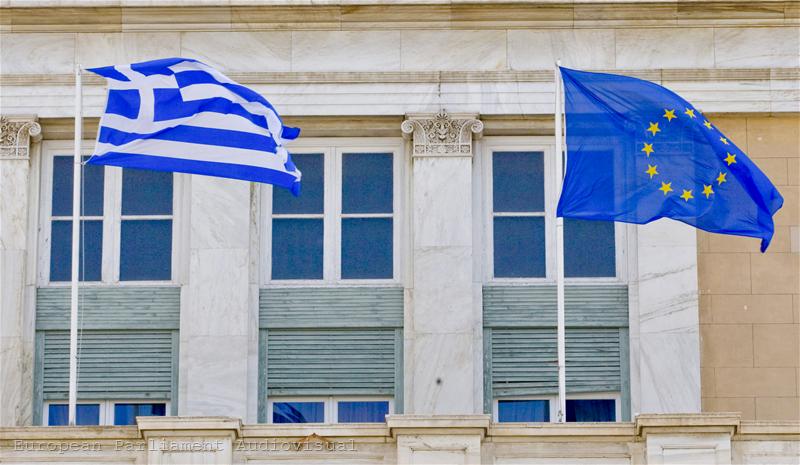 | © European Parliament Audiovisual
| © European Parliament AudiovisualGreece Could Have the Cake and Eat It Too, as well as the Eurozone
While expecting the life-giving tranche under its rescue loan, Greece has once again put the patience of its EU partners to the test by asking for the most expensive thing: more time. Although paradoxical at first glance, euinside`s forecast is that Athens would be given both more money and more ...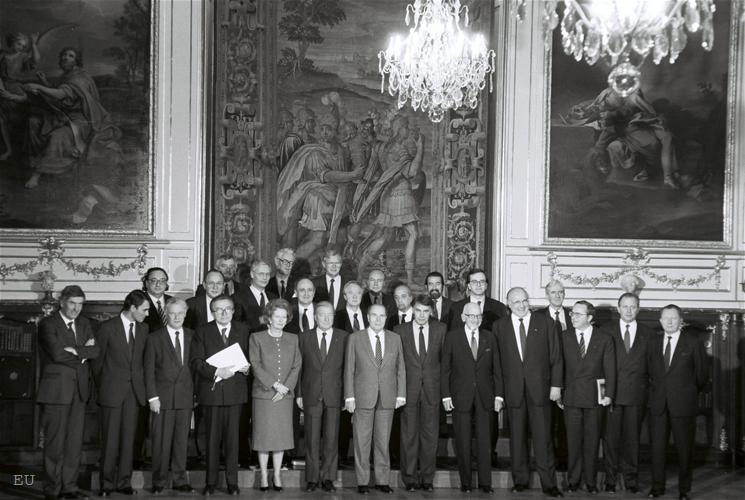 | © EU
| © EUThose Who Want a New Treaty, Step Forward!
First (from the beginning of the eurozone crisis) was the Euro Plus Pact, the purpose of which was to enhance coordination of economic policies of the EU member states. Then was the Fiscal Compact which is a much more legally binding document the purpose of which is to ensure strict coordination ...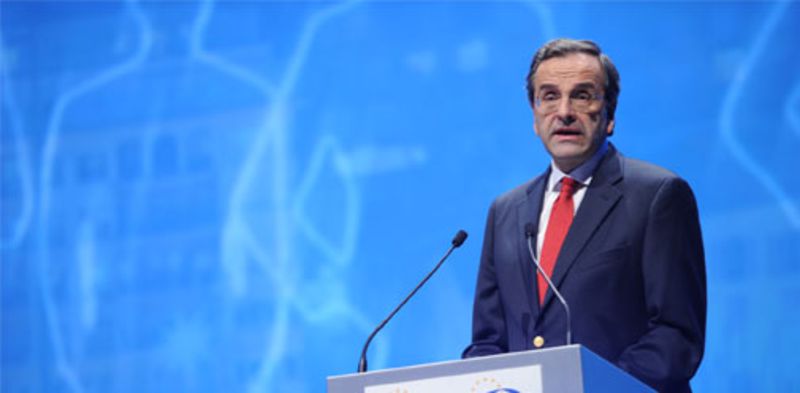 | © www.epp.eu
| © www.epp.euCan Greece Afford "Breathing Space"?
Greece does not want more money. Greece wants "breathing space" to achieve economic growth. Greeks are a proud people and do not want to depend on loans. With these messages, Greek Prime Minister Antonis Samaras started his campaign to obtain an extension for the implementation of the terms unde ... | © The European Central bank
| © The European Central bankThe EU Is Preparing a Second Generation Rescue Operation for Spain?
Every student in journalism and public relations knows an iconic example form the textbooks of how denying rumours can only lead to their consolidation as truth in the eyes of the public. This is the story of cosmetics company "Procter & Gamble". In 1981, a rumour spread that the company's logo ...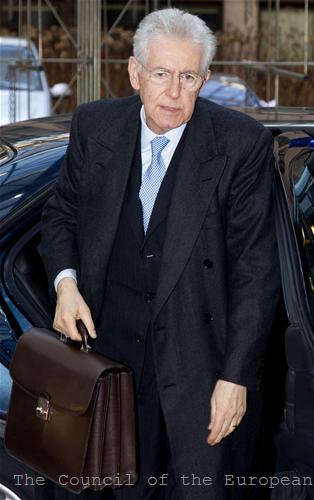 | © The Council of the European Union
| © The Council of the European UnionHow Much More Europe?
Unusually for August, the main topic in the German and European press is the holding of a referendum on European integration. Politicians from all political parties are competing to convince German voters that they will have the final say on the future of the EU and Germany's role in it. Already ...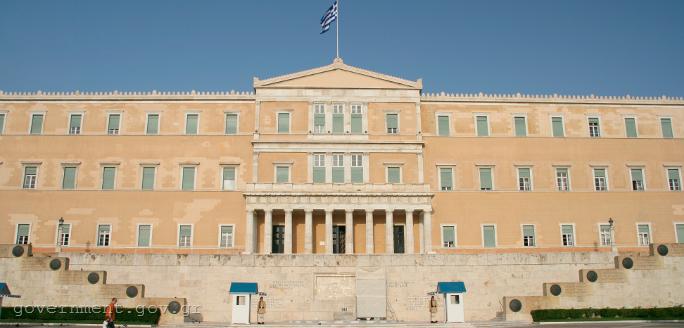 | © government.gov.gr
| © government.gov.grGreece Is Struggling for the Next Bailout Tranche
Greece will ask its creditors for two more years (until 2016) to implement the austerity measures agreed with the Troika, The Financial Times reported citing a document obtained by the newspaper. Prime Minister Antonis Samaras will discuss the matter with French President Francois Hollande and G ... | © European Central Bank
| © European Central BankDraghi: The ECB Cannot Replace Governments
"Go don`t know where and bring don`t know what!" In the spirit of this Russian folk tale sounded the statement of the European Central Bank that it "may undertake outright open market operations of a size adequate to reach its objective." Amid the expectations that the ECB will stand bare-breast ... | © European Union 2012
| © European Union 2012Barroso and Draghi Are Bailing Out the Euro Boat
"Sometimes I fear that some people have not yet understood that we are all in the same boat. We are really all in the same boat in Europe. That is why together, Greeks and all the other Europeans, should show the same resolve for the very important commitments that have been taken." With these w ...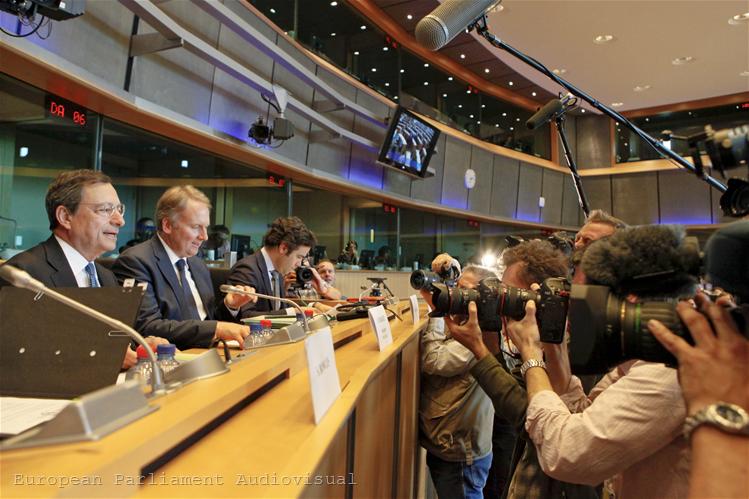 | © European Parliament Audiovisual
| © European Parliament AudiovisualMoney First, then Reforms or Vice Versa
This is how we can explain simply the dispute that is going on at the highest political level in the European Union for some time. Disguised with complex phrases and masked with values and ideals, in fact this is a dispute about money. Because all are aware that dealing with the crisis demands m ...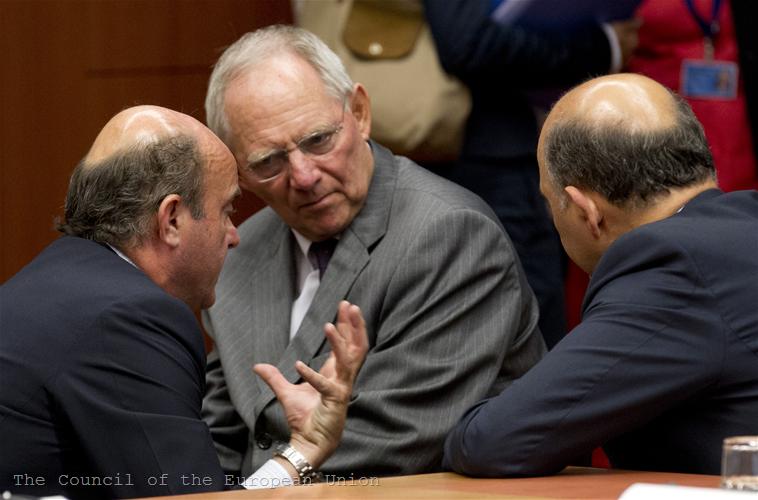 | © The Council of the European Union
| © The Council of the European UnionNo Sovereign Guarantees for the Spanish Bank Recapitalisation Loan
The loan to Spain will be finally approved by 20 July and the first tranche of 30 billion euros will be available to the country by the end of the month. This became clear at an early morning briefing of the Eurogroup. Although the eurozone finance ministers have already identified the maximum l ...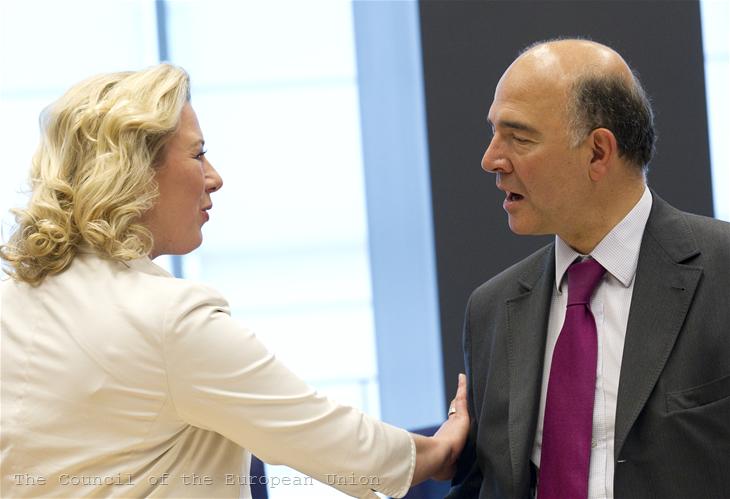 | © The Council of the European Union
| © The Council of the European UnionThe IMF Said: Bailout Funds to Pay Directly to Banks and Eurobonds to be Created
The most urgent task of the euro area is to break the vicious circle between sovereign debt and banks. To do so, the bailout funds (the provisional EFSF and from July also the permanent European Stability Mechanism - ESM) must be allowed to recapitalise banks directly, without going through gove ... | © European Parliament Audiovisual
| © European Parliament AudiovisualIs Grexit * (Im)Possible?
The outcome of the elections in Greece brought momentary relief but did not bring an answer to the main question: whether ultimately the country will remain or rather - if it could remain - in the eurozone. According to many, both Greece and the EU will only benefit if Athens leaves the monetary ... | © European Parliament Audiovisual
| © European Parliament AudiovisualEurope is Holding Breath Anticipating the Greek Choice
On Sunday, the Greeks have to vote again after the first election on 6 May left the country without a new government, and Europe without a clarity where to go. Since 6 May the EU has frozen all the important decisions until the results are known from the second Greek elections, an European Commi ...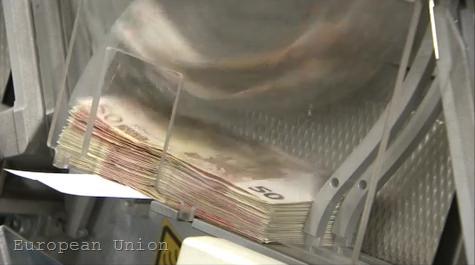 | © European Union
| © European UnionSpain Will Receive a 100 Billion Euro Bailout
The eurozone will grant Spain financial assistance targeted for bank recapitalisation, the Eurogroup announced on Saturday evening after an hour and a half conference call among the finance ministers. The government is expected to submit a formal request shortly that is going to be respected. Th ...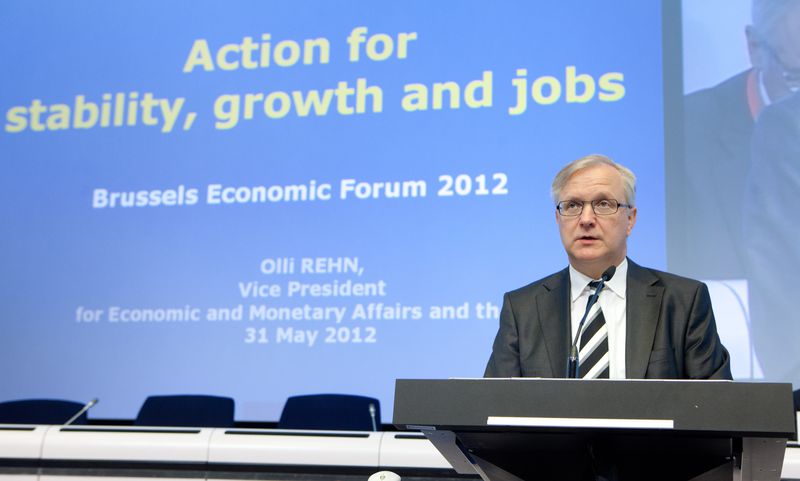 | © EU
| © EUCommission Proposes a Roadmap for Full Economic and Monetary Union
"The financial and economic crisis has underlined the interdependence between all EU economies, and between the EU and other world economies. It has also revealed important gaps, shortcomings and imbalances in global, EU and national policy-making". This is said in the beginning of the European ...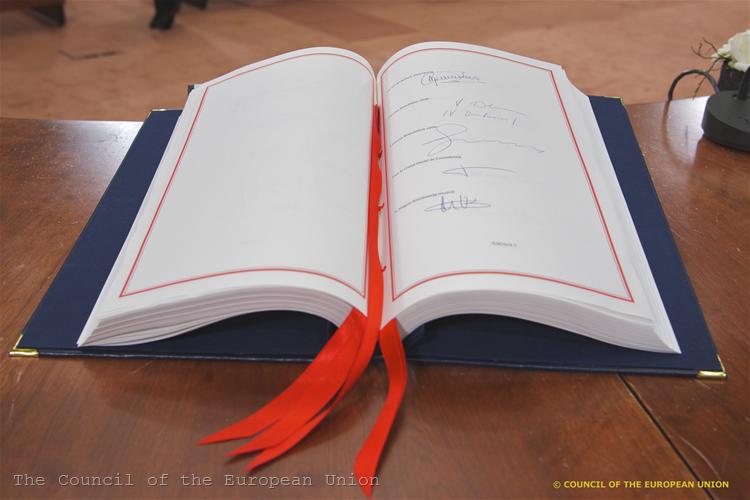 | © The Council of the European Union
| © The Council of the European UnionFear Vs. Anger in the Referendum in Ireland
On Thursday, May 31st, the Irish will vote in a referendum 'For' or 'Against' the so-called fiscal compact, as the Treaty on Stability, Coordination and Governance in the eurozone is known. The treaty was signed by 25 countries (excluding UK and the Czech Republic) and is currently in the proces ...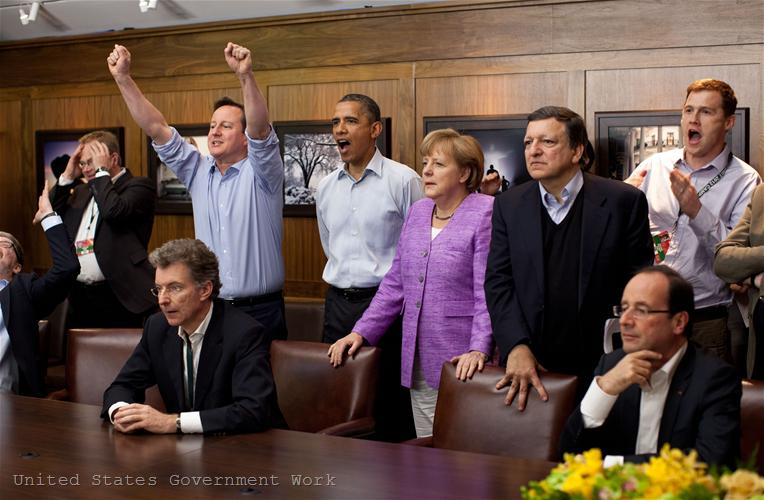 | © United States Government Work
| © United States Government WorkG8: Everyone Decides on Growth and Austerity Measures by Themselves
While Europe was holding its breath during the penalties that destined Chelsea to defeat Bayern Munchen in the Champions League final, the leaders of the eight most powerful countries in the world were also watching TV. The images of leaders, watching the football game were the most published an ...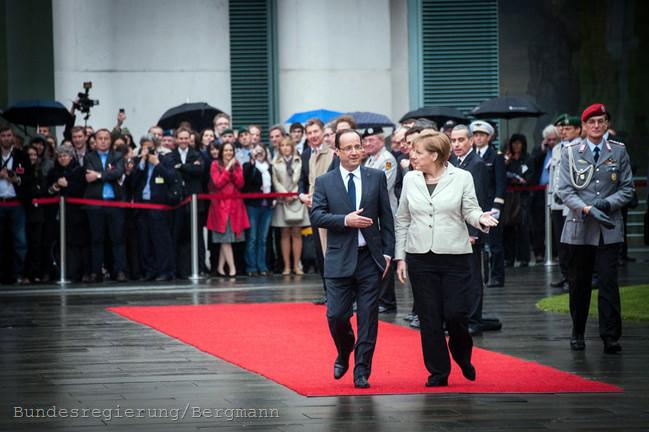 | © Bundesregierung/Bergmann
| © Bundesregierung/BergmannThunder And Lightning over the Euro Area
On the way to Berlin the plane of French President Francois Hollande was hit by a lightning and he had to return to Paris to change the plane. Ultimately, he managed to see Angela Merkel on Tuesday evening, just hours after officially taking office. As the French president explained to the media ...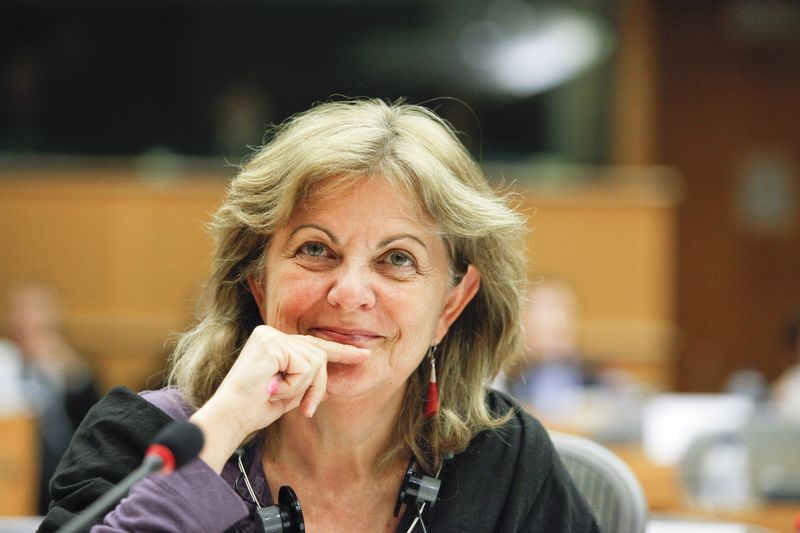 | © European Parliament Audiovisual
| © European Parliament AudiovisualThe New Measures for Disciplining the Eurozone Passed Narrowly by the ECON
MEPs from the Economic Committee (ECON) of the European Parliament adopted the so-called 'Two pack', which is part of the new legislation aimed at strengthening the EU economic governance. Because of a fragile majority, however, lawmakers decided not to enter into negotiations with the Council b ...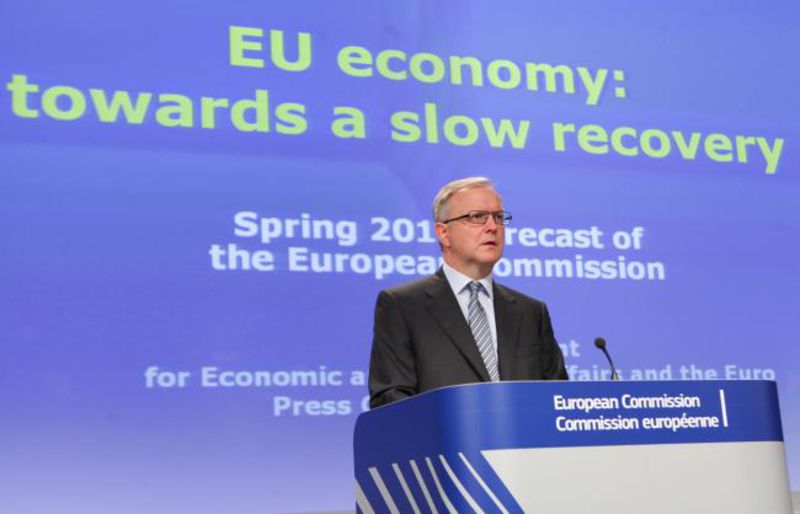 | © European Union 2012
| © European Union 2012Brussels: The Course of Austerity Must Go On
It cannot get worse, the pessimist said. Yes, it can, the optimist replied. The optimist in this case is the European Commission, which has presented its spring economic forecast. Our previous forecasts were criticised of being too pessimistic but unfortunately they were confirmed, European Econ ...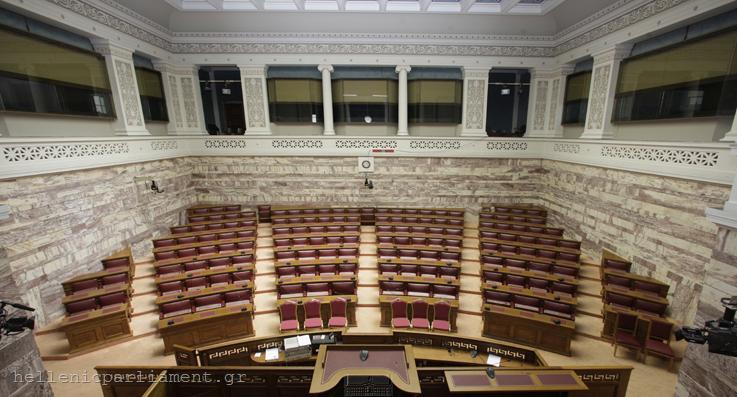 | © hellenicparliament.gr
| © hellenicparliament.grGreece is Heading towards New Elections - A Forecast That Has Come True
19:17 The latest attempt to form a coalition government in Greece collapsed and the country is going to new elections, as euinside predicted a week ago. On Wednesday, 16 May, the president will appoint an interim government and elections will take place on 10th or 17th of June, the BBC reporte ... | © European Union
| © European UnionAusterical* Crisis in Europe
The word austerity is so deeply rooted in my dictionary that I do not even think how to translate it into Bulgarian. There is simply no sufficiently eloquent equivalent. And since the word has become popular also in terms of corporate and family budgets, I have come to the conclusion that everyt ... | © IMF
| © IMFIMF and G20 Unlocked Their Coffers for the Eurozone. USA Is Holding Back
The question, whether the eurozone firewall is sufficiently big, does not matter any more because at its spring meeting the IMF board agreed a double increase of its lending capacity together with the G20. The participation of countries outside the euro area or even outside the EU was expected e ...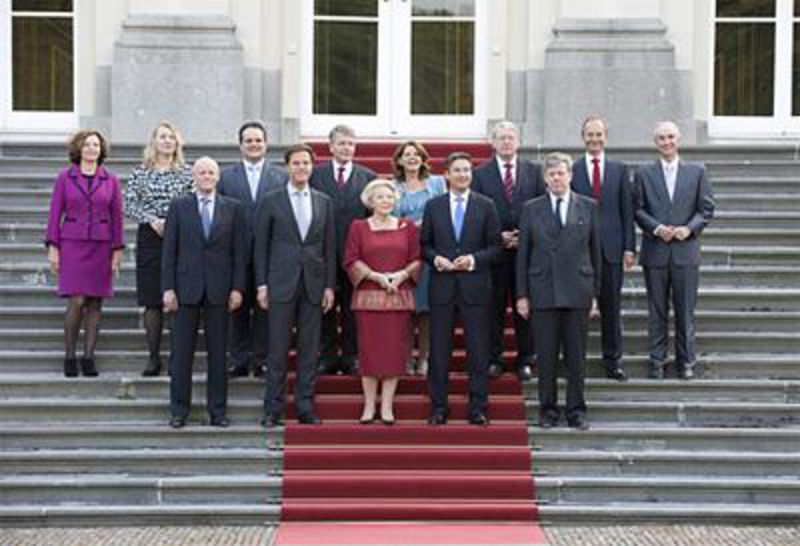 | © www.government.nl
| © www.government.nlDutch Government Paid Dearly for the Populists` Support
In June 2010 the Netherlands became the first country in the eurozone that changed its government after the debt crisis in Europe broke out, though not for economic reasons - the then ruling coalition between the Christian Democrats and the Labour Party fell apart because of the Labour Party's ... | © www.ecb.int
| © www.ecb.intGrowth for Greece, but at a High Price
On 18 April the European Commission issued a Communication, setting out the measures to promote growth of the Greek economy. In fact, there is nothing new in the Communication - it summarises the main areas where reforms are necessary, as stated in the Memorandum of Understanding on the second G ...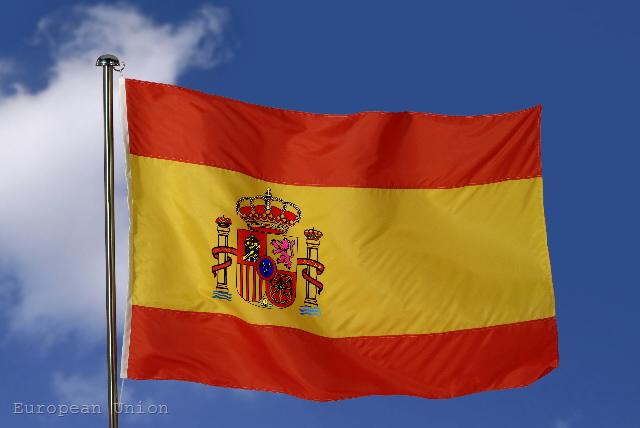 | © European Union
| © European UnionWhen Will Spain Request a Bailout?
The high borrowing costs on the Spanish 10 year yields, which another week in a row are circulating around and above the critical for the eurozone 6% (the boundary at which the country is expected to request a bailout), reaffirmed the feeling the the eurozone crisis is back with new impetus afte ...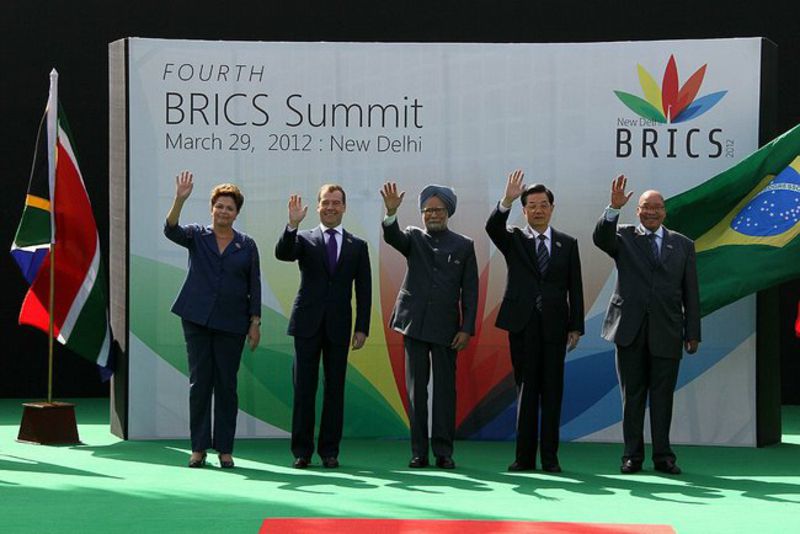 | © Kremlin
| © KremlinBRICS Countries Will Establish Their Own Bank
Two events from end-March spark a very deep deliberation about the capabilities of the eurozone rescue funds to ensure the so much needed global security and gradual exit from the debt crisis. The first event is the summit of the BRICS countries (Brazil, Russia, India, China and South Africa) in ...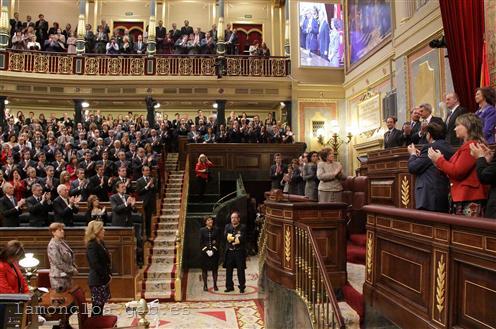 | © lamoncloa.gob.es
| © lamoncloa.gob.esSpain Cuts Costs, but Is It Enough?
The most severe budget in over 40 years - this is how the Spanish government defined its 2012 budget, presented to Parliament on 3 April. The budget has one big goal - deficit reduction to 5.3% from the current 8.6%. The consolidation effort amounts to a total of 27.3 billion euros or 2.5% of GD ... | © Wikimedia Commons
| © Wikimedia CommonsLisbon Story with Balkan Lessons
Amid rumours that Portugal will follow the Greek example and will request a second bailout, the European Commission`s report on the third review of the Portuguese adjustment programme is impressive. And the differences with Greece are more than obvious. It is not that Portugal is flourishing or ...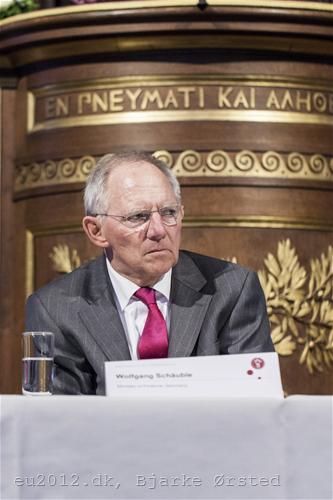 | © eu2012.dk, Bjarke Ørsted
| © eu2012.dk, Bjarke ØrstedHow Strong is the Euro Area Firewall?
The eurozone firewall will amount to 800 billion euros and not a cent more. This is exactly the amount stated by German Finance Minister Wolfgang Schaeuble on the eve of the informal meeting of the eurozone finance ministers in Copenhagen on 30 March. The amount is disappointing against the back ... | © European Parliament Audiovisual
| © European Parliament AudiovisualThe Troika Sees High Implementation Risk for the Second Greek Bailout Programme
Greece has no plan "B" and must implement the bailout programme at any price. This message was repeated dozens of times by the representatives of the so-called Troika (the European Commission, the European Central Bank and the International Monetary Fund) to MEPs from the Economic and Employment ... | © European Union
| © European UnionWill Greece Become a State Beside Only a Name?
In the course of last year Greece was the most popular topic in European media. Sometimes it was due to tense late-night meetings of the European leaders,or to the European citizens` dissatisfaction with the need to pay Greek bills or the protests of the Greeks themselves against wage and pensio ...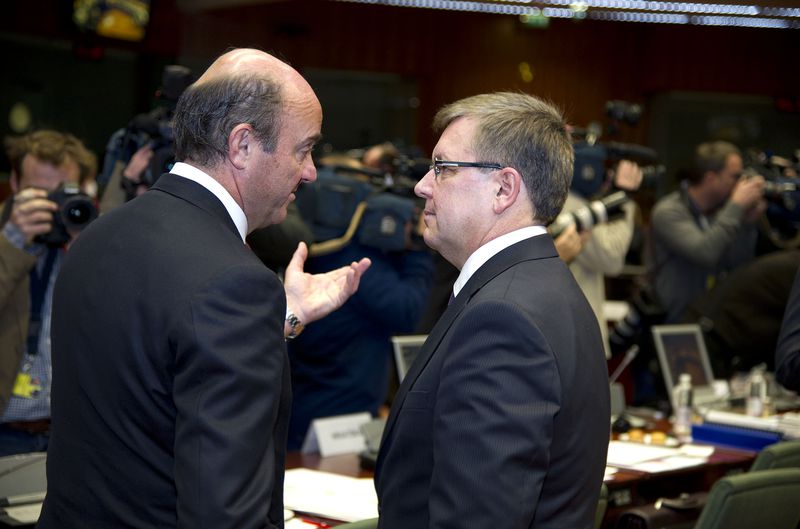 | © The Council of the European Union
| © The Council of the European UnionAre There Double Standards in the EU?
Two decisions of the European finance ministers provoked fluster and accusations of "double standards" and unequal treatment of countries in and outside the eurozone. The first decision, taken by the eurozone finance ministers (the Eurogroup), is to respect, though not entirely, the decision of ... | © EU
| © EUIvailo Kalfin: Taxpayers Could be Next to Write Off Greek Debt
The Greek chapter from the eurozone debt crisis for now is being closed after several very important stages have been completed to secure the second attempt for rescue of the country, although this second attempt should be called contained default rather than a rescue. After less than a year, o ...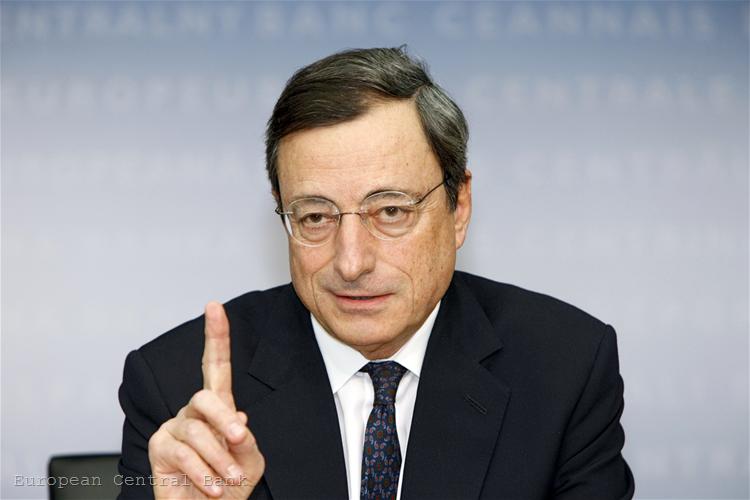 | © European Central Bank
| © European Central BankMario Draghi: We Are All in the Same Boat
"I think it's clear to everybody that if countries don't release some of their sovereignty about fiscal policy, there is no way they can be together. There's no way we can have one or two countries that pay for everybody else." These words belong to Mario Draghi, president of the European Centra ...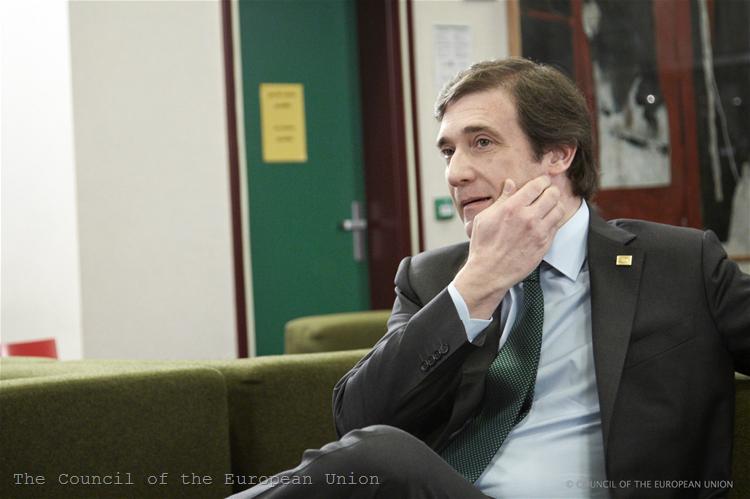 | © The Council of the European Union
| © The Council of the European UnionThe Crisis is Dangerously Smoldering in the Eurozone Periphery
The crisis in the periphery of the eurozone, although not raging as until recently, is dangerously smoldering. Events in the countries, pressed by debts and deficits and stifled by lack of economic growth, show that they are not out of the woods yet and the fire is likely to flare again. Greece ...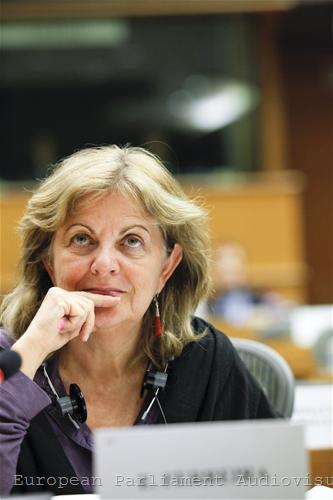 | © European Parliament Audiovisual
| © European Parliament AudiovisualMEPs Discuss Strengthening of Eurozone Discipline
The powers of the European Commission in terms of eurozone countries budgets and placing a country facing threat of default under 'legal protection' - these were the most discussed issues during the debate on the so-called 'Two Pack' in the economic committee (ECON) of the European Parliament. T ...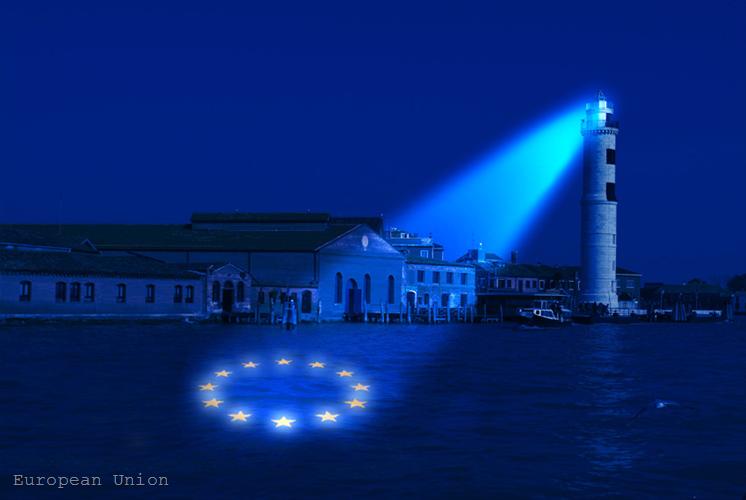 | © European Union
| © European UnionThe EU Adopted a New Regulation on Short Selling and Credit Default Swaps
The Council of EU finance ministers has approved a regulation on short selling and certain aspects of credit default swaps (CDSs). The adoption of the regulation follows an agreement, reached with the European Parliament, which approved it in November last year. The regulation provides for commo ...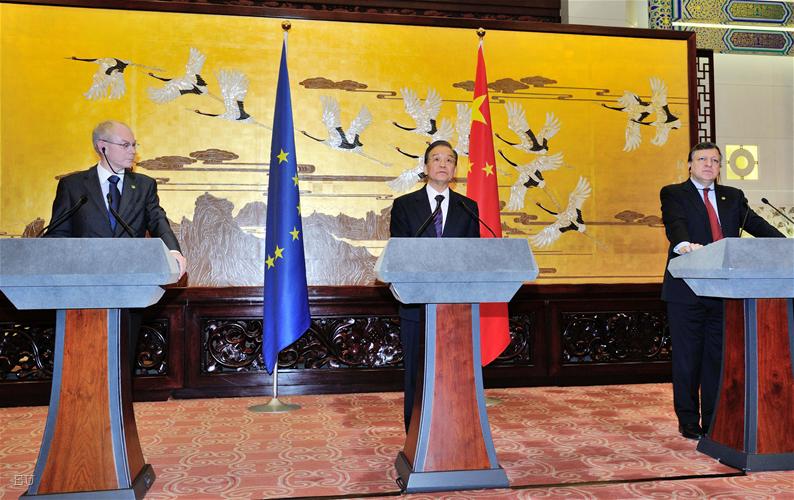 | © EU
| © EUIt Is Time China to Repay Europe for its Success
Several relatively clear messages the European leaders - Herman Van Rompuy and Jose Manuel Barroso - conveyed during the EU-China summit in Beijing on February 14th and received several not less clear answers. Alas, neither the messages nor the answers are backed by concrete commitments, but giv ...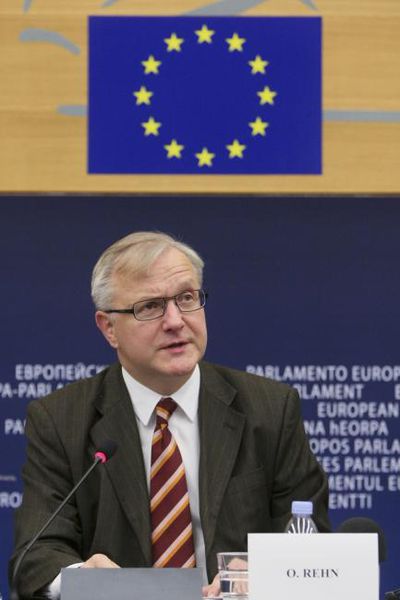 | © European Union 2012
| © European Union 201212 EU Countries under Enhanced Surveillance for Macroeconomic Imbalances
Private sector indebtedness, house prices, faster wages growth compared to productivity, and loss of export market shares - these are the risky points for the European macroeconomic stability, according to its first common assessment. For the first time in its history the EU has started a macro- ... | © EP
| © EPThe Good, the Bad and the Ugly for Greece
The growing tensions around Greece whether the country will receive the second bailout or not inflamed passions in the European Parliament on Wednesday morning during the regular plenary session of parliament in Strasbourg. Then, according to the schedule, three reports had to be debated related ...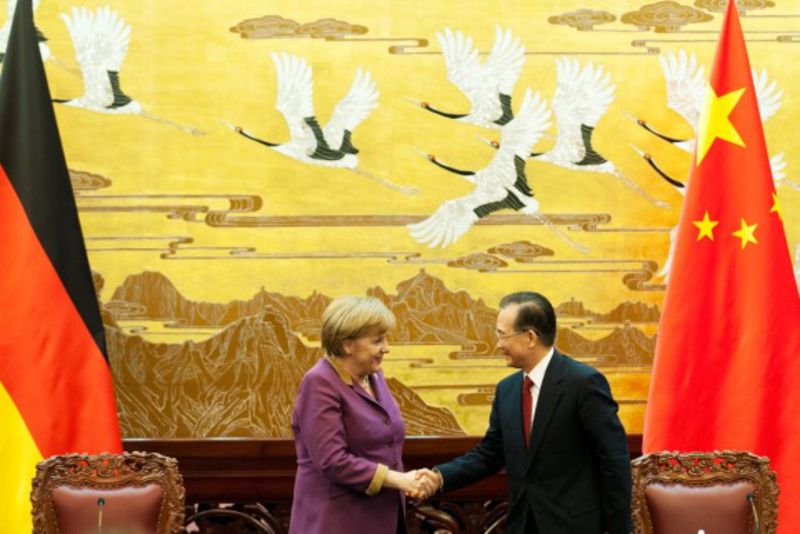 | © Bundesregierung
| © BundesregierungThe Year of the Dragon - Happiest for China, What About the EU?
Europe has made a dear sacrifice because of the debt crisis in the eurozone - its foreign policy weight. This is one of the main conclusions which the European Council on Foreign Relations (ECFR) is making with its annual European Foreign Policy Scorecard 2012. Even dearer it looks against the b ...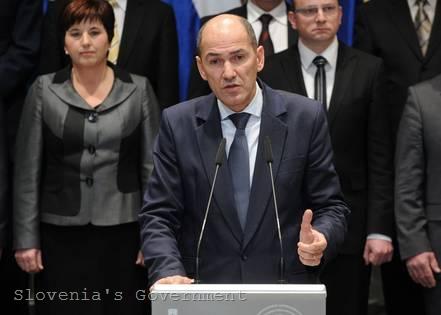 | © Slovenia's Government
| © Slovenia's GovernmentSlovenia’s New Government Set to Lead the Country Out of the Crisis
The political crisis is over, but the country is still experiencing a social and economic one, were the first words of the old new Slovenian PM Janez Jansa after on Friday (February 10) the parliament approved the 10th government of the country. Two months after the snap elections in Slovenia, J ...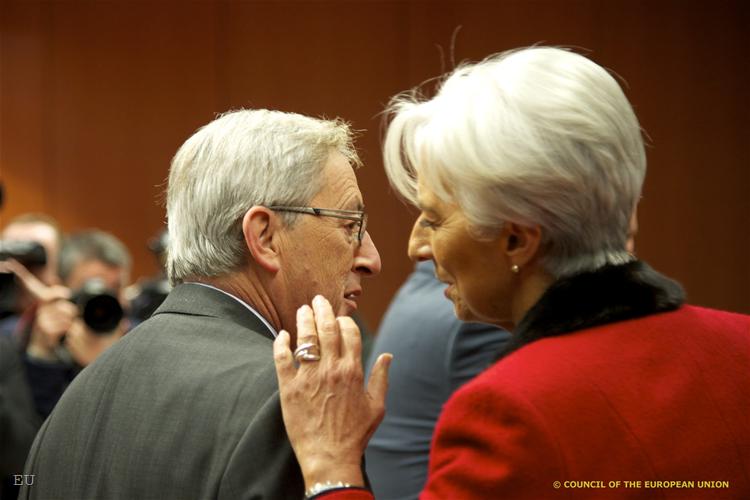 | © EU
| © EUMoney for Reforms for Greece
24 hours during which Greece has understood that it no longer has a way back. This is the briefest way to summarise the last two days, during which the drama of reaching an agreement between the parties in the Greek coalition government to implement the conditions for reforms and fiscal stabilit ...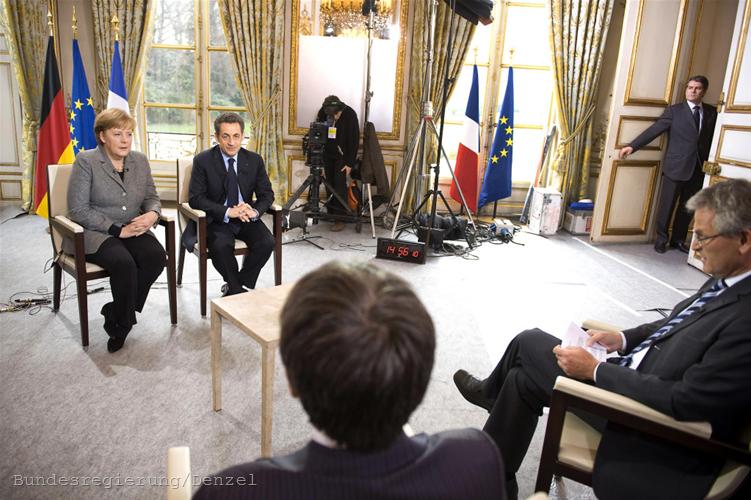 | © Bundesregierung/Denzel
| © Bundesregierung/DenzelMerkozy: Athens's Blackmail Must End!
On the eve of the European Council meeting on January 30 a rumour of a German proposal emerged Greece to submit its budget sovereignty to an EU Commissioner, as a condition to receive the second bailout. The proposal provoked strong reactions and was eventually swept under the carpet - until Mon ...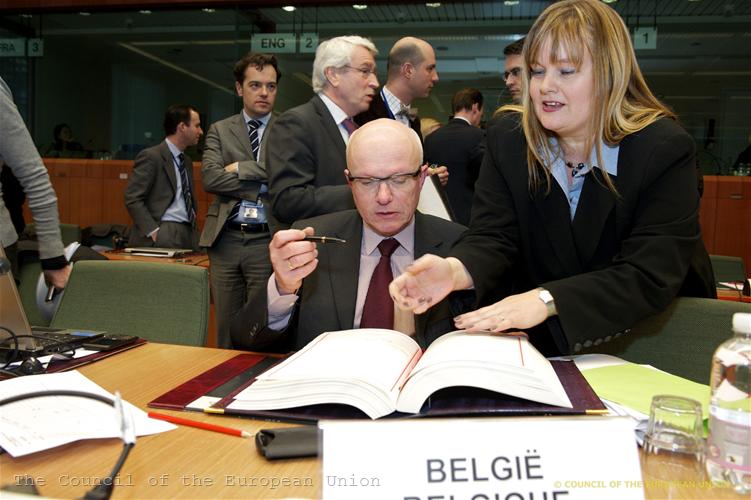 | © The Council of the European Union
| © The Council of the European UnionThe European Stability Mechanism Is Ready but It Is not Enough
On 2 February 2012, in Brussels, the ambassadors of the eurozone countries officially signed the Treaty on the European Stability Mechanism (ESM). The text of the treaty was finally approved by the EU leaders at their meeting on January 30. The fund will start functioning from July 2012 and will ...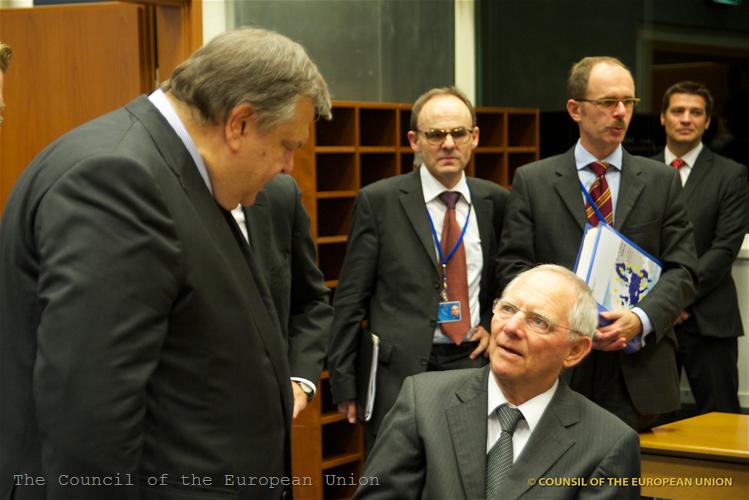 | © The Council of the European Union
| © The Council of the European UnionMore And More Money for Greece, the Second Bailout Is Expected within Days
Monday, February the 6th, was expected to be a decisive day for Greece. Then it was initially planned the finance ministers of the eurozone to approve the second bailout for the country, provided that there was a deal with the private lenders to write off 50% of the Greek debt and that Athens ha ... | © EU
| © EUWhat is Europe's Next Objective?
Let's finally face it - the time of Europe of Unification is over. Now is the time of a Responsible Europe (I am borrowing the name from the Danish Presidency, which has put Europe's responsibility on top of its 6-month long agenda). Europe, which is aware what and why it is doing. It is aware o ... | © European Union
| © European UnionFriday the 13th for the Eurozone
Standard & Poor's (S&P) downgraded 9 euro area countries, as the credit rating agency (CRA) gave to 14 countries a negative outlook, which means a further downgrade is possible. The ratings of Spain, Italy, Portugal and Cyprus were lowered by two notches. France and Austria lost their highest AA ...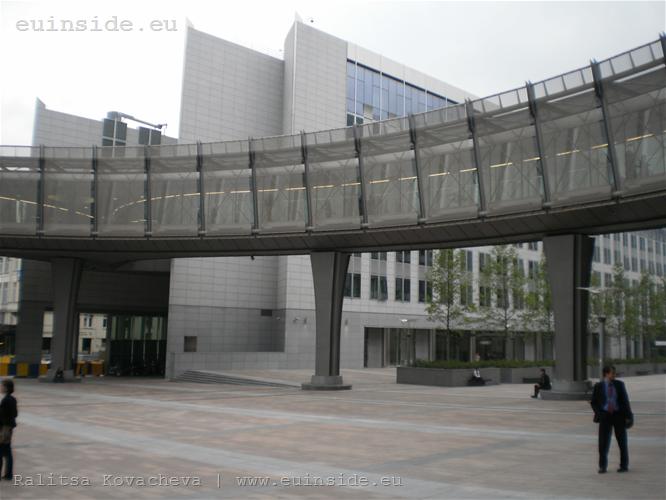 | © euinside
| © euinsideMEPs: The Commission Will Control National Budgets, But Who Will Control the Commission?
The Economic Committee in the European Parliament held its first discussion on the proposals of the European Commission from 23 November 2011, which complement and build upon the package for EU economic governance. As euinside wrote, one of the proposals is aimed at strengthening economic and fi ...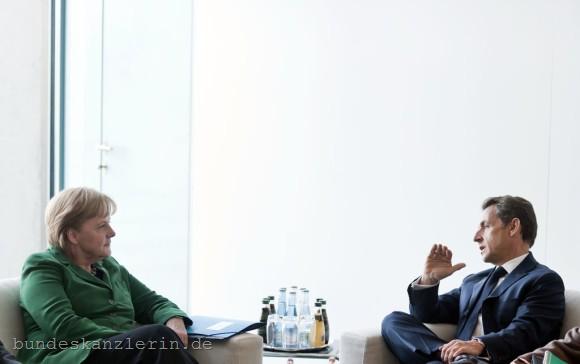 | © bundeskanzlerin.de
| © bundeskanzlerin.deSarkozy: The EU Fiscal Treaty Will Be Signed on 1 March
The negotiations on the fiscal compact are going well and there are good chances for it to be agreed by the end of January and signed on 1 March, the leaders of Germany and France, Angela Merkel and Nicolas Sarkozy, said. They met in Berlin for the first time since the beginning of 2012 to coord ...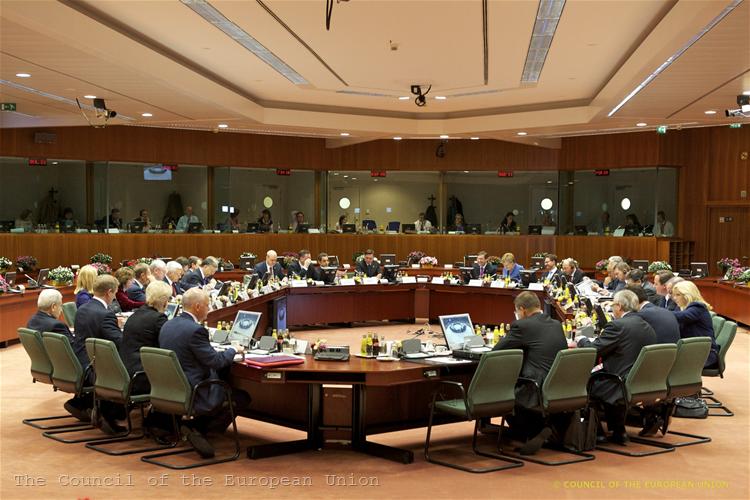 | © The Council of the European Union
| © The Council of the European UnionPolitical Fireworks Against the Debt Crisis
Nothing is decided until everything is decided. European leaders must remember that while discussing their ideas for changing the governance of the Union and especially of the euro area. Because at this stage it appears that, while trying to find lasting political solutions they are focused more ... | © euinside
| © euinsideThe Debt Crisis as Driving Force - a Lesson from Belgium
For the first time in more than 30 years a French-speaking politician will take the reins of a government in Belgium following an agreement between six parties from Flemish and Walloon blocks that were involved in coalition talks. The sides stroke an agreement on the programme of the new cabinet ...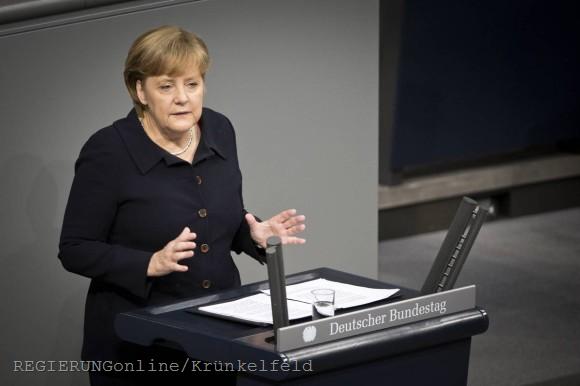 | © REGIERUNGonline/Krünkelfeld
| © REGIERUNGonline/KrünkelfeldThe Marathon Run of Merkel
The proverbial verse "Thinking of Germany at night/Just puts all thought of sleep to flight" belongs to the classic of German Romanticism Heinrich Heine. Yet, Germany that Heine mourns in 1843 is quite different from today's Germany. But still the Federal Republic provides enough reasons for ins ...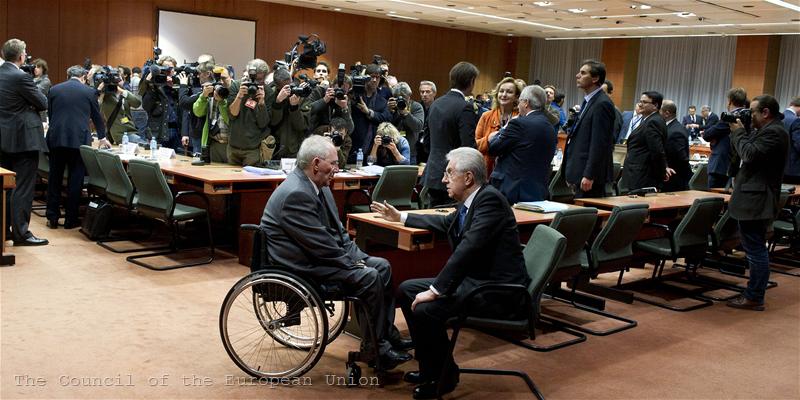 | © The Council of the European Union
| © The Council of the European UnionThe Rescue Fund Has Been Optimised, but Hopes Lie with the ECB and the IMF
Eurozone finance ministers have approved the new tools of the eurozone rescue fund EFSF. The first option provides for the fund to issue partial protection certificates to newly issued government bonds in the euro area. The certificate will guarantee 20-30 percent of the bond's value and after t ...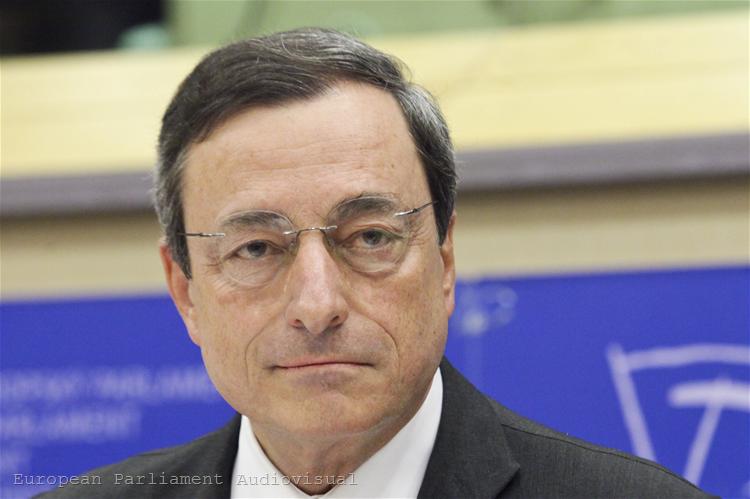 | © European Parliament Audiovisual
| © European Parliament AudiovisualThe European Central Bank - a Savior of Last Resort
"A credible signal is needed to give ultimate assurance over the short term. What I believe our economic and monetary union needs is a new fiscal compact - a fundamental restatement of the fiscal rules together with the mutual fiscal commitments that euro area governments have made. Just as we e ...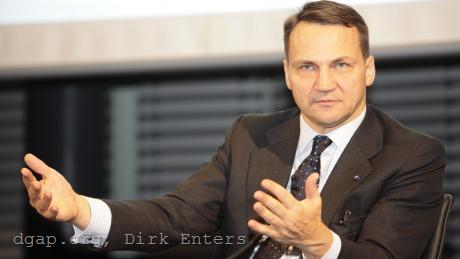 | © dgap.org, Dirk Enters
| © dgap.org, Dirk EntersPoland Has Made an Unprecedented Appeal to Germany to Act Immediately in the Name of Europe
"I will probably be first Polish foreign minister in history to say so, but here it is: I fear German power less than I am beginning to fear German inactivity.'" A Pole must have reasonable grounds to make such an appeal to the Germans a little more than 70 years after Germany invaded Poland, un ... | © European Union, 2011
| © European Union, 2011Eurobonds? Be Careful What You Wish For!
"Many of the implications of Stability Bonds go well beyond the technical domain and involve issues relating to national sovereignty and the process of economic and political integration." With this introduction, the European Commission presented various options eurozone countries to issue commo ...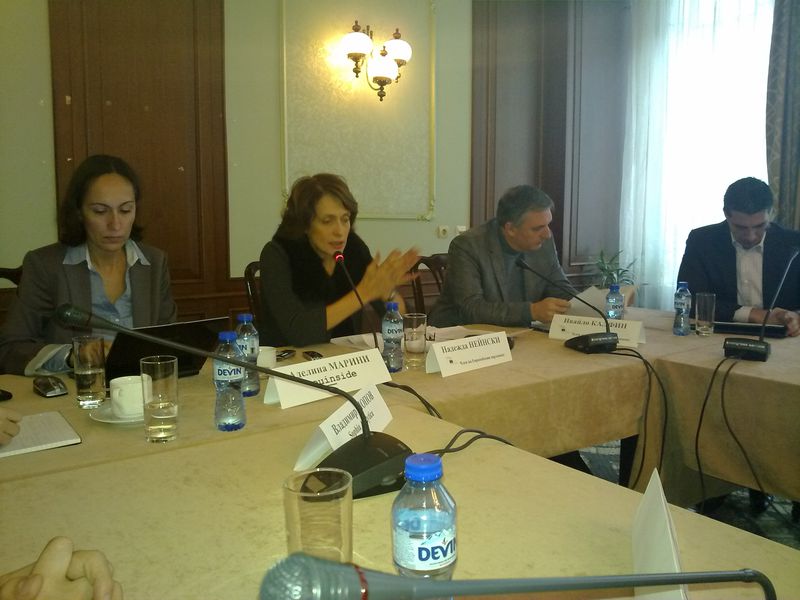 | © euinside
| © euinsideBulgaria Should Actively Participate in the Processes in the EU
Bulgaria is directly affected by the developments in the euro area and it cannot afford not to be interested in the crisis, said the participants in the round table "EU Economic Governance - the Political Way Ahead", organised by euinside and supported by the European Parliament. Of course, no ...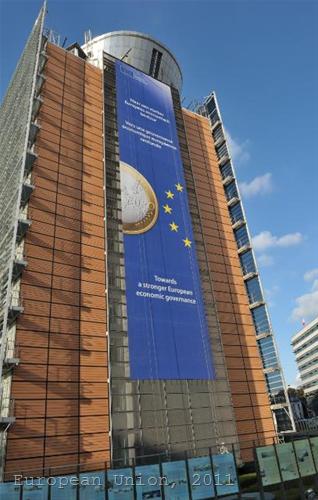 | © European Union, 2011
| © European Union, 2011The EU Economic Governance: the Political Way Ahead
When a year and a half ago euinside decided to focus its efforts on the reform of EU's economic governance, we did not even suspect what Europe would look like today, when the reform is already a fact but needs to be continued at an accelerated pace. A year and half ago we had on the table one c ... | © European Union, 2011
| © European Union, 2011A Euro Member State at Risk May be Forced to Ask for Bailout
To ask for bailouts will now cost the eurozone countries their budget powers and voting rights in the Council. This is envisaged in the new European Commission proposals, aimed at strengthening the economic governance of the euro area and which complement and build on the EU economic governance ... | © European Union
| © European UnionGreece Needs Hercules, Italy Is in Everyone's Heart
The two super heroes who engaged themselves to save their stuck with problems countries - Mario Monti (Italy) and Lucas Papademos (Greece) - were literally summoned to Brussels in order to state once again the commitments, they and the political parties that supported them undertook on a nationa ...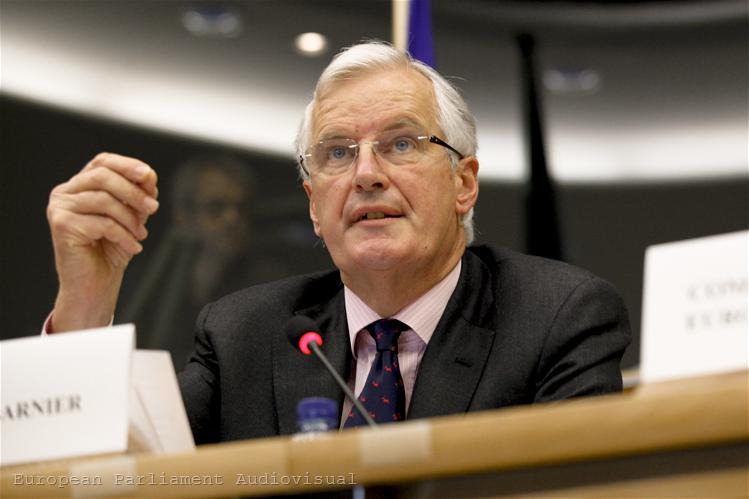 | © European Parliament Audiovisual
| © European Parliament AudiovisualMEPs Will Propose a Temporarily Ban on State Credit Ratings
How to better regulate the work of credit rating agencies (CRAs), so that they do not cause problems on the markets - this issue was debated by MEPs in the Committee on Economic Affairs in the European Parliament with EU Competition Commissioner Joaquin Almunia and Internal Market Commissioner M ... | © www.pp.es
| © www.pp.esThe Centre-Right Popular Party Takes the Responsibility to Pull Spain out of the Crisis
The Spanish centre-right Popular Party has scored a great victory in yesterday's elections, winning 186 seats in the 350-member parliament against 110 seats for the Socialists. This is the worst defeat for the left in the last thirty years since there has been democratic governance in Spain. The ... | © Regierung online
| © Regierung onlineAn English Game with German Rules
As Gary Lineker* once said, football is a simple game - 22 men chase a ball for 90 minutes and at the end the Germans always win. Today, this British fear from German dominance has gone far beyond football. The UK is watching what is going on in the euro area, fearing the consequences of a break ...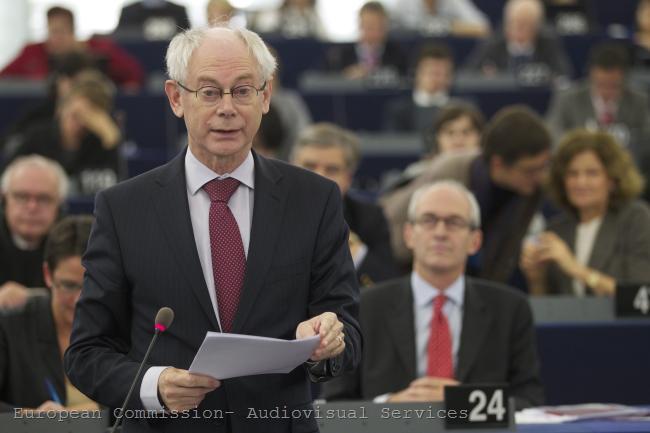 | © European Commission- Audiovisual Services
| © European Commission- Audiovisual ServicesVan Rompuy: There are 17 Eurozone Countries, I Repeat -17
First the euro area, then the remaining ten - with this message European Council President Herman Van Rompuy made it clear that the priority currently was first to address the urgent problems of the euro area. "After all, it is perfectly natural that those who share a common currency take some d ... | © European Union
| © European UnionA Final Solution of the Debt Crisis We Can Expect As Early As Spring
In spite of the desire for a quicker solution of the crisis, it seems that it will stay a while among the headlines. As early as spring or the middle of next year it could be expected some concrete solutions to be found, is the forecast of macro economist Dimitar Ashikov and Vladimir Shopov, a p ...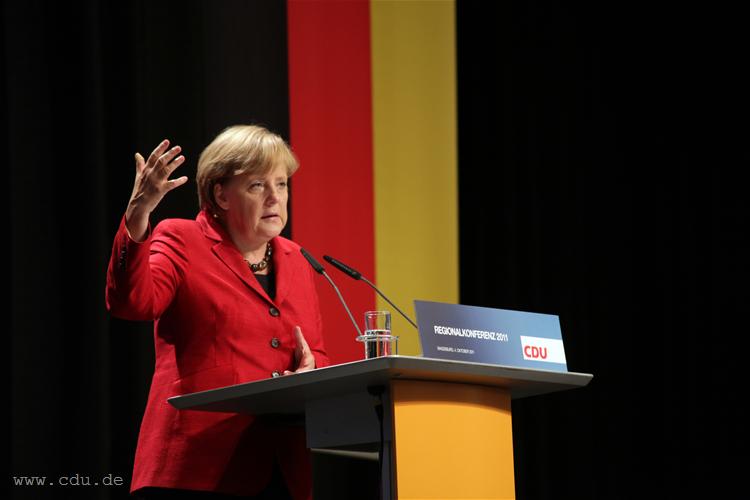 | © www.cdu.de
| © www.cdu.deMerkel: The Euro Needs a Political Union
There is something still unfinished in Europe. What is lacking is a political union, which we should create step by step. With these words German Chancellor Angela Merkel appealed not only to her party members at the CDU congress in Leipzig, but to the whole of Europe. The timing is the key - th ...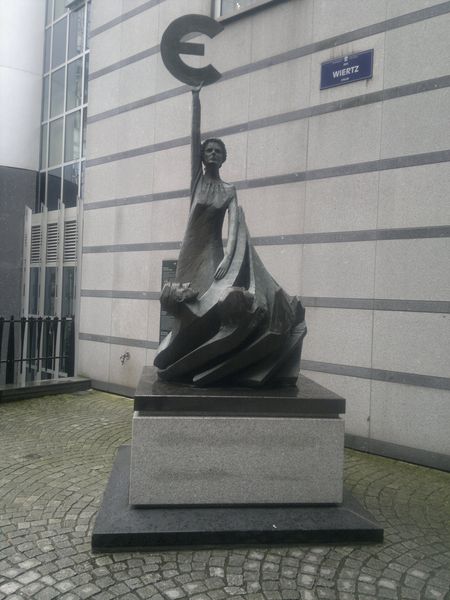 | © euinside
| © euinsideEconomic Super Heroes Take the Power in Greece and Italy
In moments of prosperity high level corruption can hardly be pointed out as harmful for the economy because everyone, more or less, is inclined to close their eyes for irregularities when everything is going on well. It is a fact, though, that political egoism, corruption, thirst for power and p ...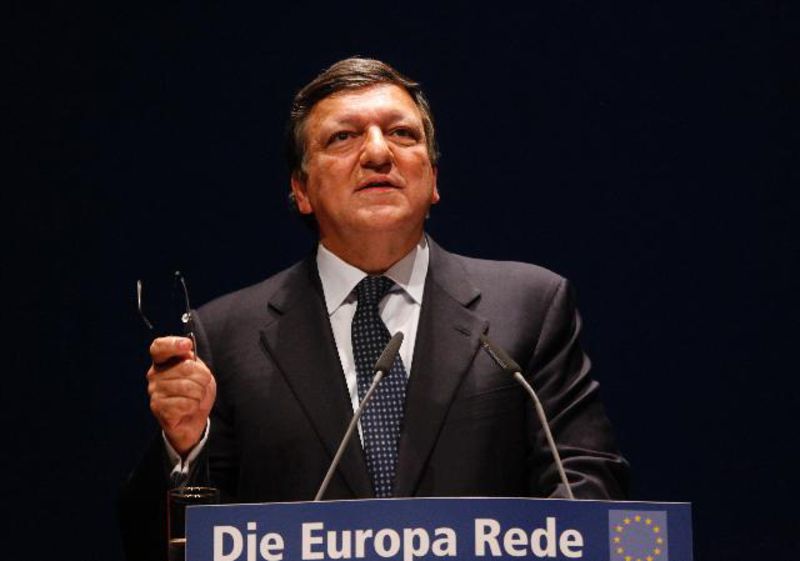 | © European Commission- Audiovisual Services
| © European Commission- Audiovisual Services Barroso: The EU and the Euro Area Belong Together and Should not be Divided
At the height of the debt crisis and on the occasion of the anniversary of the fall of the Berlin Wall, a symbol of the German and European unification, European Commission President Jose Manuel Barroso delivered a key speech precisely in Berlin. Amid growing fears of division of the EU into two ...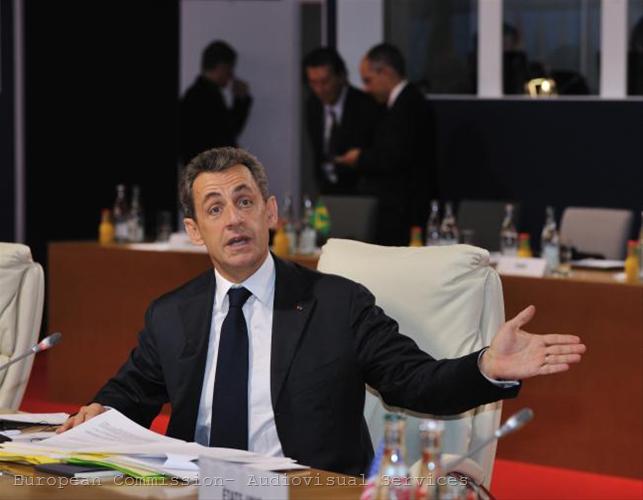 | © European Commission- Audiovisual Services
| © European Commission- Audiovisual Services French Distraction Manoeuvres
Despite the demonstrated proximity of Nicolas Sarkozy and Angela Merkel, French borrowing costs are rapidly moving away from the German costs. The spread between the 10-year French and German bonds has doubled since the beginning of October, The New York Times noted. The German Bund is considere ...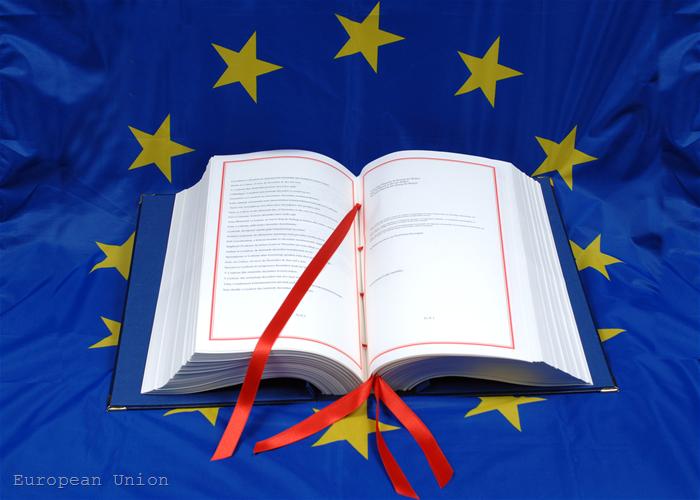 | © European Union
| © European UnionThe Solution is a New Union
17 climbers are climbing an upright rock, attempting to reach the top, where a marvellous view will reveal for them. Unfortunately, however, all of them are tied with one rope, while some of the climbers are already starting to lose strength and to drop off, thus seriously increasing the pressur ...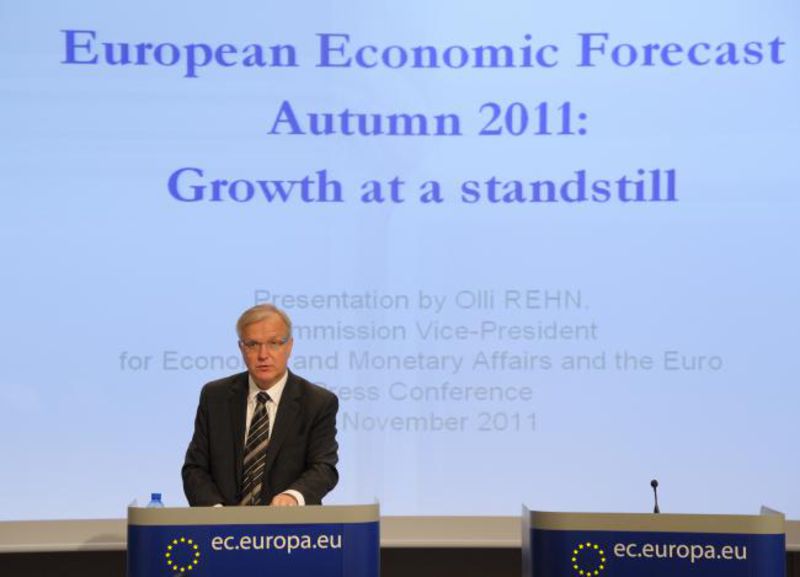 | © European Commission- Audiovisual Services
| © European Commission- Audiovisual Services A Groundswell in Europe
"Growth has stalled in Europe, and there is a risk of a new recession." Before telling this, EU Economic Affairs Commissioner Olli Rehn drank a glass of cold water and asked the reporters: "Please, do not kill the messenger!". The Commission's autumn economic forecast states unequivocally: the e ... | © European Parliament- Audiovisual Unit
| © European Parliament- Audiovisual UnitECOFIN Finally Approved the Reform of EU's Economic Governance
The Council of EU finance ministers (ECOFIN) finally adopted the package of six legislative proposals to strengthen the economic governance of the EU. euinside has followed in details the new legislation all the way - from the Commission's proposals last year, through the difficult and lengthy n ... | © The Council of the European Union
| © The Council of the European UnionOlli Rehn: The Commission Cannot Collect Greek Taxes
As expected, Greece was the topic the eurozone finance ministers dealt with at their meeting last night. Greek Finance Minister Evangelos Venizelos has informed his colleagues in details about the latest developments. Perhaps they have been told the name of the new Greek prime minister, which ha ...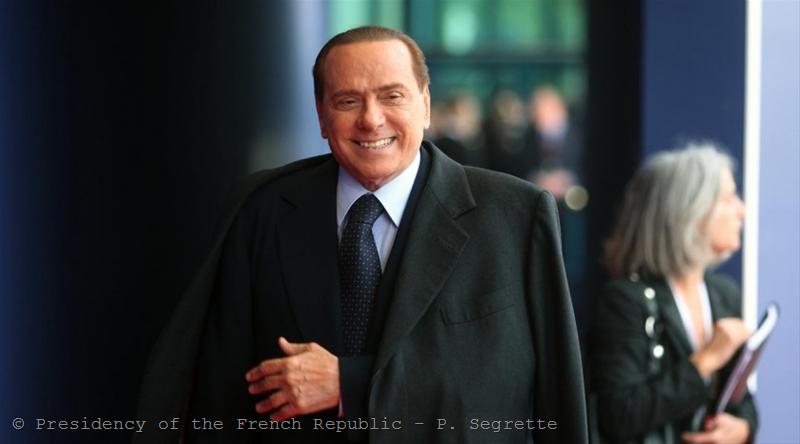 | © © Presidency of the French Republic - P. Segrette
| © © Presidency of the French Republic - P. SegretteWho Has Doubts About Berlusconi?
The right answer is 'everyone'. The debt crisis has already taken valuable political victims - Greek Prime Minister George Papandreou has just become the next one, and before that Spanish Prime Minister Jose Luis Zapatero, as well as the governments in Portugal and Ireland. Next year the same fa ...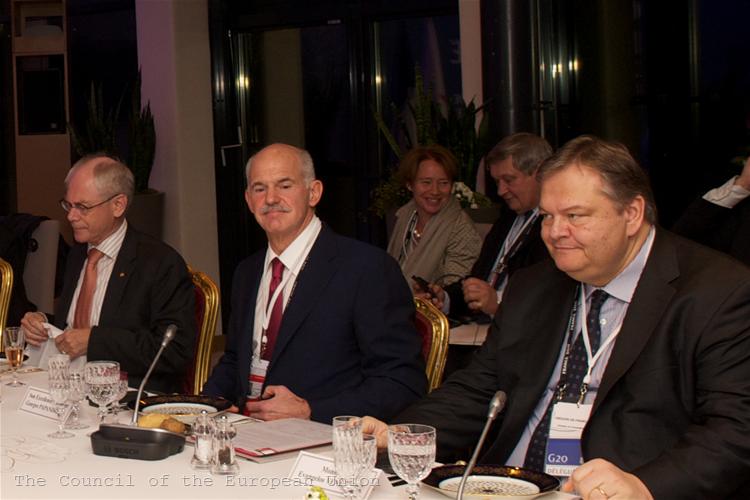 | © The Council of the European Union
| © The Council of the European Union24 Hours of Chaos
Awaiting the vote of confidence for the Greek government after yesterday's avalanche of contradictory news, I'm getting more and more convinced that the main culprit for the Greek political earthquake is not only and personally George Papandreou, although Greek media called him 'The Lord of Chao ...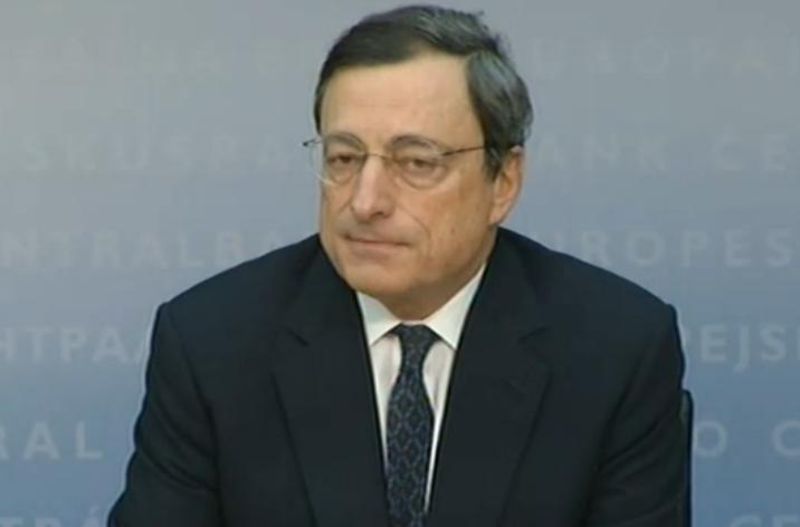 | © European Central Bank
| © European Central BankThe ECB: Leaving the Euro? It Is not in the Treaty!
Mario Draghi made a flying start in his new role of a European central banker. His first action, although unexpected, was determined and, according to many analysts correct: the ECB has cut rates by 25 basis points to 1.25%. Speaking to reporters, Mr Draghi said that the decision was taken unani ... | © European Union
| © European UnionGreece Has Started Playing a Russian Roulette Game
There is no other way to call the Greek PM, Georgios Papandreou's decision to call a referendum on the second bailout programme for Greece, worth 130bn euros. And the problem is not in the referendum as such. There are several other problems: first is the timing; second is the democratic dossier ...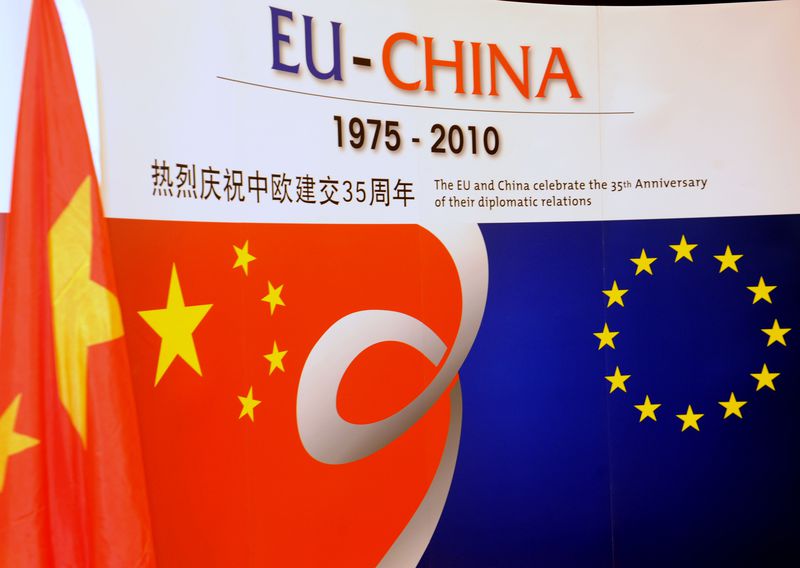 | © European Union
| © European UnionChina Is the Last Place where EU Should Seek Money from
In the beginning of the European Council and euro area summit on Sunday, October 23rd, when it was expected the EU leaders to undertake "decisive measures" to end the debt crisis in the eurozone, on Friday, October 21st, a strange message was received. It stated: "EU-China Summit postponed. Due ...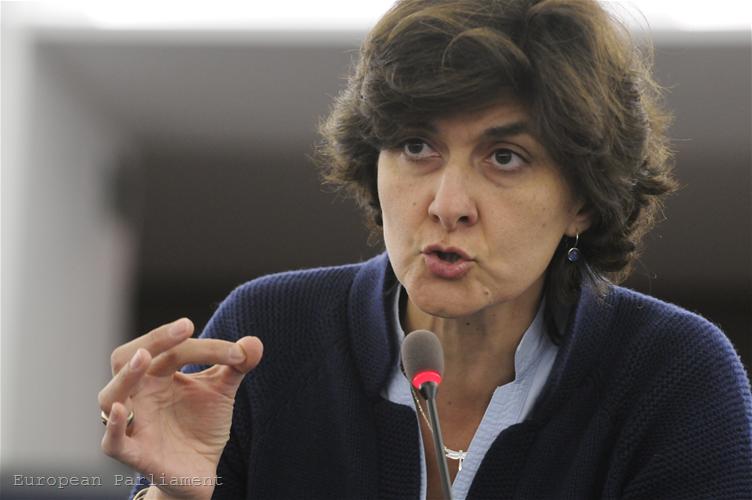 | © European Parliament
| © European ParliamentWhere Is the European Parliament in Your Decisions?
After only a few hours of sleep European Commission President Jose Manuel Barroso and European Council President Herman Van Rompuy appeared before the MEPs in Strasbourg to inform them about the decisions eurozone leaders took on Wednesday night last week. The two leaders were welcomed in the ho ...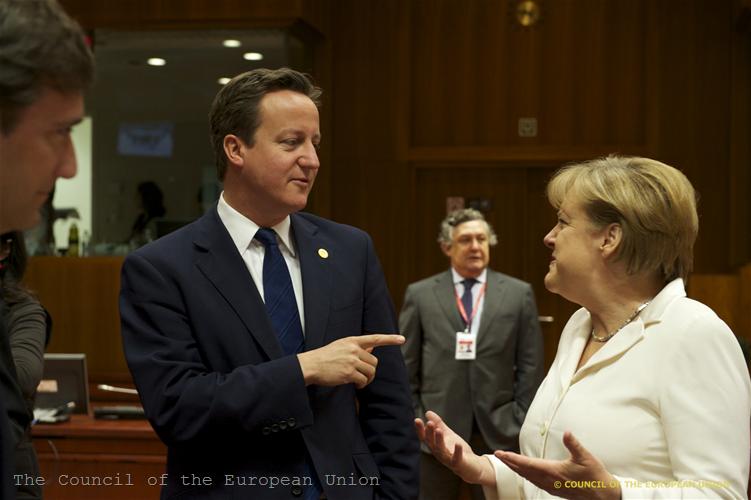 | © The Council of the European Union
| © The Council of the European UnionThe British were Euro sceptics?
Possibly. But surely they are euro pragmatics. And this is more than evident in recent days after it has already been clear that the eurozone will increasingly consolidate. But it should not be encapsulated and isolated from the other 10 EU countries, according to the British. Together with othe ...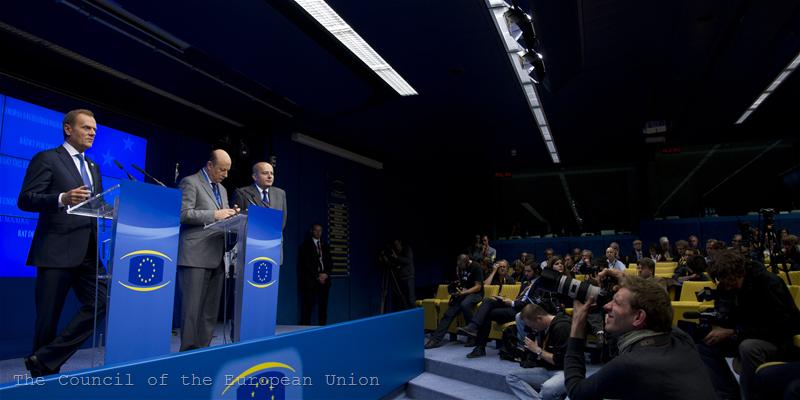 | © The Council of the European Union
| © The Council of the European UnionEU Starts a Major Bank Recapitalisation
The EU leaders have agreed on a common bank recapitalisation plan, aimed at providing medium-term funding to banks and "to enhance the quality and quantity of capital of banks." "There is broad agreement on requiring a significantly higher capital ratio of 9% of the highest quality capital and a ...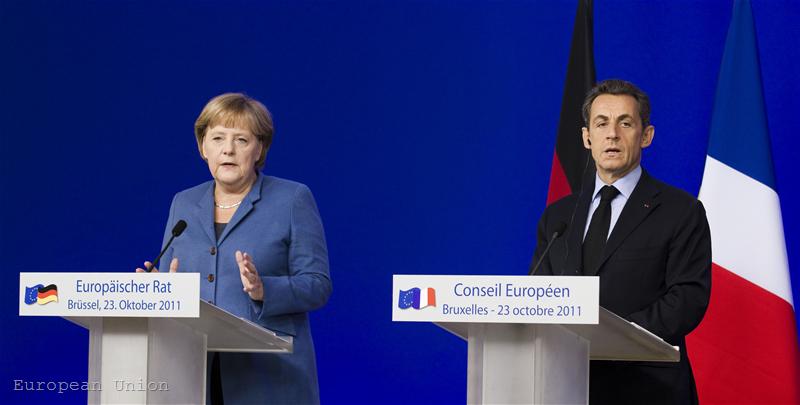 | © European Union
| © European UnionWhy Is It Possible Today Too a Decision Not to be Taken?
It is now very difficult to make a forecast on whether the eurozone leaders will reach the so much expected decisions to give sufficient grounds to the markets and the world to calm down that the worst would be avoided, because such forecasts are more or less pure gambling. Nonetheless, why are ...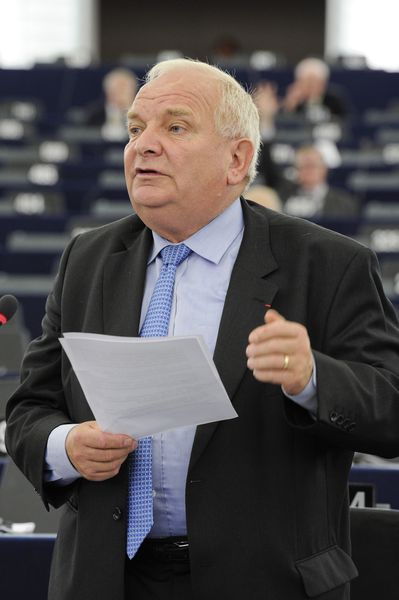 | © European Union
| © European UnionTime for a decision - with the EU or separately
A lot of passion, a lot of Europe and a lot of love poured during the three-hour long debate in the European Parliament on September 28 which started with the already traditional annual State of the Union Address of European Commission President Jose Manuel Barroso. Even more intriguing was that ...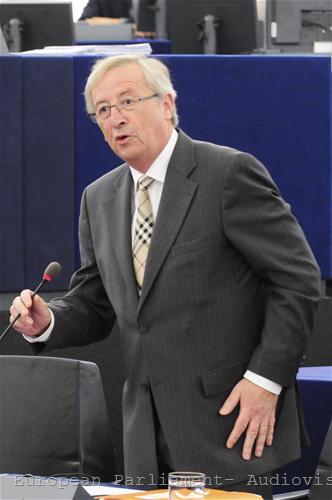 | © European Parliament- Audiovisual Unit
| © European Parliament- Audiovisual UnitThe European Parliament Approved the Reform of the EU Economic Governance
Imagine a school with a class of 27 pupils, a class master, a principal and a school board. This is the European Union with its 27 Member States, the European Commission (the class master), the Council of Ministers (the principal) and the Parliament (the board). Although this analogy is not lite ... | © The Council of the European Union
| © The Council of the European UnionThe Permanent Euro Area Rescue Mechanism Could Be Activated from 2012
The German government is considering the option of launching the permanent rescue fund for the euro area (the European Stability Mechanism (ESM)), a year earlier than planned - in 2012 instead of mid-2013. The news has been reported by the German news magazine Der Spiegel that cited sources of i ... | © IMF
| © IMFThe Eurozone Has 6 Weeks Left to Live
"Europe has made a choice in the face of the crisis: it chose greater economic integration". This is what Polish Finance Minister Jacek Rostowski said before the beginning of the G20 ministers of finance meeting in Washington, which took place in two stages in the framework of the annual meeting ...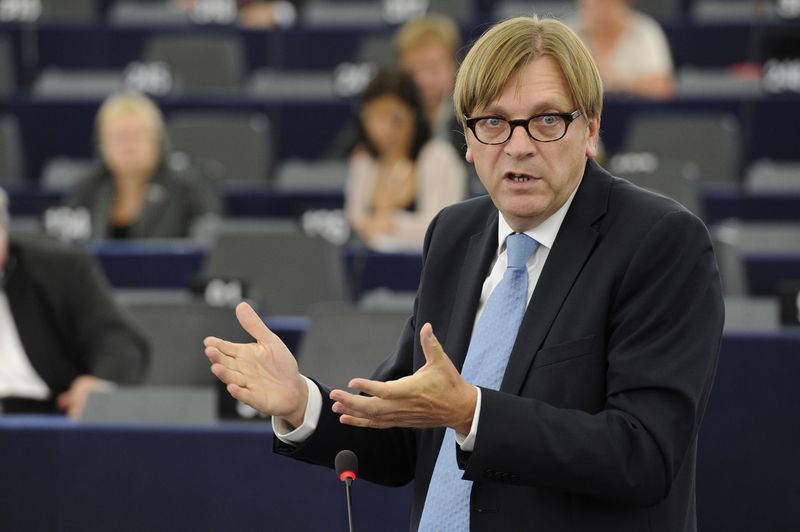 | © European Union
| © European UnionEconomic Governance or Economic Government?
"Europe is in danger" with these words of Polish Minister of Finance Jan-Vincent Rostowski started the debate in the European Parliament on Wednesday morning (September 14) dedicated to the debt crisis. This was only the beginning of many strong words and passions expressed during the two-hour d ... | © European Union
| © European UnionItaly Downgraded, Greece Considers a Referendum on the Euro
Italy met the dawn with its credit rating lowered. Surprisingly, this time it was not Moody's but Standard & Poor's that had first reduced the Italian long-term credit rating from "A+" to "A", and the short-term - from "A-1 +" to "A-1". Moreover, with a negative outlook, which means further redu ... | © European Parliament- Audiovisual Unit
| © European Parliament- Audiovisual UnitThe European Parliament and the Council Agreed on the Economic Governance
The European Parliament and the Council of Ministers have agreed on the package of six legislative proposals aimed at strengthening the EU economic governance. The so-called 'Six Pack' is considered a key tool for preventing the current debt crisis in the eurozone to be repeated in the future. T ...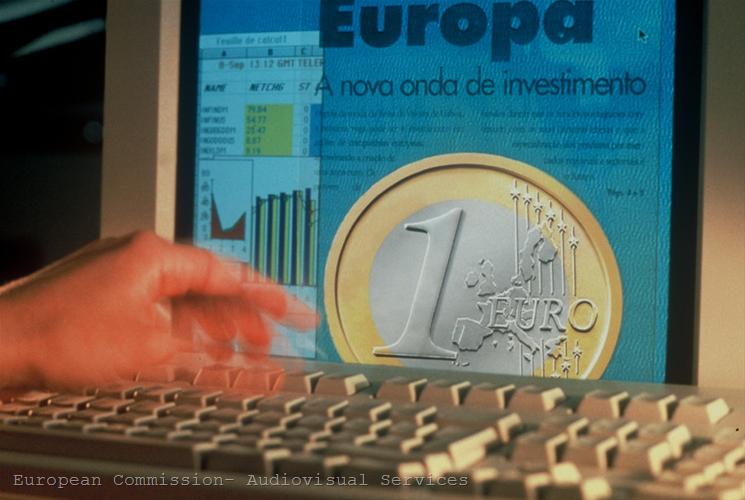 | © European Commission- Audiovisual Services
| © European Commission- Audiovisual Services The Canaries’ Problem
The rating agency Moody's lowered the credit rating of the French banks Crédit Agricole and Société Générale as it is continuing the review of the largest bank in the country, BNP Paribas, for a possible downgrade. The reason for the rating agency's decision is French banks' great exposure to Gr ...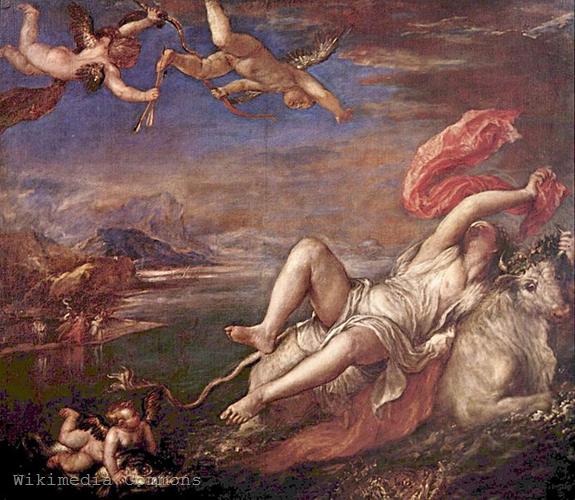 | © Wikimedia Commons
| © Wikimedia CommonsEurope Between the Greek Bull and the Chinese Dragon
Italy appears to be another European country that is peeking with hope in the thick Chinese wallet. The government in Rome hopes Beijing to make "significant" purchases of Italian bonds and investments in strategic companies, The Financial Times reported. It is unclear exactly what part of Italy ...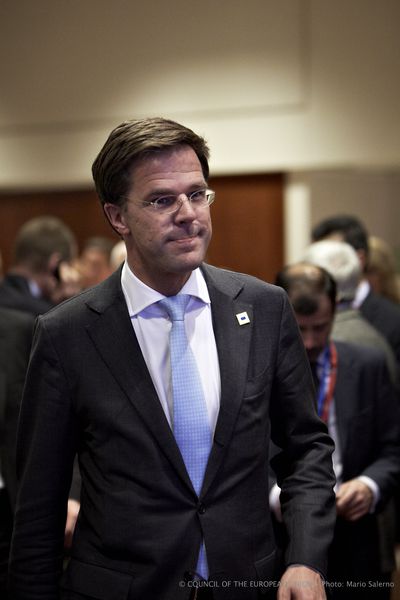 | © The Council of the European Union
| © The Council of the European UnionDecisive Times for the Eurozone
The Dutch government joined the bidding of ideas for the rescue of the euro area as Prime Minister Mark Rutte and Finance Minister Jan Kees de Jager published in The Financial Times a joint article titled Expulsion from the Eurozone Has to be the Final Penalty. Although the authors state that th ...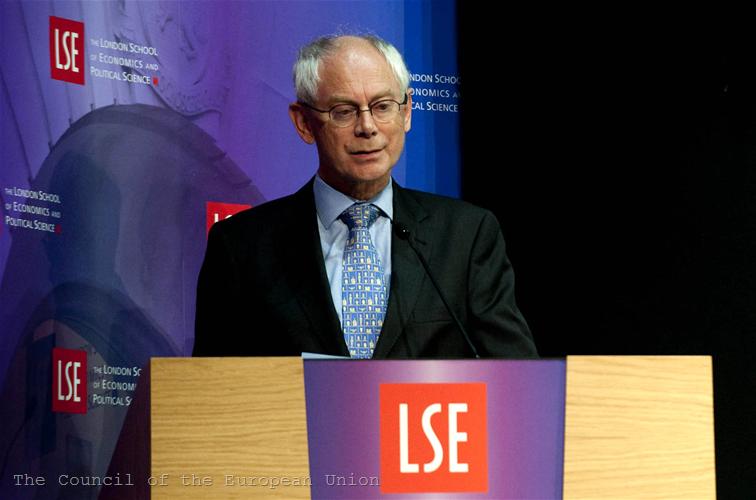 | © The Council of the European Union
| © The Council of the European UnionThe EU Has Gone Too Far to Go Back
As if to refute the critics who consider him invisible and lacking in personality, European Council President Herman Van Rompuy delivered an impressive speech at the London School of Economics. "Unlike some of the other players, I do not practise 'megaphone diplomacy' via the media. I prefer 'qu ...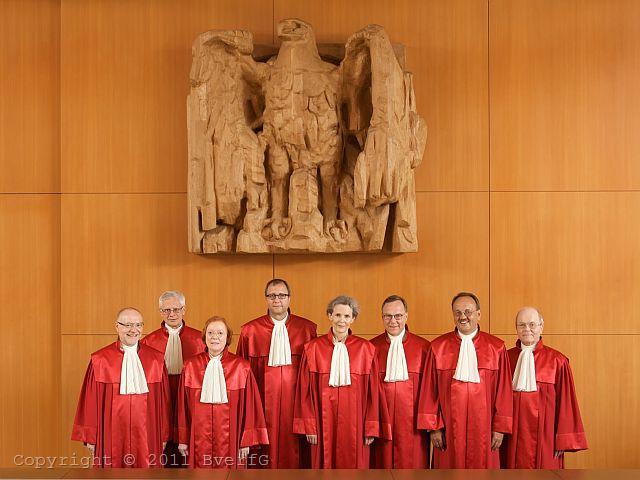 | © Copyright © 2011 BverfG
| © Copyright © 2011 BverfGGerman Constitutional Court Backed the Eurozone Rescue Operations
The German Constitutional Court ruled that the rescue operations in the euro area did not violate the budgetary powers of the Bundestag. In the future, however, the government has to seek a prior approval of the parliamentary budget committee before deciding on the participation of Germany, the ... | © European Commission- Audiovisual Services
| © European Commission- Audiovisual Services Greece on the Edge Again, Italy Follows Suit
The mission of the European Commission, the European Central Bank and the International Monetary Fund (the so called Troika) in Greece, which was doing a consecutive review of the Greek economic programme, has terminated its work and left Athens. According to the concise official statement, the ...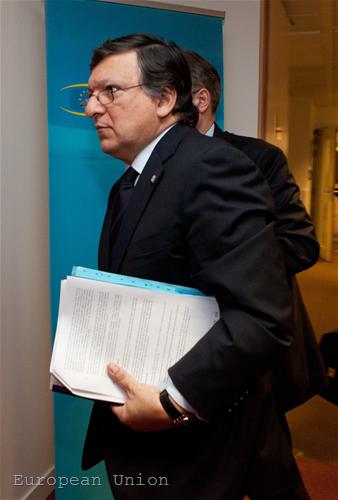 | © European Union
| © European UnionJose Manuel Barroso: Implementation is key
The period of collecting ideas has ended, now it's time for action. This was in all the message of European Commission President Jose Manuel Barroso, conveyed in a video address on August 31 on the occasion of the opening of the new political season. In his short address Mr Barroso outlined the ...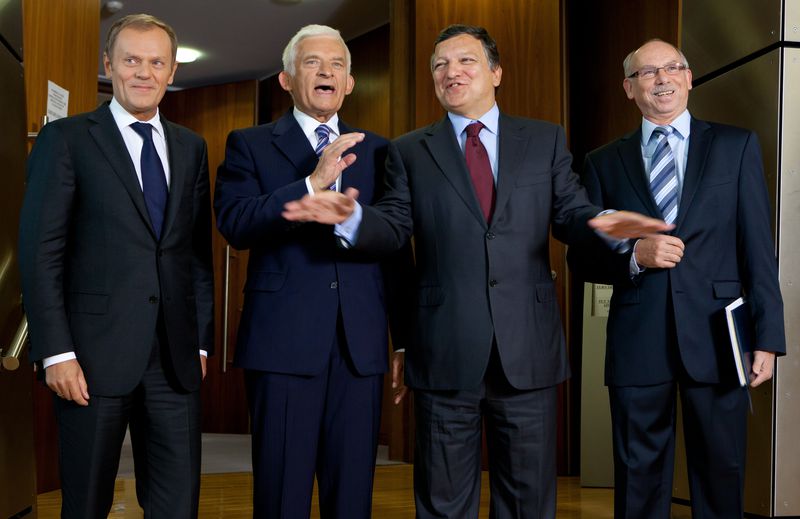 | © European Union
| © European UnionThe EU is going back to the debate about economic growth
'Growth and Jobs' - these two words have turned into a mantra for the European Union for the past more than 10 years, as much before the Great Crisis from 2008 the EU was trying to boost European economic growth through the Lisbon Strategy for Growth and Jobs, adopted in 2000. The 10-year strate ...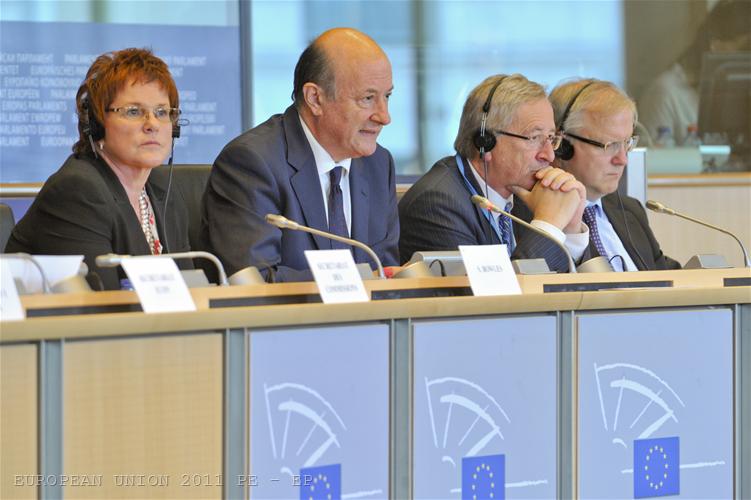 | © EUROPEAN UNION 2011 PE - EP
| © EUROPEAN UNION 2011 PE - EPA theory of (euro)improbabilities
"When you eliminate the impossible you are left with the improbable, no matter how unlikely that seems." With these words of detective Sherlock Holmes, Chairwoman Sharon Bowles (ALDE, UK) opened the extraordinary meeting of the economic committee in the European Parliament, devoted to the debt c ... | © European Union
| © European UnionIs it time for a European ministry of finance?
A deeper European integration, especially in the Economic and Monetary Union (the eurozone) is being discussed more and more often in terms of being the only solution to the debt crisis. What is interesting is that the debt crisis has created a big paradox - on the one hand it causes discussions ... | © www.imf.org
| © www.imf.orgPoliticians hold the key to solving the crisis
"There remains a path to recovery, yet we do not have the luxury of time," IMF Managing Director Christine Lagarde appealed to global political and economic elite at the annual meeting of central bankers in Jackson Hole, Wyoming. Christine Lagarde, a former finance minister of France, clearly ou ...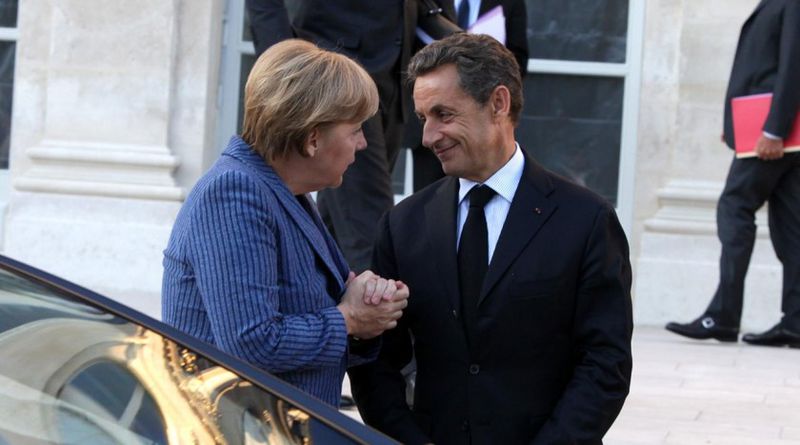 | © Présidence de la République - C. Alix
| © Présidence de la République - C. Alix A stability union instead of a debt union
German Chancellor Angela Merkel is once again alone against all in her resistance against the eurobonds. On the one hand, she is being accused of non-European behaviour by many of her colleagues in the EU, who insist on sharing indebtedness through the issuance of common euro debt. On the other, ...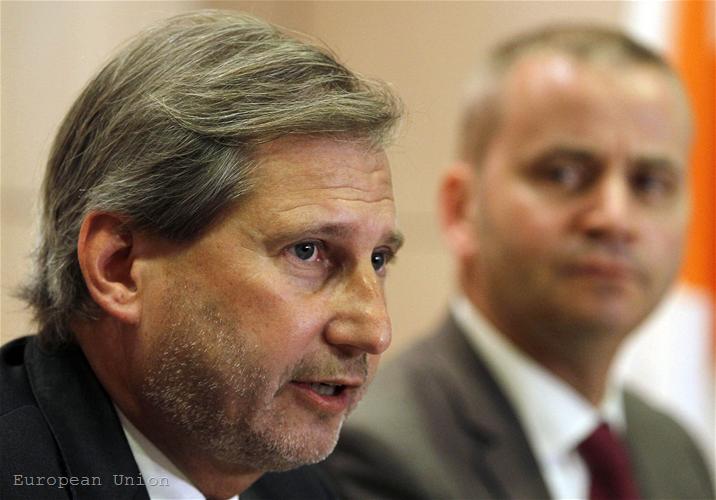 | © European Union
| © European UnionA European “Marshall Plan” for the structural funds
The European Commission has initiated at the beginning of August additional financial assistance for the countries mostly affected by the crisis, which is to be voted soon by the Council and Parliament. According to the Commission's proposal, Greece, Ireland, Portugal, Romania, Latvia and Hungar ...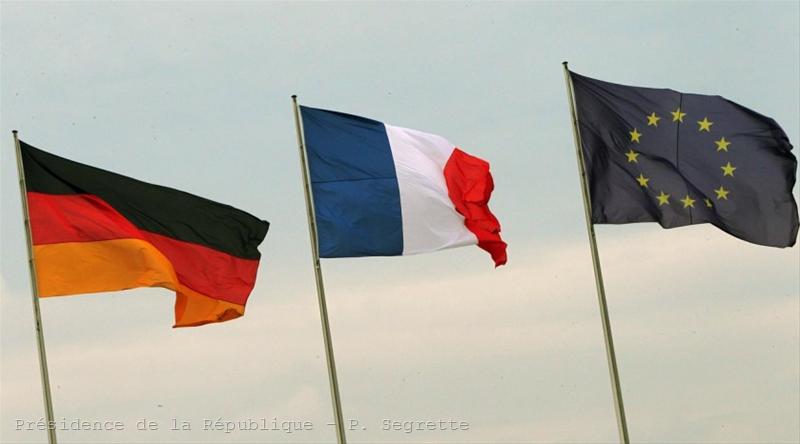 | © Présidence de la République - P. Segrette
| © Présidence de la République - P. SegretteSarkozy: Eurobonds are the end of European integration, not the beginning
The meeting of German Chancellor Angela Merkel and French President Nicolas Sarkozy in Paris didn't produce any surprises. Franco-German meetings and phone calls have already been part of the routine governance of the euro area and any news are largely foreknown. This was the case with the propo ... | © European Commission- Audiovisual Services
| © European Commission- Audiovisual Services Will Italy redeem itself from the crisis?
The Italian government has approved a new package of austerity measures worth 45.5 billion euros. The aim of the measures is the country to achieve a balanced budget a year ahead of what was envisaged - in 2013, instead of 2014. Only a month ago the government adopted another package of measures ...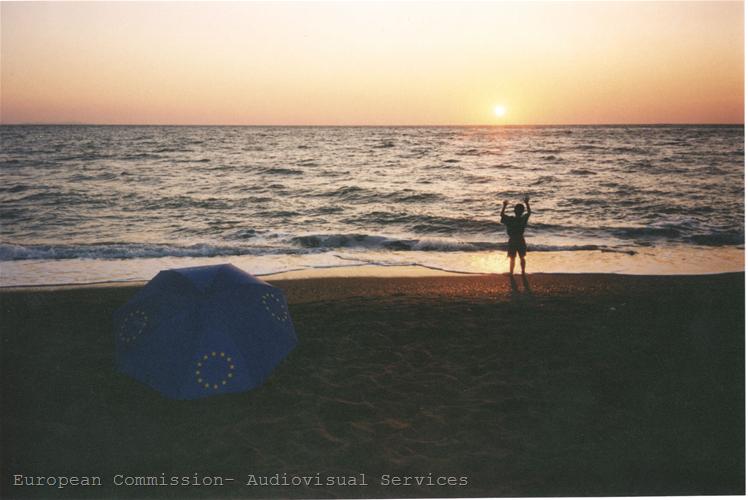 | © European Commission- Audiovisual Services
| © European Commission- Audiovisual Services The long, hot summer of the euro area
Holiday August may be poor of events but instead it is full of rumours and ideas that foreshadow a hot European autumn. Undoubtedly, the most tense remains the situation in the euro area. The financial markets continue to attack consistently one or another country - no longer on the periphery bu ... | © European Commission- Audiovisual Services
| © European Commission- Audiovisual Services The bitter pill of European integration
Until July 21, 2011 there were debates taking place in the European Union - more or less integration, more or less Europe. After July 21 the question is not whether but how exactly the greater integration can happen. Who will take part, who will determine the rules and above all - how to serve i ...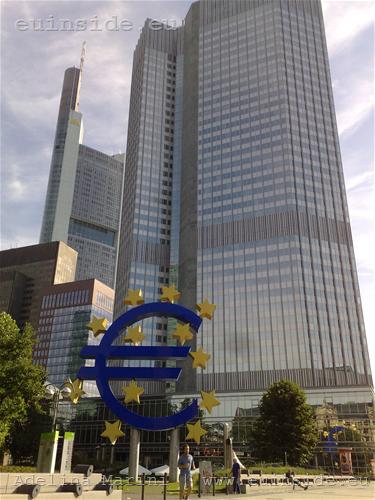 | © euinside
| © euinsideOops! ... They did it again!*
In May 2010, when the European Central Bank started to buy Greek bonds and later - Irish and Portuguese ones, it argued that this would be a single action. But now it is happening again - this time the ECB is buying Italian and Spanish debt. Generally, European media are critical to ECB's decisi ... | © European Union
| © European UnionThe ECB is expected to buy Spanish and Italian debt
The European Central Bank, together with the leaders of the seven leading global economies, are conducting an unprecedented campaign in a bid to calm financial markets. Beside the instability of the euro area and increased pressure on Italy and Spain, here came the decision of the Standard & Poo ... | © European Commission- Audiovisual Services
| © European Commission- Audiovisual Services The EU vs. the credit rating agencies
After months of tension between the European Union and the credit rating agencies (CRAs), after some unambiguous threats by the agencies and sharp comments by Brussels, the European Union officially announced that it would pursue "the line of reducing the over-reliance on external credit ratings ...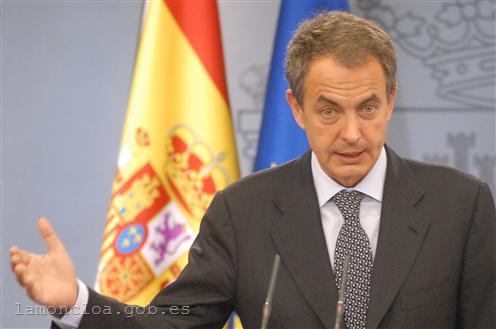 | © lamoncloa.gob.es
| © lamoncloa.gob.esSpain is choosing the inevitable - more painful reforms
Spain is headed toward early parliamentary elections on November 20. Prime Minister Jose Luis Rodriguez Zapatero defended his decision to hold elections four months earlier, saying that it was "advisable" the new government to take its responsibilities from the beginning of next year. Mr Zapater ... | © euinside
| © euinsideMEPs: Decisions of euro area leaders are right but insufficient
MEPs from different groups in the European Parliament welcomed the decisions taken at the extraordinary summit of the euro area on 21 July. An especially positive step, they said, was to relieve the conditions of the bailout loans to Greece, Ireland and Portugal. MEPs from these countries expres ... | © European Commission- Audiovisual Services
| © European Commission- Audiovisual Services Greek debt restructuring after all happened but is this the end?
The forecast made by euinside, that there would be restructuring of the Greek debt after all, has come true. In February, we predicted that by autumn there would be real actions on the matter: "The idea of restructuring the Greek debt is no longer a taboo in the EU. Moreover, the necessary condi ... | © The Council of the European Union
| © The Council of the European UnionThe eurozone creates a European Monetary Fund. Another 109 billion euros for Greece
At noon on Thursday, the leaders of the eurozone countries began to arrive at the EU Council's building in Brussels. According to the agenda they were supposed to have a working launch and to come up with final decisions around 4 PM local time. Everyone familiar with the agenda of the extraordin ... | © The European Central Bank
| © The European Central Bank The European adolescence is over, time to grow
On Thursday, the eurozone leaders will hold an extraordinary summit for a second time in four months. The meeting is being convened by the President of the European Council, Herman Van Rompuy, and the main topics in the agenda are formulated as follows: "the financial stability of the euro area ...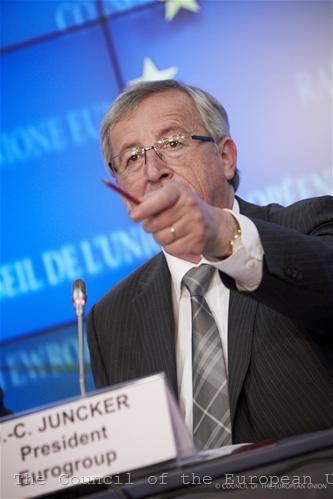 | © The Council of the European Union
| © The Council of the European UnionAnticipating the white smoke
The Greek debt must be reduced - this is the only clear message from the meeting of eurozone finance ministers. But how - this is the question that is still expecting an answer and is provoking a lot of speculations and guesses. According to the official statement of the Eurogroup, "ministers st ...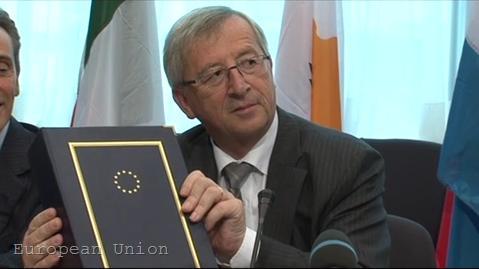 | © European Union
| © European UnionLook at Greece, think of Italy
After "the black Friday" for Italy on the financial markets, the week began with news of an emergency meeting, convened in Brussels by European Council President Herman Van Rompuy. The invitees were European Commission President Jose Manuel Barroso, European Commissioner for Economic and Monetar ...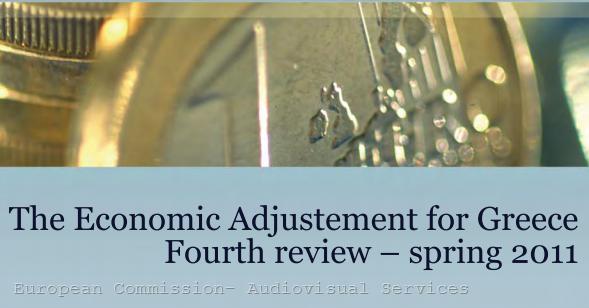 | © European Commission- Audiovisual Services
| © European Commission- Audiovisual Services The second Greek bailout will probably amount to 85 billion euros
By mid-2014 Greek government will need funding worth 172 billion euros, the fourth review of the implementation of Greek economic programme shows, agreed last year with the IMF and the EU. The document, published by the European Commission, includes a detailed review of all measures under the pr ... | © European Union
| © European UnionA sip of malodorous air for Greece
Consultations are underway with Greek lenders in order to define the modalities for voluntary private sector involvement with a view to achieving a substantial reduction in Greece's year-by-year financing needs, is said in a statement of the euro area ministers of finance after their two-hour vi ... | © Hellenic Parliament, Aliki Eleftheriou)
| © Hellenic Parliament, Aliki Eleftheriou)Greece is trying to extinguish the fire in its public finances
In spite the calls of European leaders, of the institutions and the big political families of the EU Greece to demonstrate national unity in such a crucial moment for the country, this did not happen. Yes, with 155 against 138 votes the Parliament has approved the reforms package, worth 28bn eur ...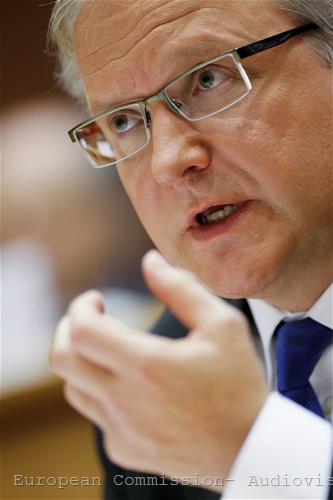 | © European Commission- Audiovisual Services
| © European Commission- Audiovisual Services Greece has to help itself, there is no Plan B
"There is no Plan B to avoid default ... Europe can only help Greece if Greece helps itself", EU Economic and Monetary Affairs Commissioner Olli Rehn stated, a day before the vote in the Greek Parliament on the economic programme agreed with the EU and the IMF. The official statement was also pr ...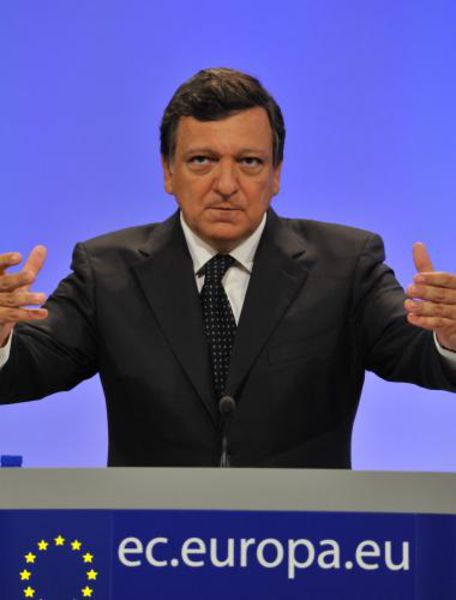 | © European Commission- Audiovisual Services
| © European Commission- Audiovisual Services The EU is mobilising all resources to help Athens
Greece will be the main topic of the European Council starting today. Although the leaders of the 27 member states will gather in Brussels, the "what to do" dilemma can be solved only in Athens. The Greek Government survived a confidence vote in Parliament, but the most difficult part is yet for ...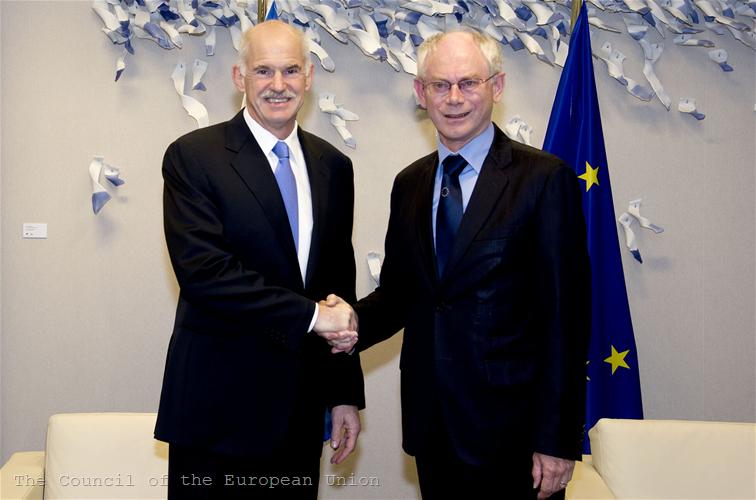 | © The Council of the European Union
| © The Council of the European UnionIf Greeks change their national character, the catastrophe could be averted
"Those who want to avoid a new 'Greece', have to take the road of more fiscal and economic union," Herman Van Rompuy, the President of the European Council, said just a few days ago. Back then he also explained that sharing a currency means we are one country and that the decisions of one, affec ...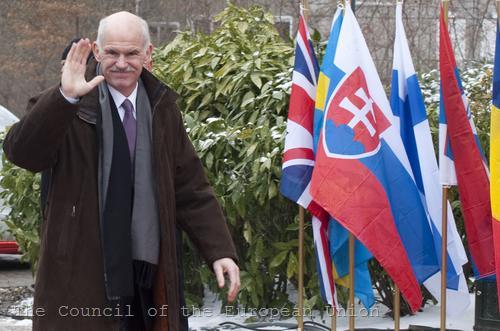 | © The Council of the European Union
| © The Council of the European UnionWill Greece choose the way of duty
Former British Prime Minister Margaret Thatcher describes in her memoirs how at the European Councils in the 1980s, Greece always received what it wanted, even at the cost of performing ancient Greek tragedies. What is happening today is exactly the same, but this time it is a reality. Athens do ...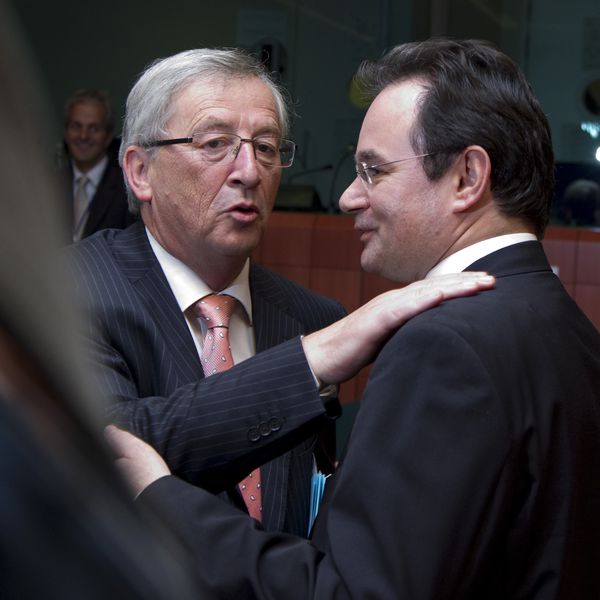 | © The Council of the European Union
| © The Council of the European UnionEU is looking for a word for Greece, which sounds better than default
The meeting of the euro area finance ministers on Tuesday ended without concrete results. The dispute how "soft" and how "voluntary" the restructuring of the Greek debt should be is going on for weeks, but tensions are rising with the approach of the deadline for the new agreement with Greece to ...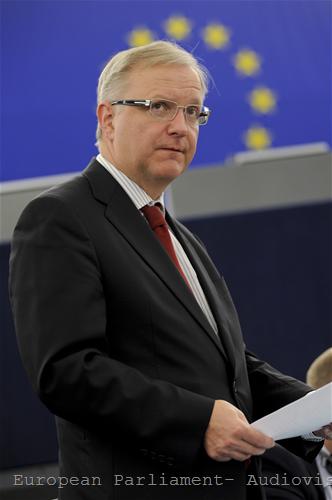 | © European Parliament- Audiovisual Unit
| © European Parliament- Audiovisual UnitVienna-style scenario is being prepared for Greece
Greece's debt crisis was discussed by the MEPs from the Economic Committee in the European Parliament and European Commissioner for Economic and Monetary Affairs Olli Rehn and Eurogroup President Jean-Claude Juncker. The debates, however, did not focus only on Greece but also on other hot issues ... | © www.psd2011.com (Foto Luís Saraiva)
| © www.psd2011.com (Foto Luís Saraiva)Center-right parties have won the early elections in Portugal
The Social Democrats have won the early parliamentary elections in Portugal with 39% of the votes, or 105 seats. Most likely they will form a coalition with the third parliamentary force - the People's Party (Member of the European People's Party), which received nearly 12% of the votes or 24 se ...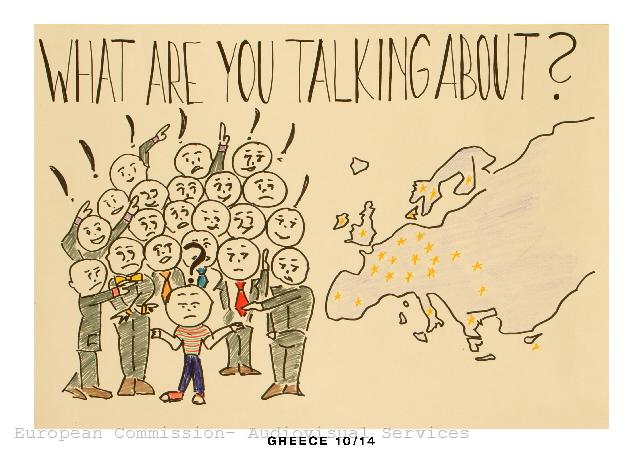 | © European Commission- Audiovisual Services
| © European Commission- Audiovisual Services Greece down the credit rating slide
Greece has met the dawn with a consecutive downgrade of its credit rating - the Moody's rating agency has downgraded the Greek bonds form B1 to Caa1 with a negative outlook. The reasons are "the increased risk that Greece will fail to stabilise its debt position, without a debt restructuring" an ...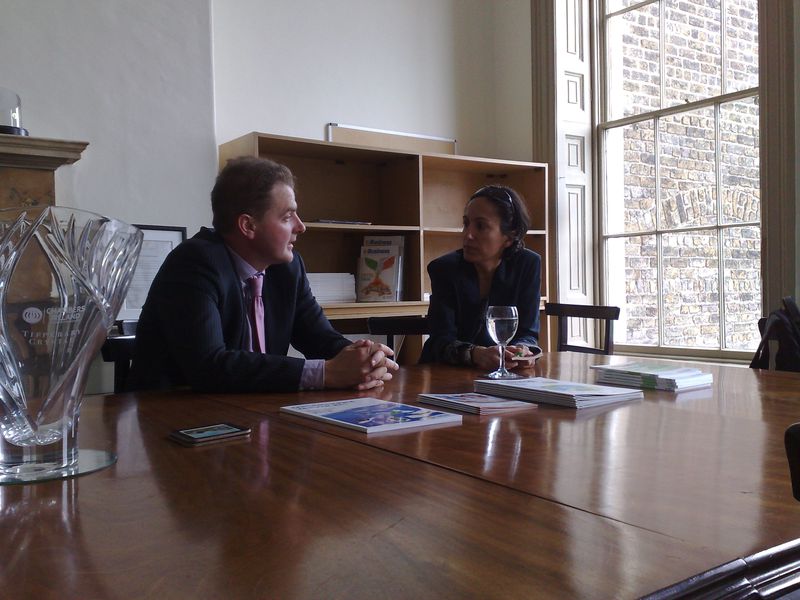 | © euinside
| © euinsideBetween numbers and reality
The most debated news in Ireland last week, which managed to break through in media in spite of the historical visit of the British Queen, was a very worrying statement of the International Monetary Fund about Ireland's situation, accompanied for the first time by a warning to the entire Europe ...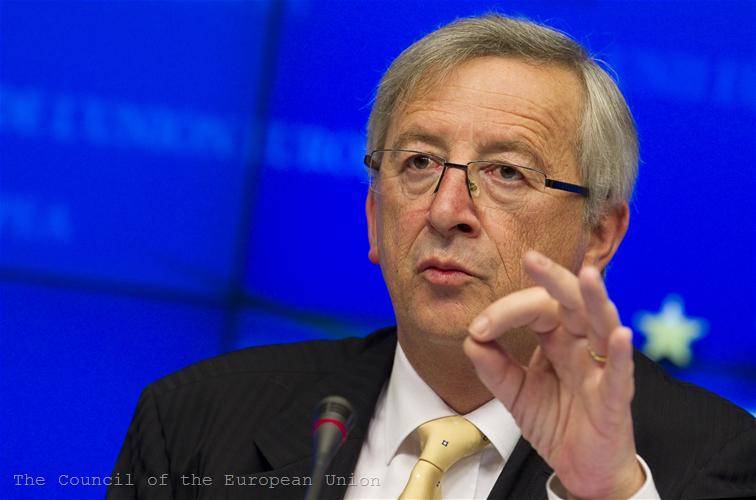 | © The Council of the European Union
| © The Council of the European UnionThe European Commission: Greece will not succeed without broad political support for reforms
Portugal will pay an interest rate of 5.5 percent on its loan from the EU. This decision of the eurozone finance ministers will certainly cause discontent in Lisbon, given the reduction of the Greek interest in March and the expectations the same to be agreed for Ireland. For lower interest rate ... | © European Parliament- Audiovisual Unit
| © European Parliament- Audiovisual UnitDebates on the debt crisis in the European Parliament – under the sign of populism and nationalism
Populist and nationalist rhetoric dominated the debate on the debt crisis in the European Parliament. Individual members of the larger groups tried to bring sanity and a spirit of solidarity in the discussions, not hiding their anger by the nationalism, manifested in the speeches of the majority ... | © eu2005.lu/Christof Weber
| © eu2005.lu/Christof Weber Chronicle of a foretold blackmail
On May 6 German magazine Der Spiegel published an article under the title Greece Considers Exit from Eurozone. The magazine relies on government sources in Berlin and even cites a document taken directly out of Finance Minister Wolfgang Schäuble's briefcase. As a result, according to Der Spiegel ...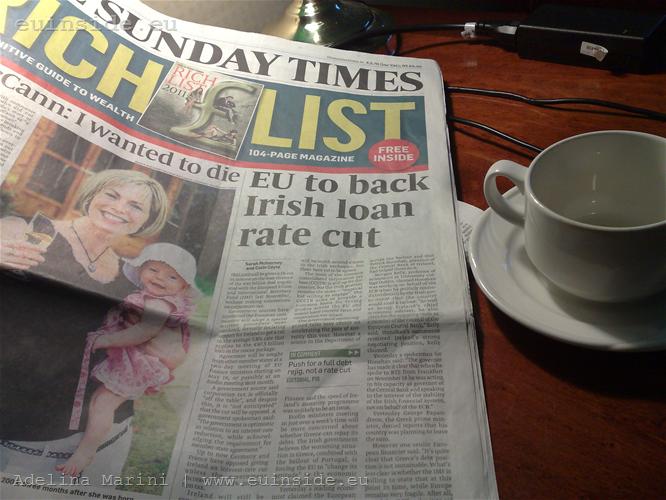 | © euinside
| © euinsideIreland will get a loan interest rate reduction without having to raise the corporate tax
Ireland will after all get a reduction of the interest rate of the bailout it got from the EU and the IMF, moreover without being forced to raise the corporate tax of 12.5%. This has been reported by the Sunday Times and the BBC, both quoting government sources. It is expected the European Commi ... | © European Commission- Audiovisual Services
| © European Commission- Audiovisual Services Portugal receives 78 billion euros loan from the EU and the IMF
The European Commission, the IMF and the Portuguese government agreed on an economic programme, which Portugal will have to perform in order to obtain a bailout of 78 billion euros. The three-year programme has been supported by the main political parties, as Olli Rehn announced, European Commis ...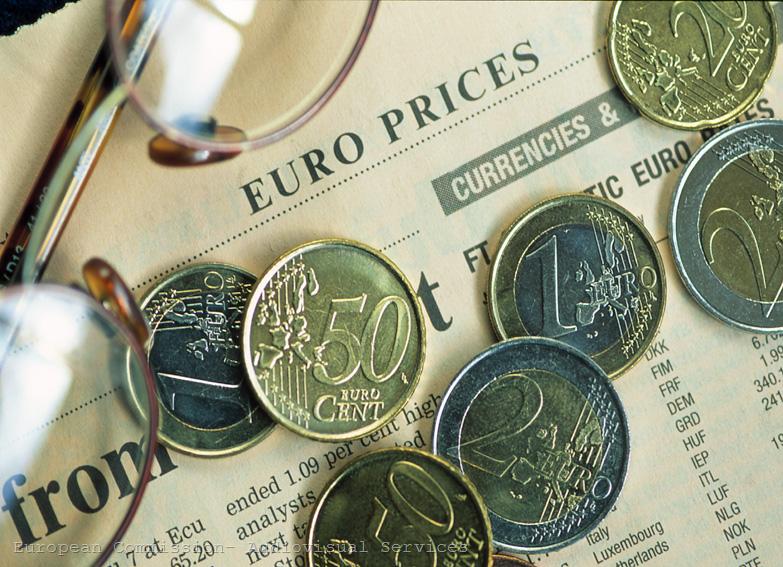 | © European Commission- Audiovisual Services
| © European Commission- Audiovisual Services Practical magic in the euro area
As it often happens in the past year, every attempt by the EU to counter market pressure on the euro area ends with a new outburst of panic and increased spreads of the most endangered peripheral economies. The same scenario we have observed in Greece and Ireland, occurred for a third time in P ...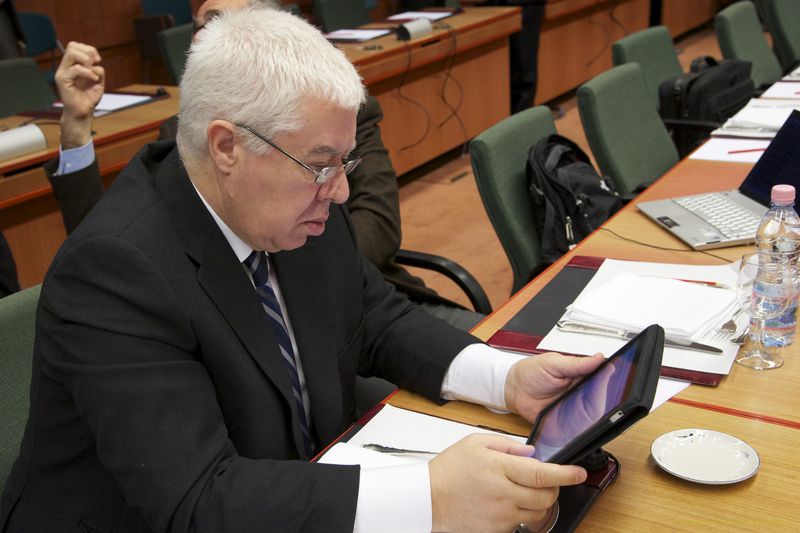 | © The Council of the European Union
| © The Council of the European Union80 billion euro for Portugal, Spain is out of danger for now
Portugal will receive a loan of about 80 billion euro under a 3-year programme, containing measures for fiscal consolidation, structural reforms and financial sector stabilisation. This became clear after the meeting of EU finance ministers in the Hungarian town of Gödöllő, near Budapest. EU Eco ...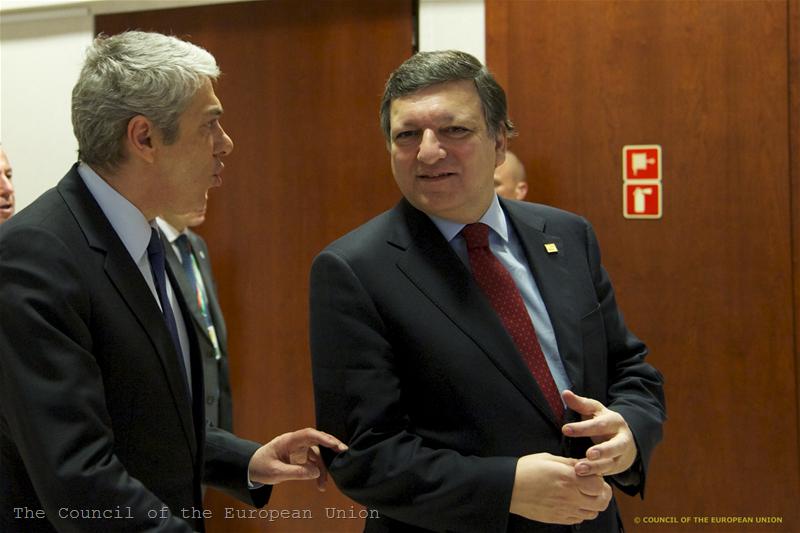 | © The Council of the European Union
| © The Council of the European UnionPortugal has asked for financial aid from the EU
Portugal's caretaker Prime Minister Jose Socrates announced that Lisbon has officially requested financial assistance from the EU. In his statement he did not indicate a specific amount, but according to various media reports it is about 70-80 billion euro. Literally until the very last moment J ...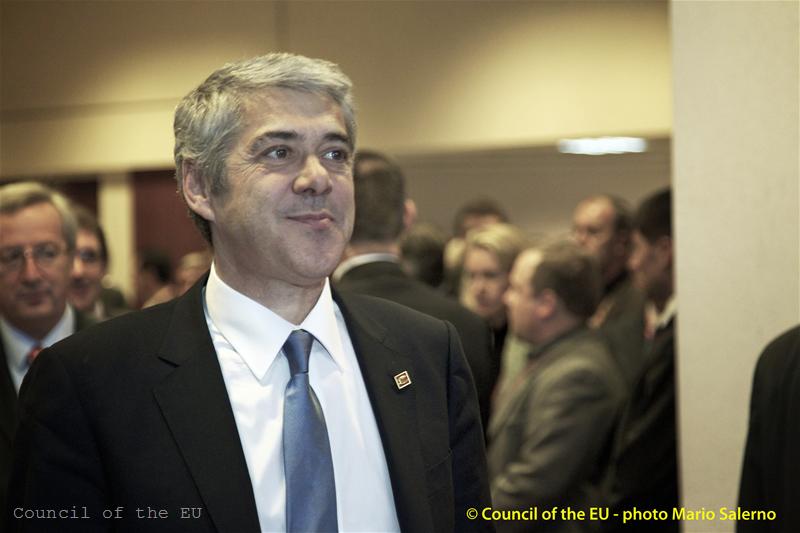 | © Council of the EU
| © Council of the EUPortugal without a government, but probably with a bail-out
Portugal is headed toward early elections after Prime Minister Jose Socrates submitted the resignation of his Socialist government. Late in the evening of March 23rd the parliament rejected the austerity package, proposed by the government in an attempt to reduce the budget deficit. This was the ...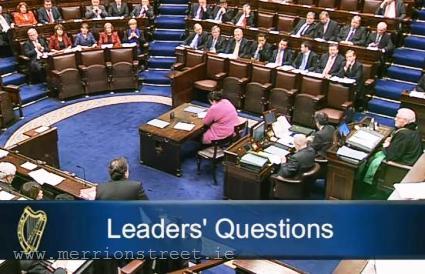 | © www.merrionstreet.ie
| © www.merrionstreet.ieIrish elections' results promise a renegotiation of the bailout loan's interest rate
Expectedly, Fine Gael won the Irish elections on 25 February, but failed to win an absolute majority in Parliament (the Dáil). At this stage of the vote counting, Fine Gael is having 70 seats (19 more than in the previous Parliament), the Labour Party - 36 (9 more seats), Fianna Fail - 18 (59 se ... | © European Commission- Audiovisual Service
| © European Commission- Audiovisual ServiceThe elections in Ireland are only the beginning of an uphill battle
The Irish will vote for Parliament on February 25, which is in only a few days. The short campaign is just the finale of a difficult sprint, which has begun last fall and is expected to end with the elections, but only to set the start of a marathon toward financial and political stabilisation. ... | © MerrionStreet.ie
| © MerrionStreet.ie Ireland is facing a difficult choice
Ireland is facing a severe political crisis and it is unclear whether the government will survive until the general elections, scheduled for March 11. Prime Minister Brian Cowen fulfilled the promise to call an early election, made in November last year when the country requested financial assis ... | © European Commission- Audiovisual Service
| © European Commission- Audiovisual ServiceGermany for all, all against Germany
The crisis in the euro area led to collisions of various opinions on how the euro could be saved, but it clearly showed one thing: everyone is relying on Germany and everybody blames Germany. Since I am neither an economist, nor a politician, but a journalist and I see things neither from Berlin ...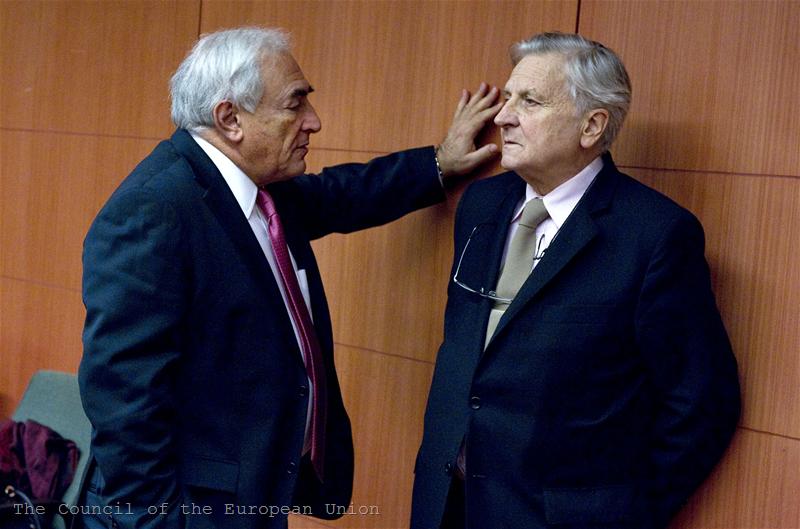 | © The Council of the European Union
| © The Council of the European UnionThe idea of eurobonds inflamed passions in the euro area
The idea of launching eurobonds has sparked fierce debates in Europe. Jean-Claude Juncker, Luxembourg's prime minister and Eurogroup chairman, and Giulio Tremonti, Italy's finance minister proposed a European Debt Agency to be established with a mandate to issue "E-bonds" equivalent to 40% of Eu ... | © www.merrionstreet.ie
| © www.merrionstreet.ieIreland: The miracle is over, let's get to work
Over the next four years Ireland has to adjust its budget by 15 billion euro - that's the gap between revenues and expenditure, which is forcing the country to keep raising external financing at increasing rates. An additional difficulty is financing the banks, severely affected by the financial ...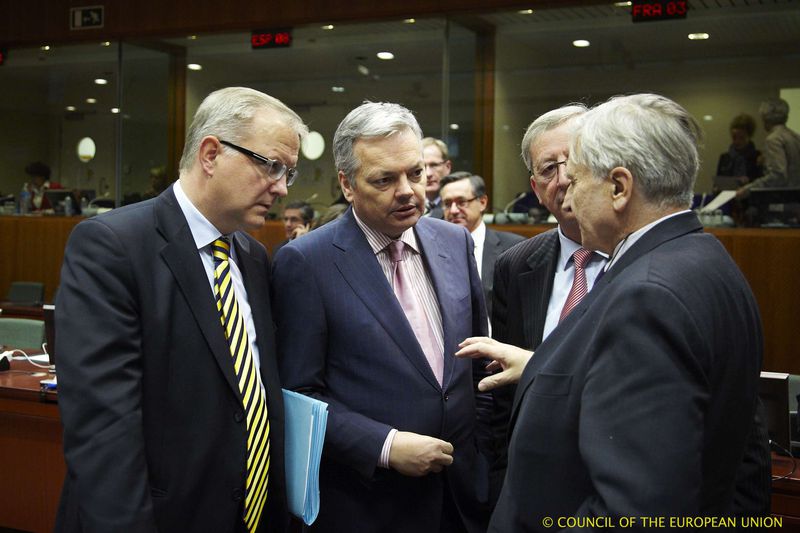 | © Council of the EU
| © Council of the EUEuro area has agreed on its European Stability Mechanism after 2013
Another working weekend for the European finance ministers, attempting to produce restful news for the markets on Sunday night. The outcome of their intensive work during the two days is solid: the programme for the Irish loan worth 85 billion euro had been approved together with the basic frame ...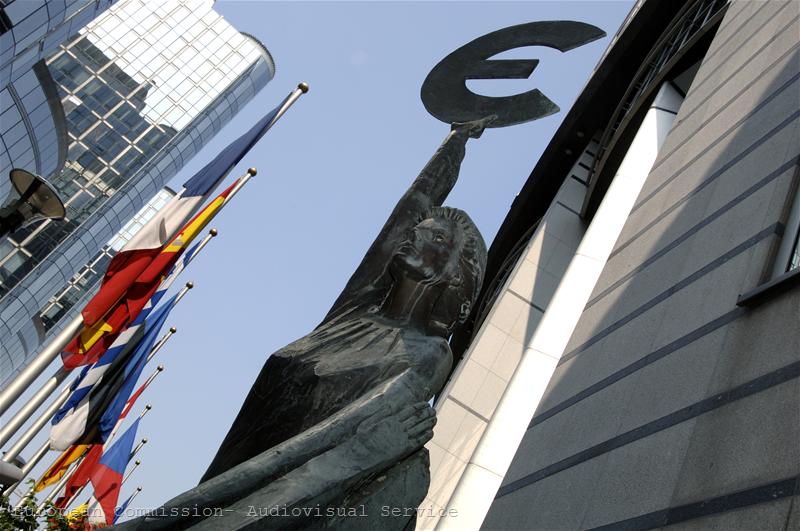 | © European Commission- Audiovisual Service
| © European Commission- Audiovisual ServiceIs it time to panic?
Hopes that the news about the Irish loan from the European rescue fund and the 4-year plan for fiscal consolidation, announced by Dublin, will calm the markets have proved false. Borrowing costs of Ireland, Portugal and Spain hit a new record, the Financial Times wrote. According to the newspape ...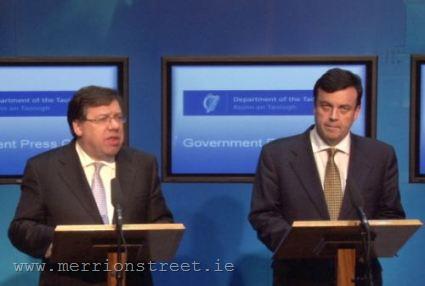 | © www.merrionstreet.ie
| © www.merrionstreet.ieIreland will after all receive financial assistance from the EU and the IMF
Late last night Ireland confirmed that it has made a formal request for financial assistance from the EU and the IMF, which has been approved instantly by euro area finance ministers. Although at this stage the exact amount of the funding is not clear, it will probably be around 80-90 billion eu ...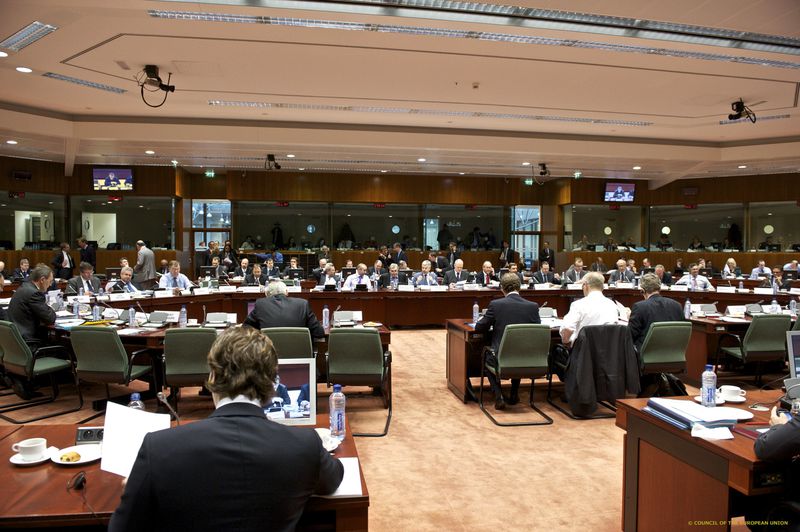 | © The Council of the European Union
| © The Council of the European UnionEU is preparing to save Ireland, Dublin is hesitating
A joint EU-IMF mission began "technical talks" with the Irish authorities to intensify the preparation of the programme, under which the country could receive financial aid from the euro area rescue fund (European Financial Stability Facility, EFSF). In fact, the preparation has intensified sinc ... | © VVD official webside
| © VVD official webside